The Empty Front Row
I'm Suzan, 32, and I'm staring at my reflection in the bridal suite of St. Mary's Church. The vintage lace wedding gown I've dreamed about since childhood hugs my figure perfectly, but the woman looking back at me has eyes that can't hide her heartbreak. My phone buzzes again—David, my soon-to-be husband, checking in. That's three missed calls from him, but none from my parents. Not a single message. They're not coming. The two most important chairs in the front row will remain empty because they chose my sister Tara's casual lunch instead. Yes, a lunch. Not a surgery, not a funeral—a lunch. I take a deep breath and smooth down the delicate fabric of my dress. The flowers are arranged beautifully, the guests are seated expectantly, and in fifteen minutes, I'm supposed to walk down that aisle. Alone. I've spent my whole life being second-best to Tara, but somehow, I never imagined they'd miss my wedding day. As I apply one final touch of lipstick, I make a decision that will change everything: today won't be about who isn't here—it will be about who is.
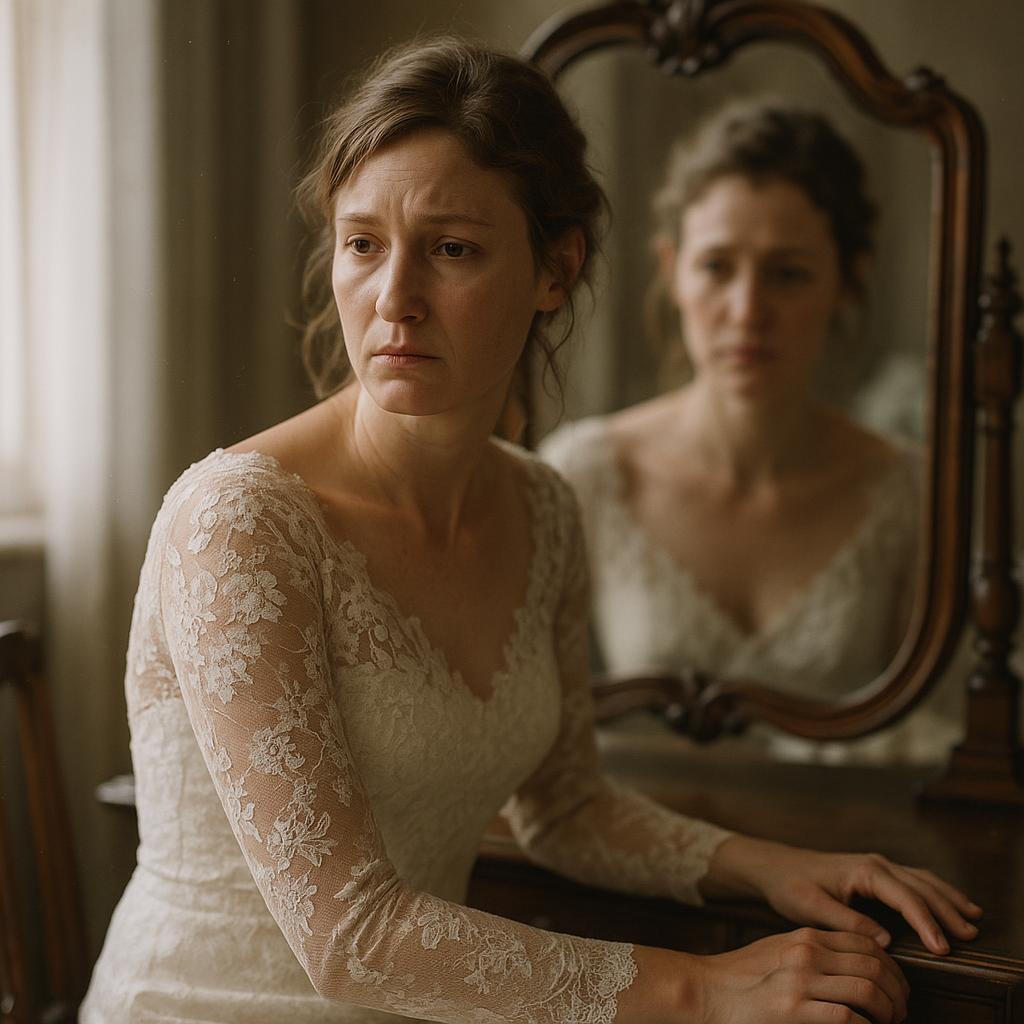 Image by RM AI
Image by RM AI
Walking Alone
The wedding march begins, and my heart pounds in my chest. This should be the proudest moment of my life, but instead of my father's arm guiding me, I'm clutching my bouquet with white knuckles, walking alone. The church feels impossibly long as I take my first steps. I can hear the whispers rippling through the pews—"Where are her parents?" "Poor thing." "I heard they went to her sister's lunch instead." Each sympathetic glance feels like a tiny knife. I focus on David waiting at the altar, his eyes locked on mine, full of love and something else—fierce protectiveness. His smile is my lighthouse in this storm of emotions. When I finally reach him, he whispers, "You're the strongest person I know," and for a moment, I believe him. As we exchange vows, I try to lose myself in the moment, in the promises we're making. But the empty front-row seats seem to scream at me, a physical reminder of where I stand in my family's priorities. I say "I do" with a voice that only cracks once, and when David kisses me, the applause from our guests almost—almost—drowns out the silence from those who should have cheered the loudest. What I didn't realize then was that sometimes the people who aren't there teach you more about family than those who are.
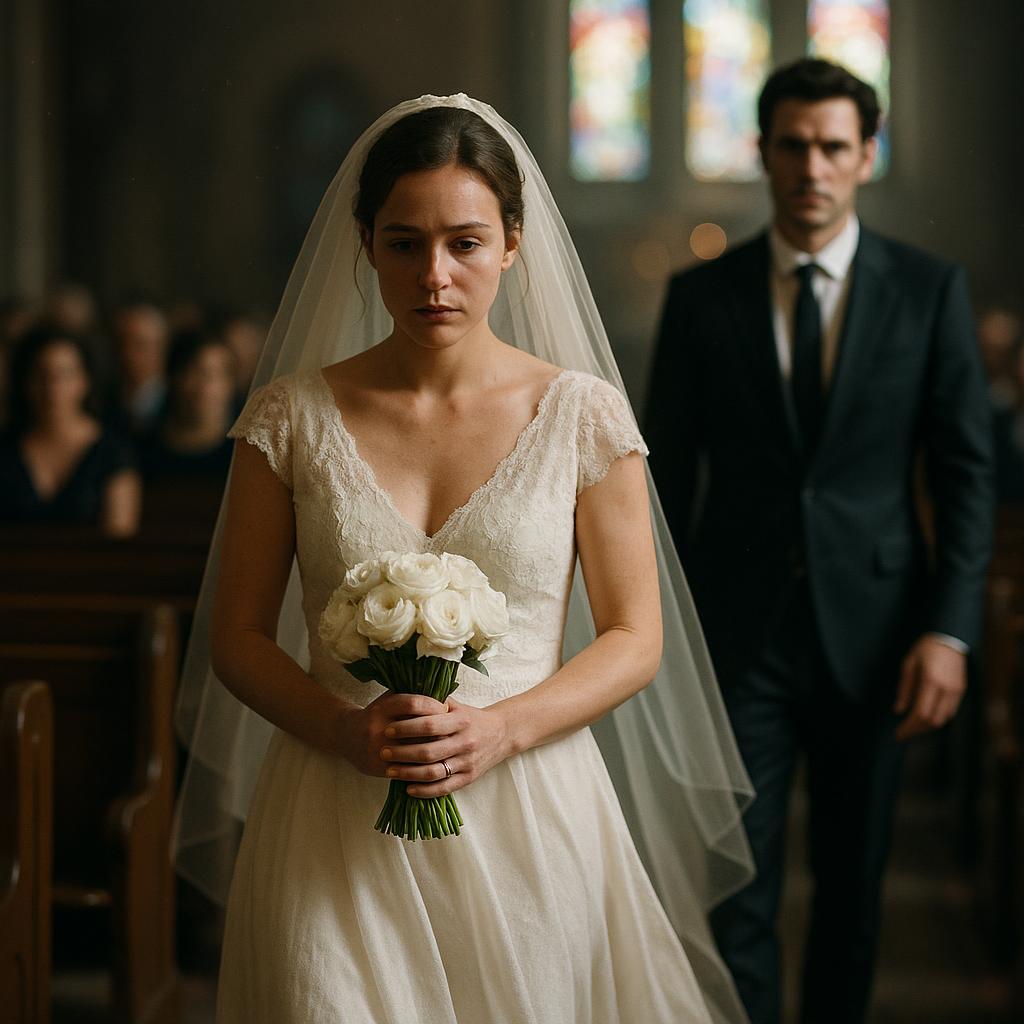 Image by RM AI
Image by RM AI
The Golden Child
The reception hall glitters with fairy lights and laughter, but I can't help noticing the stark contrast between David's family and my empty section. His parents hover around him, straightening his boutonniere and snapping endless photos with proud tears in their eyes. "That's my boy," his father keeps saying, clapping David on the shoulder. Meanwhile, I'm standing here remembering how my parents rescheduled my piano recital—the one I practiced six months for—because Tara had a last-minute dance showcase. Or how they threw her a surprise party when she won the fifth-grade spelling bee but barely acknowledged when I made the honor roll four years straight. As the DJ announces our first dance, David pulls me close, his hands steady on my waist. "You okay?" he whispers. I nod and paste on my best smile, the one I've perfected over years of standing in Tara's shadow. The one that says 'I'm fine' when I'm anything but. As we sway to our song, I catch a glimpse of the guest book with its empty spaces where my parents' signatures should be. What hurts most isn't just their absence today—it's the realization that I've spent my entire life trying to earn love that was never conditional for my sister.
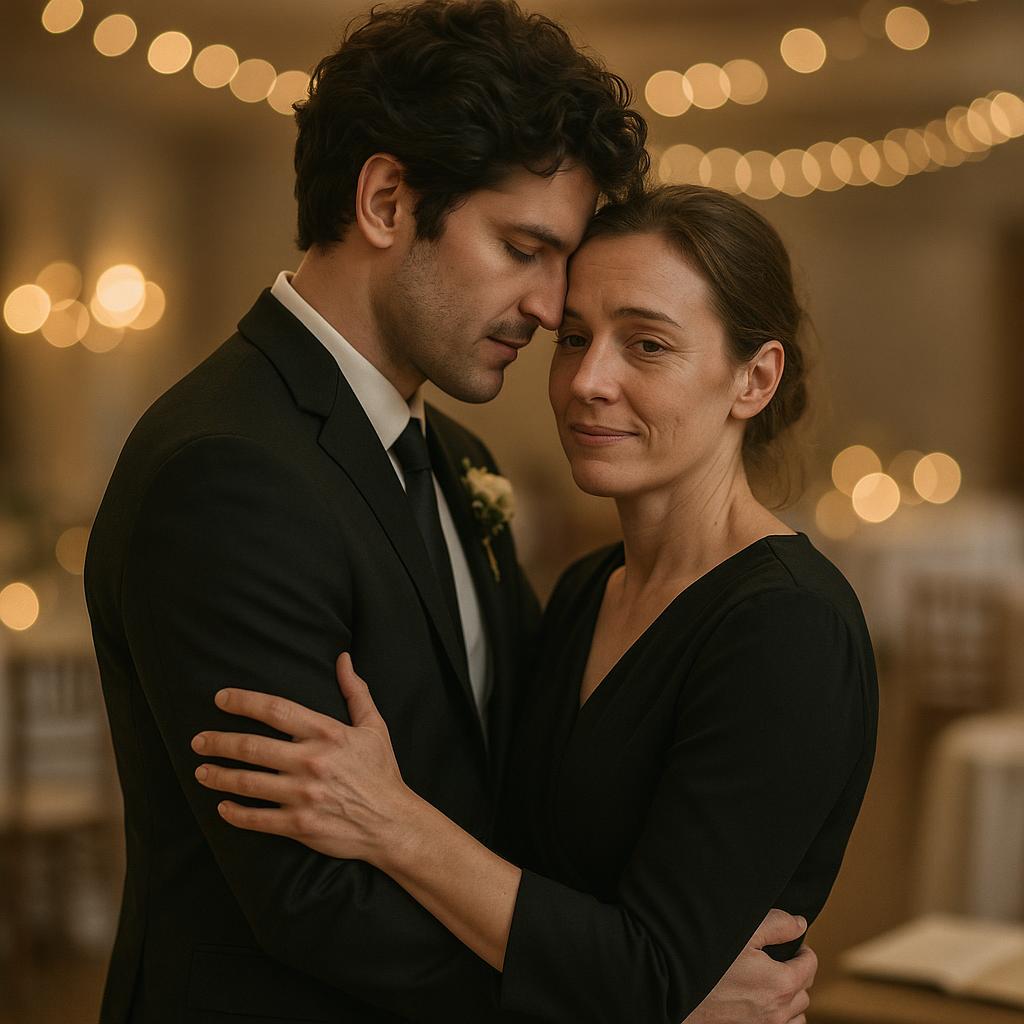 Image by RM AI
Image by RM AI
Two Empty Chairs
The reception hall buzzes with laughter and clinking glasses, but my eyes keep drifting to those two empty chairs at the family table. I'd spent hours on those place cards—'Mother of the Bride' and 'Father of the Bride'—written in my best calligraphy, the ink a soft gold that catches the light just so. Now they sit there like little monuments to my disappointment. David notices me staring again and gently takes my hand, pulling me toward the dance floor. "They don't know what they're missing," he whispers against my ear, his arms strong around my waist. His words are both balm and salt in the wound—because he's right, they're missing everything, and they don't even care. This isn't new, though, is it? When I was ten, they missed my solo in the school concert because Tara had a cold. When I graduated college with honors, they left early because Tara texted that she was having boy troubles. My whole life has been a series of empty chairs where my parents should have been, always rushing off to whatever crisis or triumph Tara was having. As I rest my head on David's shoulder, swaying to our song, I realize something that makes my heart both lighter and heavier: this pattern isn't going to change unless I do.
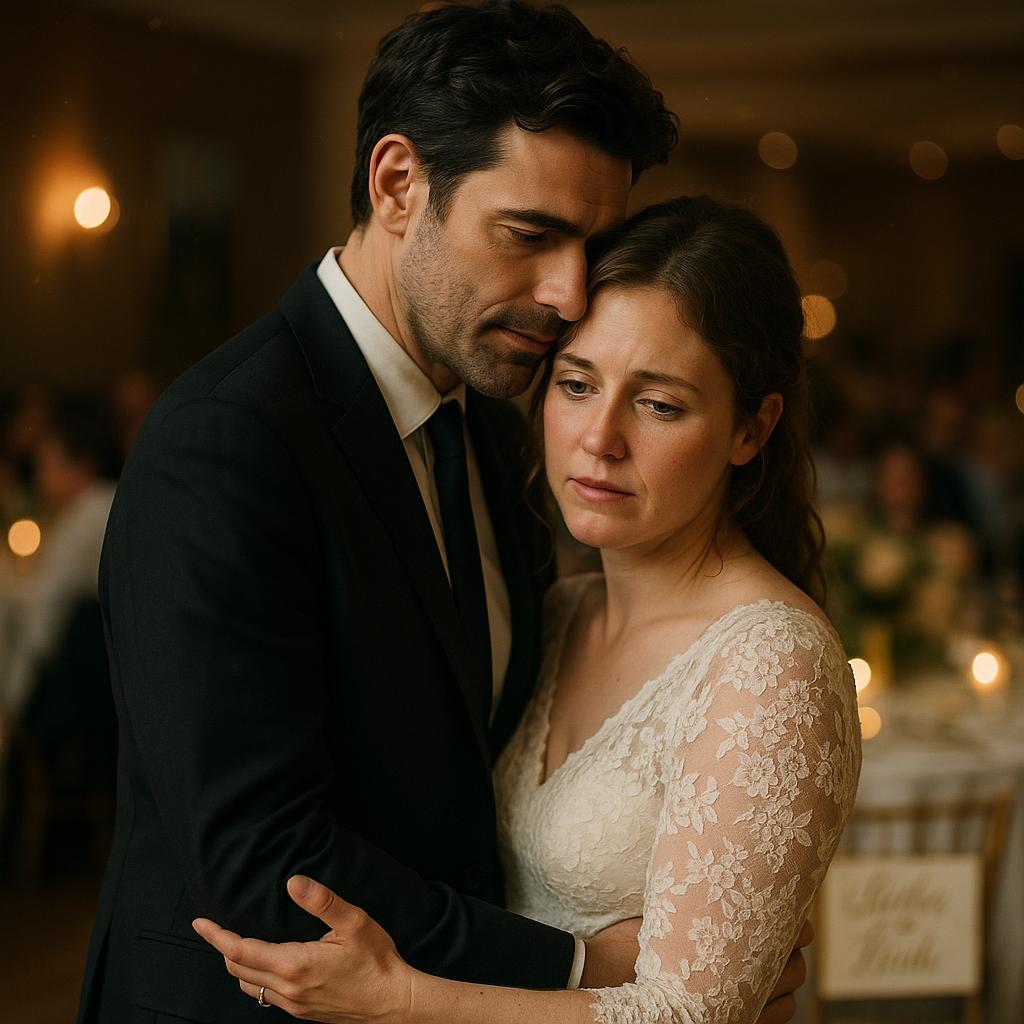 Image by RM AI
Image by RM AI
The Family That Chose Me
As the night deepens, I find myself surrounded by a different kind of family. Linsey, who flew in from Seattle despite her fear of flying, stands on wobbly legs to give her maid of honor toast. "I've known Suzan since we were awkward teenagers with questionable fashion choices," she begins, earning laughter from the crowd. "And I've watched her grow into this incredible woman who deserves every happiness." Her voice cracks as she continues, "Some people might not see how special you are, Suzan, but everyone in this room does." I catch her meaningful glance at those empty chairs, but instead of feeling that familiar ache, I look around at the faces beaming back at me. There's Robert, who helped me address invitations until 2 AM; Maria, who rearranged her entire work schedule to be here; and David's parents, who've treated me like a daughter from day one. As everyone raises their glasses, I realize with startling clarity that family isn't defined by DNA—it's defined by who shows up when it matters. These people traveled across countries, took time off work, and rearranged their lives to witness our love. They didn't just fill seats; they filled the holes in my heart that my blood relatives left behind. And as David squeezes my hand under the table, I wonder if maybe this is what family was supposed to feel like all along.
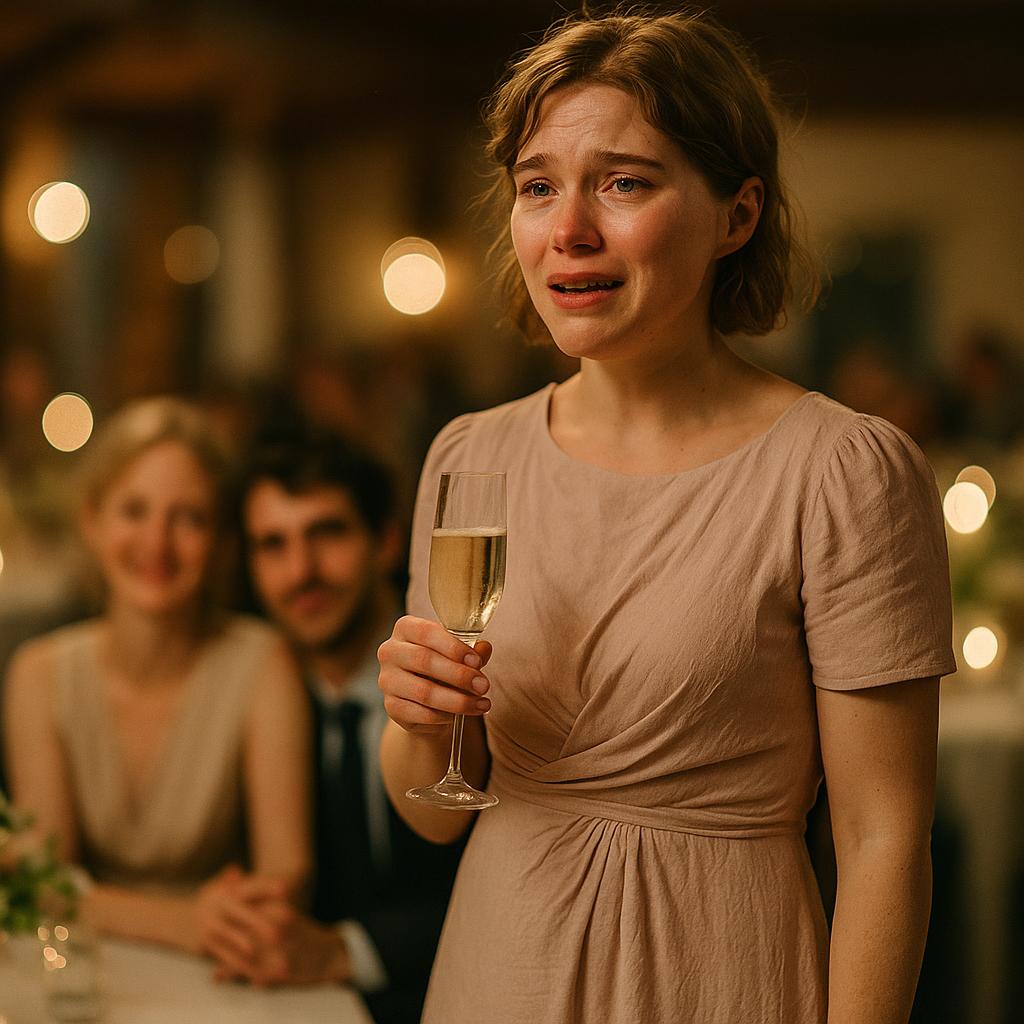 Image by RM AI
Image by RM AI
Childhood Echoes
That night in our honeymoon suite, with champagne untouched and wedding gifts still wrapped, I found myself crying instead of celebrating. David held me as years of hurt spilled out between us. "Remember my tenth birthday?" I whispered into his chest. "They forgot to pick me up from school. I waited for two hours in the rain because Tara had a sniffle." David's arms tightened around me as I continued. "At my high school graduation, they stayed just long enough to see me get my diploma before rushing off to Tara's softball game. She wasn't even playing—she was on the bench!" Each memory tumbled out like stones I'd been carrying for years: the science fair where I won first place but no one came to see, the college acceptance letter that got a quick 'that's nice' while Tara's C+ in math earned a celebration dinner. David wiped my tears with his thumb, his eyes never leaving mine. "I've spent my whole life being the responsible one, the quiet one, the one who doesn't make waves," I said. "And what did it get me? Empty chairs at my wedding." What I didn't realize then was that this wedding night confession would be the first step toward something I never expected—healing.
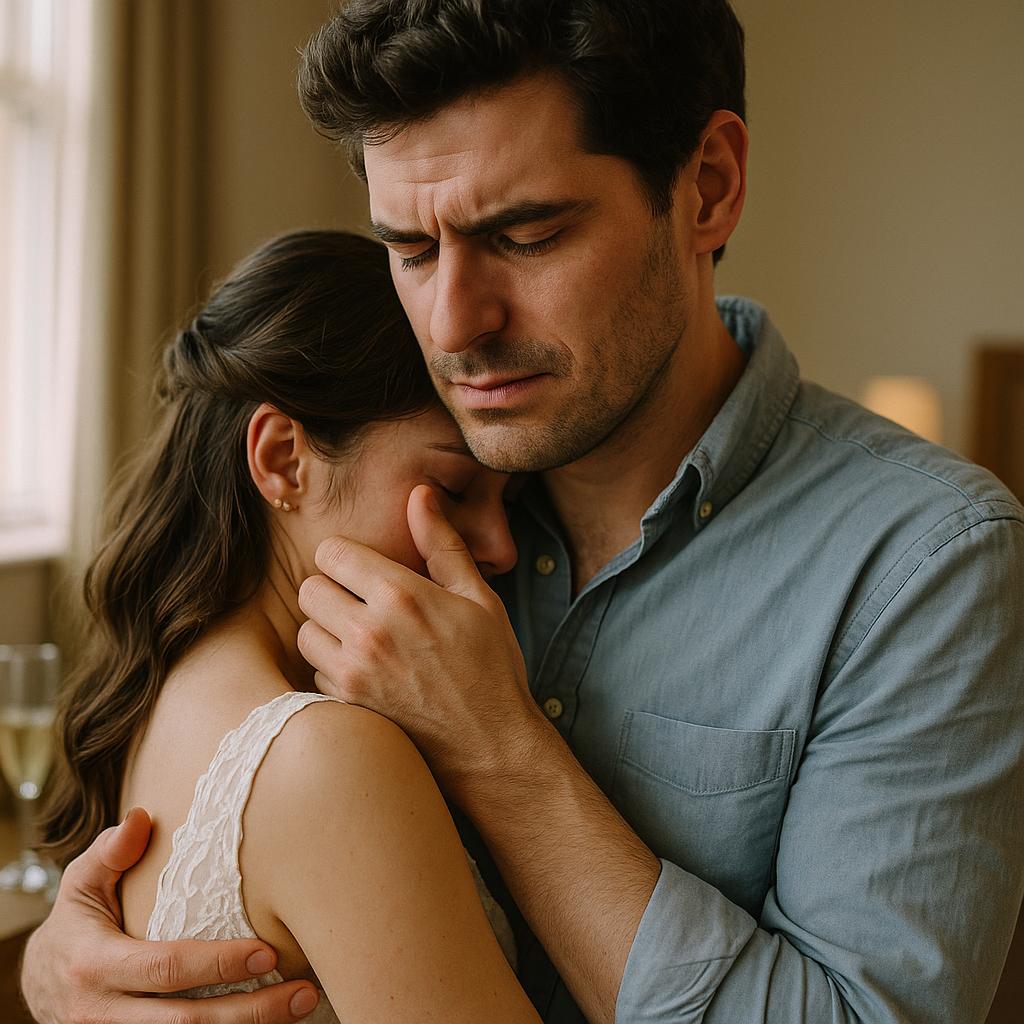 Image by RM AI
Image by RM AI
Cookies and Sunshine
The morning after my wedding, I was still in bed staring at the ceiling when the doorbell rang. I opened the door to find Linsey standing there with a Tupperware container of chocolate chip cookies and a smile that could outshine the sun. "Cookies and sunshine," she announced, pushing past me. "The two best cures for parental disappointment." Her laughter filled the apartment as she settled on our couch, legs crossed, already launching into stories about Uncle Pete's embarrassing dance moves at the reception. "Did you see him trying to do the worm? I thought we'd need medical assistance!" I couldn't help but smile despite myself. When Robert arrived an hour later, champagne bottles clinking in his arms, he declared, "The party continues!" and proceeded to tell the worst jokes I'd ever heard. "What do you call a fake noodle? An impasta!" For a few blissful hours, their presence pushed away the hollow feeling in my chest. They were talking about everything except the two empty chairs that had dominated my thoughts. As the afternoon light softened, Linsey's expression turned serious. She reached for my hand and squeezed it gently. "You know, Suzan," she said, her voice unusually quiet, "at some point, you're going to have to talk to them." The weight of her words hung in the air, and I knew she was right—but I wasn't ready to admit it yet.
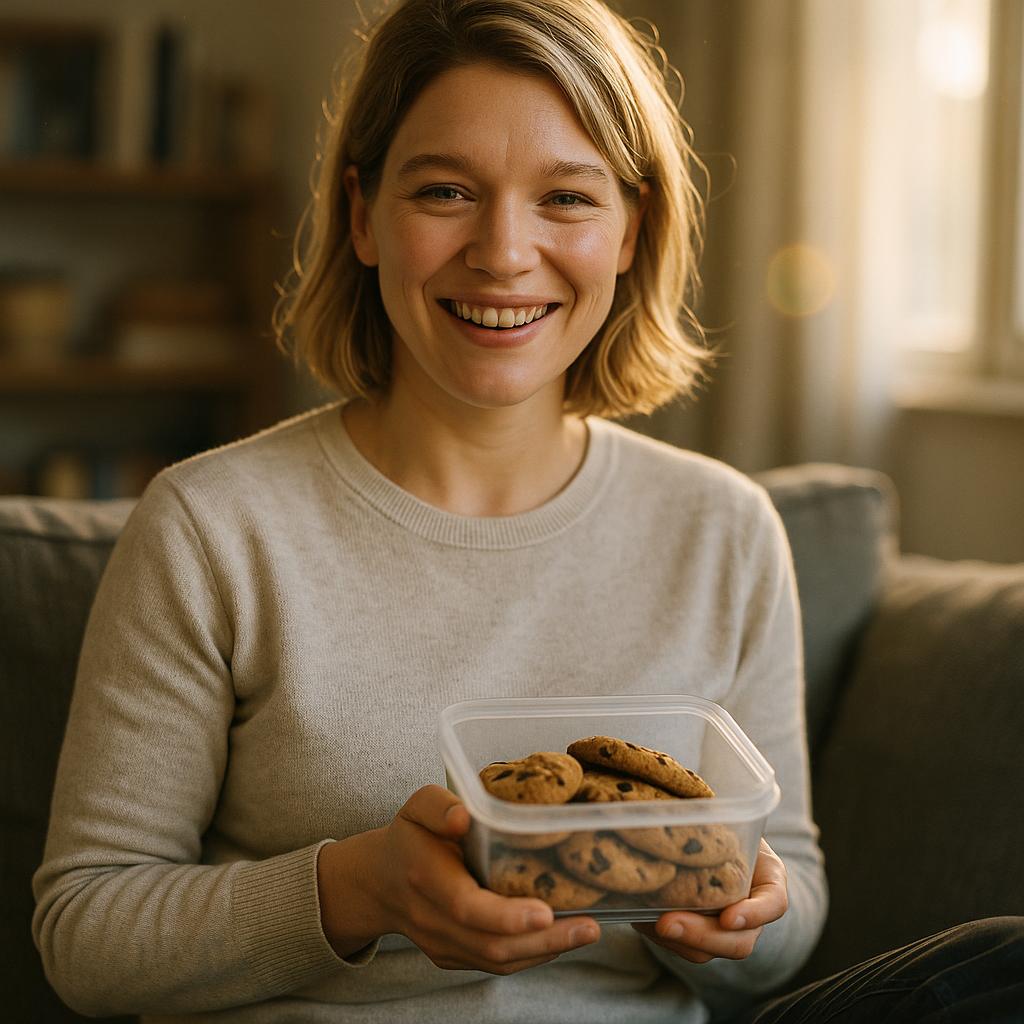 Image by RM AI
Image by RM AI
The Suggestion
As the laughter died down, Linsey's face shifted from joy to something more serious. She set her coffee mug down with purpose and looked me straight in the eyes. "Suzan, you need closure," she said, her voice gentle but firm. "It's time to talk to them." I felt my stomach tighten at the suggestion. The thought of facing my parents after they'd chosen my sister's lunch over my wedding made me physically ill. "What's the point?" I asked, picking at a loose thread on the couch cushion. "They've made their choice pretty clear." Linsey reached for my hand, her grip warm and steady. "The point is for YOU, not them. You've spent your whole life being invisible in that family. Maybe it's time they actually see you—even if it's the last time you speak to them." Robert nodded in agreement from across the room. "A family dinner," Linsey continued. "Neutral ground. Say what you need to say." I wanted to dismiss the idea immediately, to protect myself from another inevitable disappointment. But something in her steady gaze made me pause. Maybe it was time to stop hiding in Tara's shadow. Maybe it was time to be seen, even if just to say goodbye. What I didn't know then was that this dinner would change everything—and not in the way any of us expected.
The Phone Call
Three days after my wedding, I sat on the edge of our bed, phone in hand, rehearsing what to say. My thumb hovered over my mother's contact for twenty minutes before I finally pressed 'call.' Each ring felt like an eternity—one, two, three, four, five—until her voice came through, surprised, as if she hadn't expected to hear from me. Ever. "Suzan?" The way she said my name, like a question, made my stomach clench. I gripped the phone tighter as she launched into excuses about Tara's "emergency lunch" that apparently couldn't be rescheduled. Something about a job interview that suddenly came up. The words sounded hollow, rehearsed, and I could hear the guilt beneath her practiced explanation. I bit my tongue to keep from asking why a lunch trumped her daughter's wedding. Instead, I took a deep breath and said, "I'd like to have you all over for dinner next week. David and I want to show you the wedding photos." The lie slipped out easily. This wasn't about photos—this was about finally being seen. When she agreed too quickly, relief evident in her voice at this apparent olive branch, I realized she had no idea what was coming. As I hung up, David appeared in the doorway, concern etched on his face. "You sure about this?" he asked. I nodded, my resolve hardening. "It's time they hear what I have to say—even if it's the last thing I ever say to them."
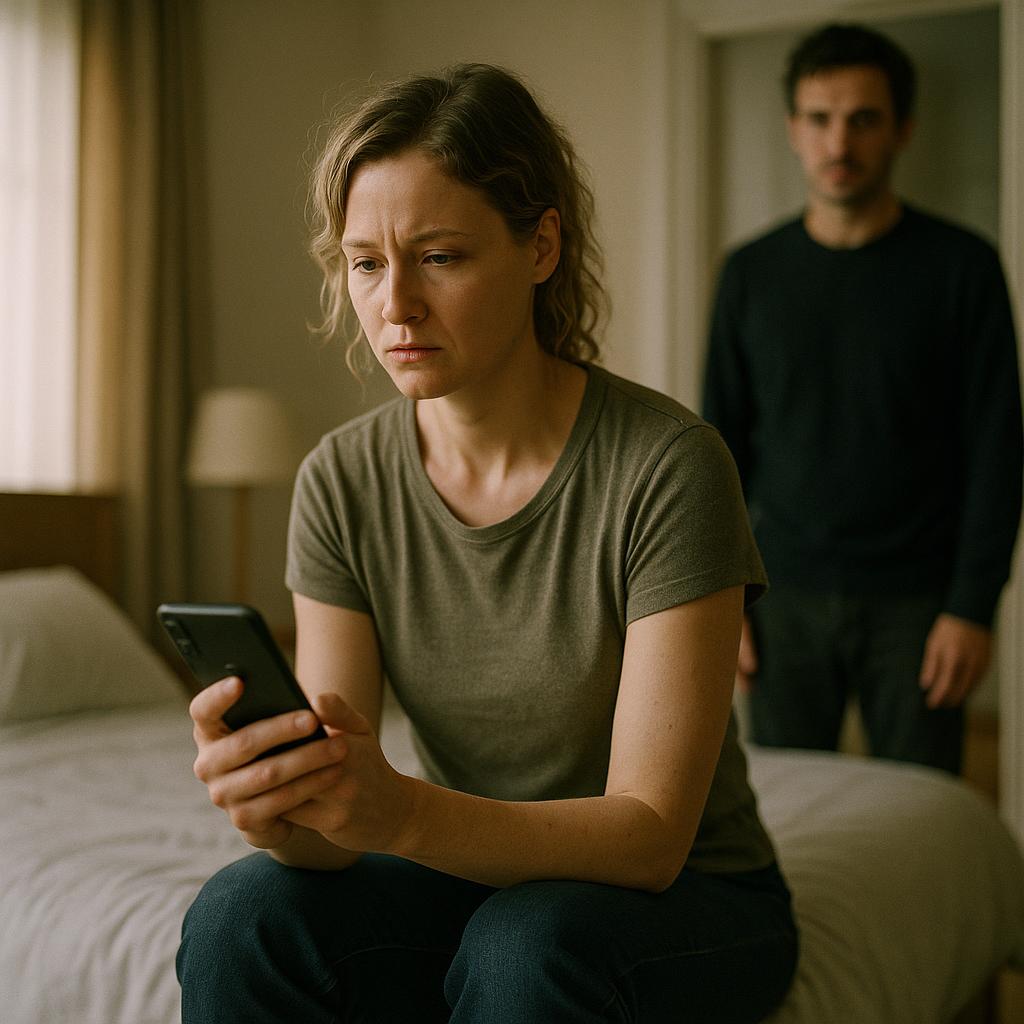 Image by RM AI
Image by RM AI
Preparing the Table
I spent the entire morning in a cleaning frenzy, scrubbing our apartment until my fingers were raw. By noon, I was elbow-deep in food prep, chopping onions with military precision while tears streamed down my face—though I couldn't tell if they were from the onions or the anxiety churning in my stomach. My grandmother's recipes spread across the counter like battle plans: pot roast (Mom's favorite), scalloped potatoes (Dad's go-to), and the apple pie Grandma taught me to make before cancer took her. "You're stress-cooking," David observed quietly, watching me measure cinnamon with scientific accuracy. I ignored him, focusing instead on crimping the pie crust edges just so. When it came time to set the table, my hands betrayed me, trembling as I placed each fork, each knife, each perfectly folded napkin. I'd created name cards—actual name cards—for a family dinner of five people, as if these little paper tents could somehow protect me from what was coming. "They're just dinner plates, Suzan, not shields," David said gently as I rearranged the settings for the third time. But that's exactly what they were: armor against the battle I'd been preparing for my entire life. As I lit the candles, watching the flames dance in the early evening light, I realized I wasn't just setting a table—I was setting a stage.
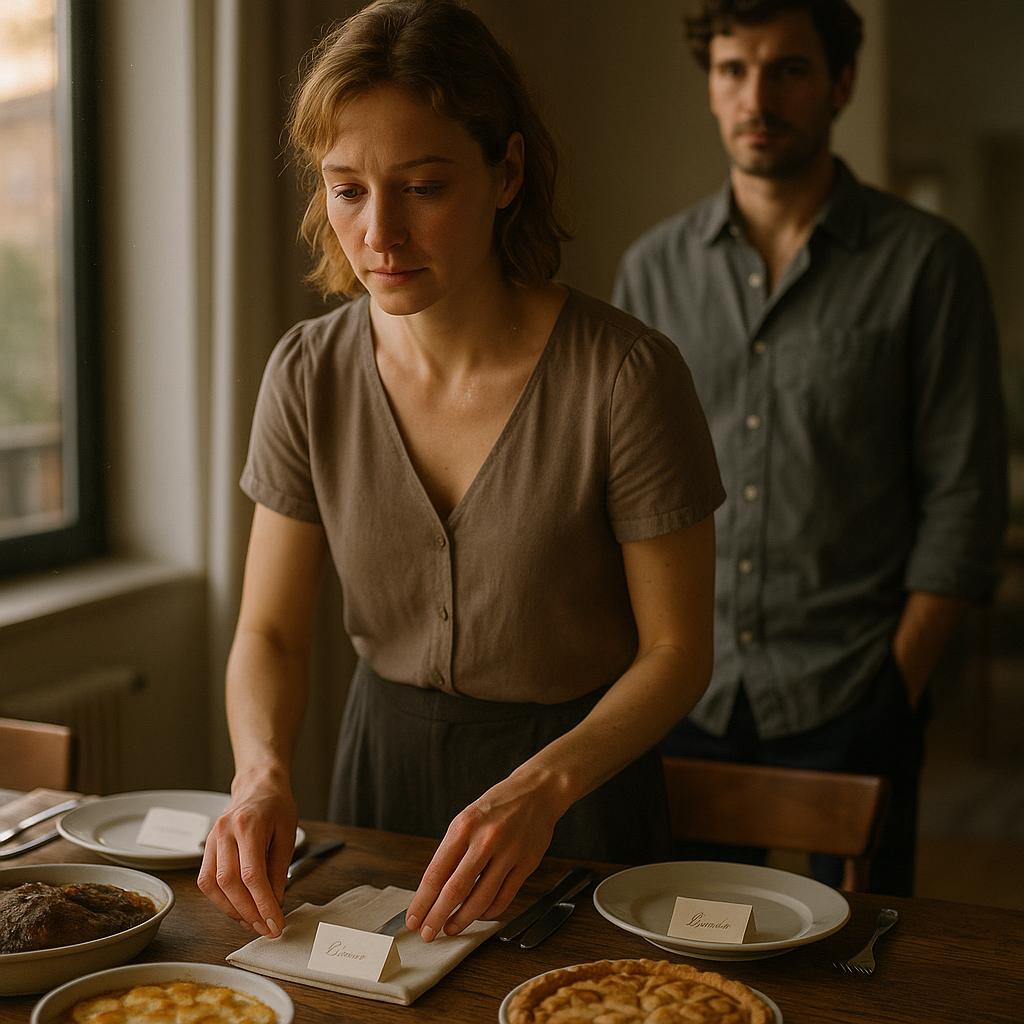 Image by RM AI
Image by RM AI
The Arrival
The doorbell chimes at exactly 6:30 PM. I smooth my dress and take a deep breath before opening the door to find my parents standing there, looking like strangers at a business meeting rather than family. Dad offers an awkward side-hug that barely makes contact while Mom's air kiss lands somewhere near my cheek, the scent of her expensive perfume lingering between us like all the words we're not saying. "We brought wine," Mom announces, handing over a bottle that probably cost more than our wedding cake. No card. No gift. Definitely no apology for missing the most important day of my life. They settle into our living room with the practiced ease of people who've mastered the art of avoiding uncomfortable topics. "The neighborhood has really improved," Dad comments, studying our apartment as if it's a real estate investment. Mom nods, launching into a detailed weather forecast for the week ahead. David squeezes my hand under the table as we navigate this minefield of small talk. Just as I'm about to steer the conversation toward the elephant in the room, the front door flies open without so much as a knock. "Sorry I'm late!" Tara's voice fills the apartment before she does, and just like that, my parents' faces light up like Christmas trees. The transformation is so immediate, so complete, it's like someone flipped a switch, and suddenly, I'm invisible again.
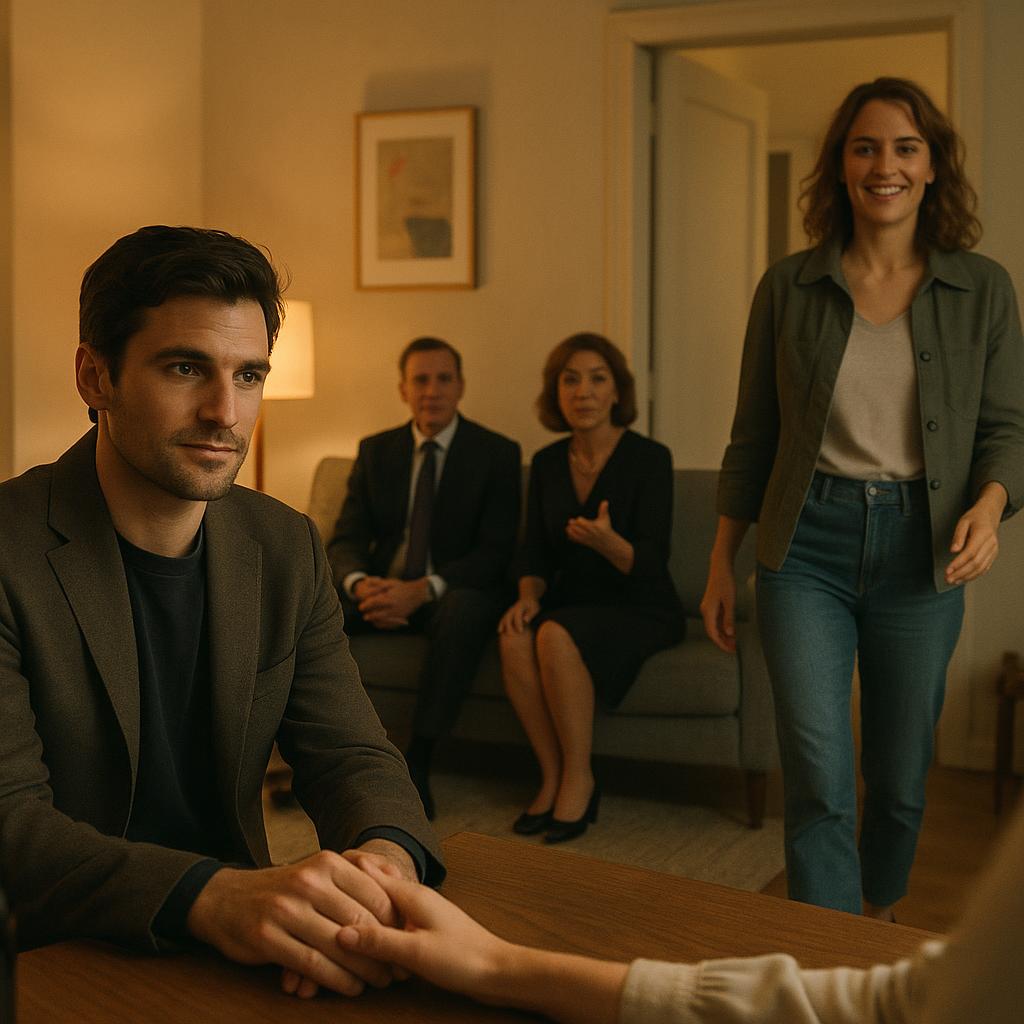 Image by RM AI
Image by RM AI
The Spotlight Stealer
Dinner is served, and Tara immediately takes center stage. "So, about that lunch," she begins, leaning forward as if sharing state secrets. "Professor Wilkins—you know, the one with connections to that publishing house—he practically begged me to meet him." My parents hang on her every word, nodding enthusiastically as she describes what was apparently more important than my wedding. "He thinks my blog could become a book!" The way my parents beam at her makes my stomach turn. Between bites of the pot roast I spent hours perfecting, Tara sprinkles in little digs about me. "Remember when Suzan wanted to be an astronaut? God, she used to wear that helmet everywhere." She laughs, and my parents join in like it's the funniest thing they've ever heard. "You were always so serious about everything," she continues, reaching for more potatoes. "Still are. It's just a wedding, sis. Don't be so sensitive." I grip my fork so tightly my knuckles turn white, watching my parents nod along to her dismissal of the most important day of my life. They're completely captivated by her one-woman show, and I'm just part of the audience. As I sit there, invisible in my own home, something inside me begins to shift from hurt to anger. I've spent my entire life accepting this treatment, but watching them now, I realize I don't have to anymore.
The White Knuckles
I grip my fork so tightly my knuckles turn white, the metal digging into my palm as Tara launches into yet another story about her 'exciting' life. "So this gallery in SoHo—you know, the one with that famous photographer last month?—they actually reached out about featuring my work!" she gushes, waving her hands dramatically. My parents lean forward, completely entranced. "That's incredible, honey!" Mom exclaims, while Dad nods vigorously. The irony isn't lost on me—when I wanted to take photography classes in high school, they called it a 'waste of time' and pushed me toward accounting instead. "Practical skills," they'd said. Under the table, David's hand finds mine, his thumb tracing reassuring circles on my palm. That small gesture of support nearly breaks me. I've rehearsed what I want to say a dozen times, but now, watching them fawn over Tara's latest hobby-turned-potential-career, the carefully prepared speech in my head threatens to dissolve into angry tears. I take a deep breath, counting silently to ten as David squeezes my hand. The room feels suddenly too small, too hot, too suffocating with decades of unspoken resentment. Something has to give—and I realize with startling clarity that it's not going to be me. Not anymore.
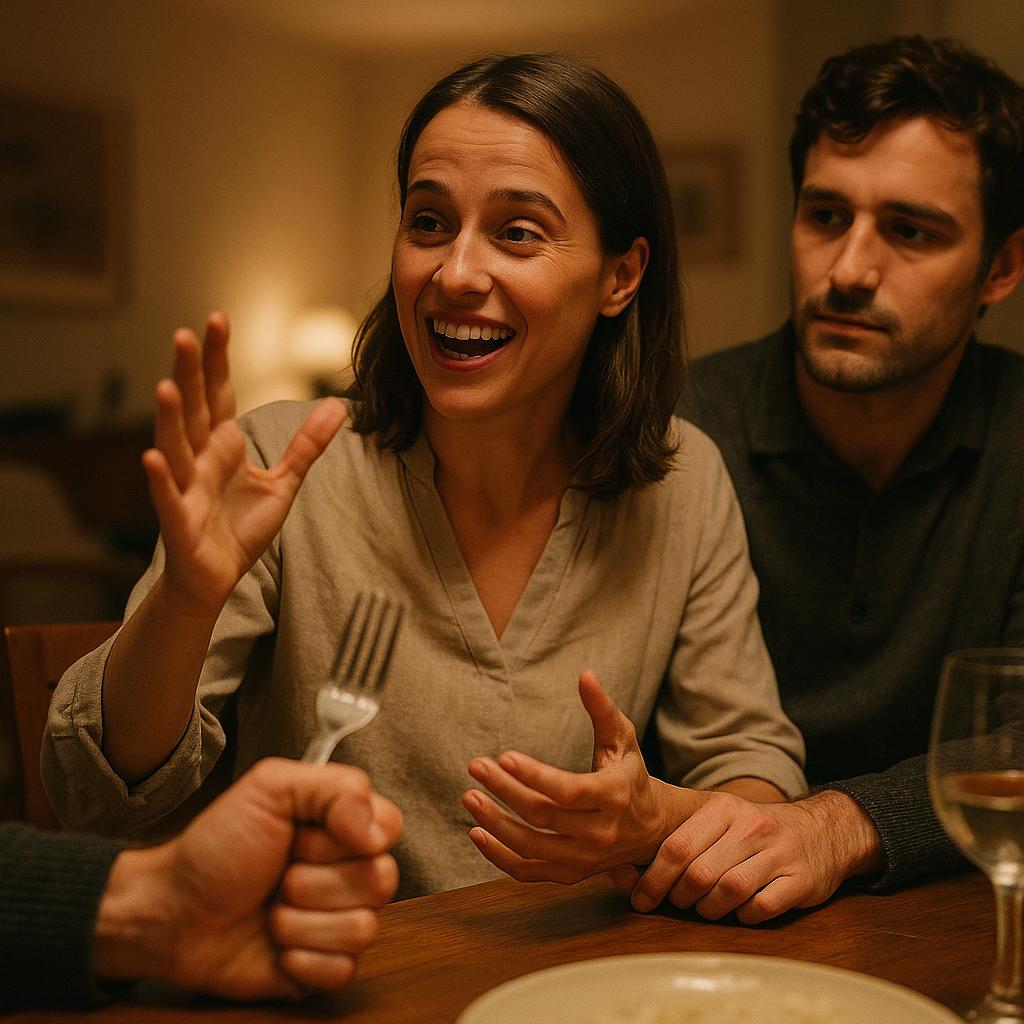 Image by RM AI
Image by RM AI
Breaking the Silence
Finally, I set my fork down with a soft clink that somehow silences the room. The sound cuts through Tara's monologue like a knife, and suddenly all eyes are on me. I can feel David's supportive presence beside me as I take a deep breath. 'You know, I always admired how easily you take the spotlight, Tara,' I say, my voice steadier than I feel. 'But I think it's time I said something.' The startled looks on my parents' faces are almost comical—they look like they've forgotten I could speak at all. Mom's mouth opens slightly, her wine glass frozen halfway to her lips. Dad shifts uncomfortably in his chair, his eyes darting between Tara and me as if trying to compute this disruption to their normal family dynamic. Tara's expression morphs from confusion to annoyance, clearly irritated that someone has changed the channel from The Tara Show. 'You've made me feel invisible my whole life,' I continue, my voice gaining strength with each word. 'Even on my wedding day, you couldn't be bothered to show up. You went to a lunch.' The words hang in the air like smoke, impossible to wave away. Twenty-eight years of silence are breaking, and I can feel something inside me breaking free along with it.
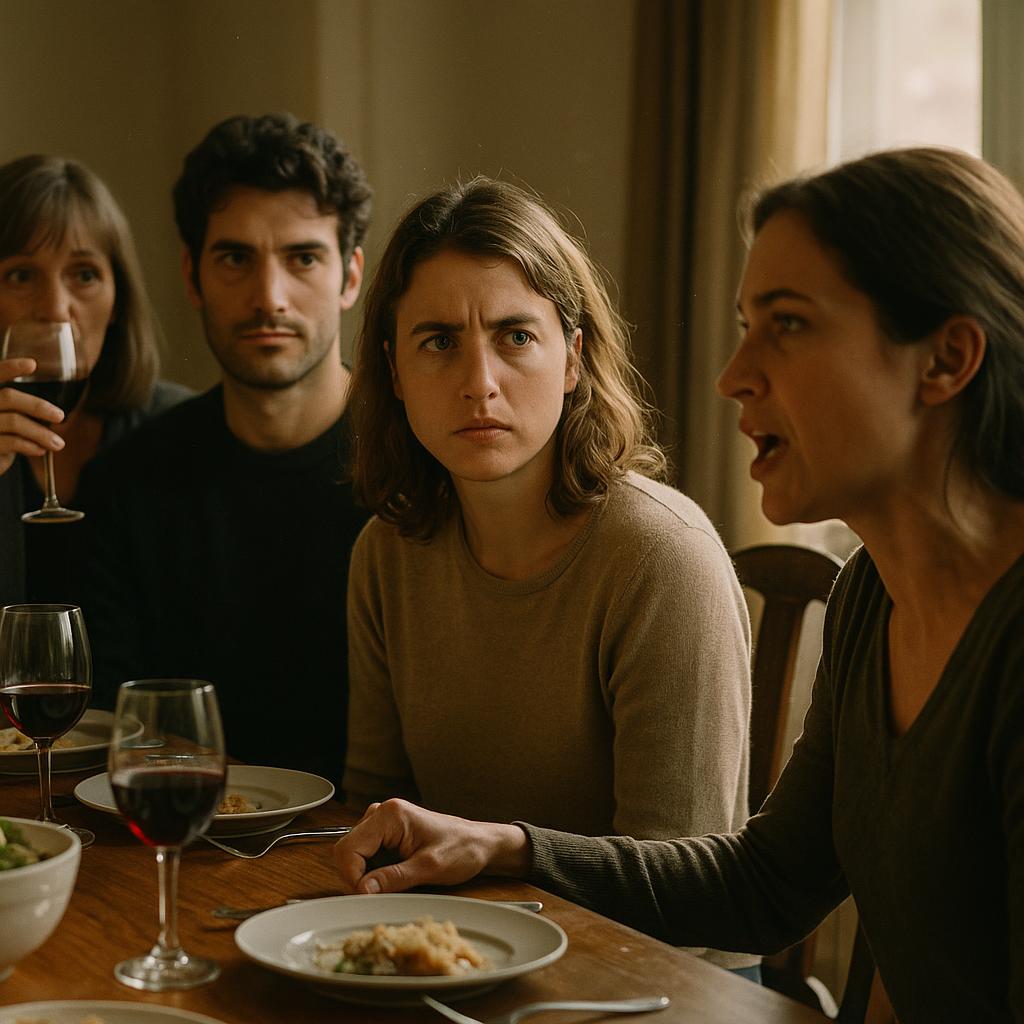 Image by RM AI
Image by RM AI
The Truth Unleashed
The words I'd been holding back for twenty-eight years came rushing out like a tsunami. 'You've made me feel invisible my whole life,' I continued, my voice trembling but not breaking. 'I was the good daughter who never caused trouble, who helped with everything, who tried so hard to be seen—and what did I get? Empty chairs at my wedding.' My mother's face paled as she opened her mouth, ready with the same tired excuses she'd been serving me my entire life. 'No,' I said firmly, holding up my hand. 'I'm not finished.' For once, she actually stopped talking. Even Tara looked stunned. 'I spent years trying to earn your love, but I'm done trying. I didn't invite you here to argue or to hear more excuses about why Tara's lunch was more important than watching your daughter get married. I just wanted you to hear me say it—this is the last time you get to make me feel small.' Dad stared at his plate, unable to meet my eyes, while Mom's lips pressed into a thin line. The silence that followed was deafening, but for the first time in my life, I wasn't scrambling to fill it with apologies or understanding. What happened next would change our family dynamic forever.
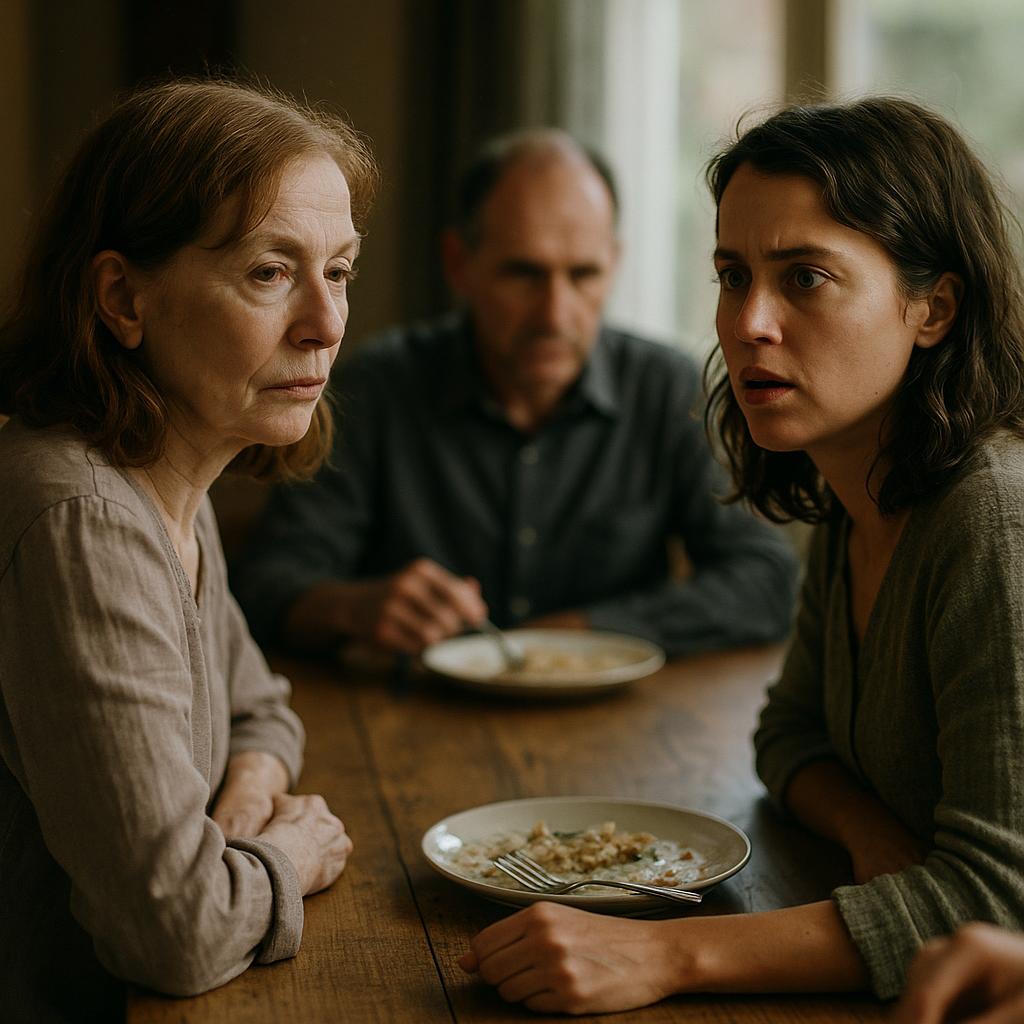 Image by RM AI
Image by RM AI
Walking Away
I stood up from the table, my chair scraping against the hardwood floor like a final punctuation mark to my speech. The silence in the room was so thick you could cut it with a knife. Without a word, I leaned over and kissed David on the cheek, his eyes reflecting a mixture of pride and concern. Then I simply walked out of the dining room, my steps lighter with each foot forward. In the hallway, I paused, really seeing for the first time the family photos that lined the wall—dozens of frames showcasing Tara's achievements: her softball trophies, her high school graduation, her college acceptance. And there, tucked between Tara's prom photos and her first art show, were the few that included me, always standing slightly off-center, always half-smiling. Behind me, I heard chairs scraping against the floor and my mother's voice calling my name, her tone a mixture of shock and something that might have been regret. But I didn't turn around. I kept walking toward the front door, my hand on the knob, feeling a weight lifting from my shoulders that I hadn't even realized I'd been carrying all these years. As I stepped outside into the cool evening air, I realized that sometimes walking away isn't giving up—it's the first step toward finding yourself.
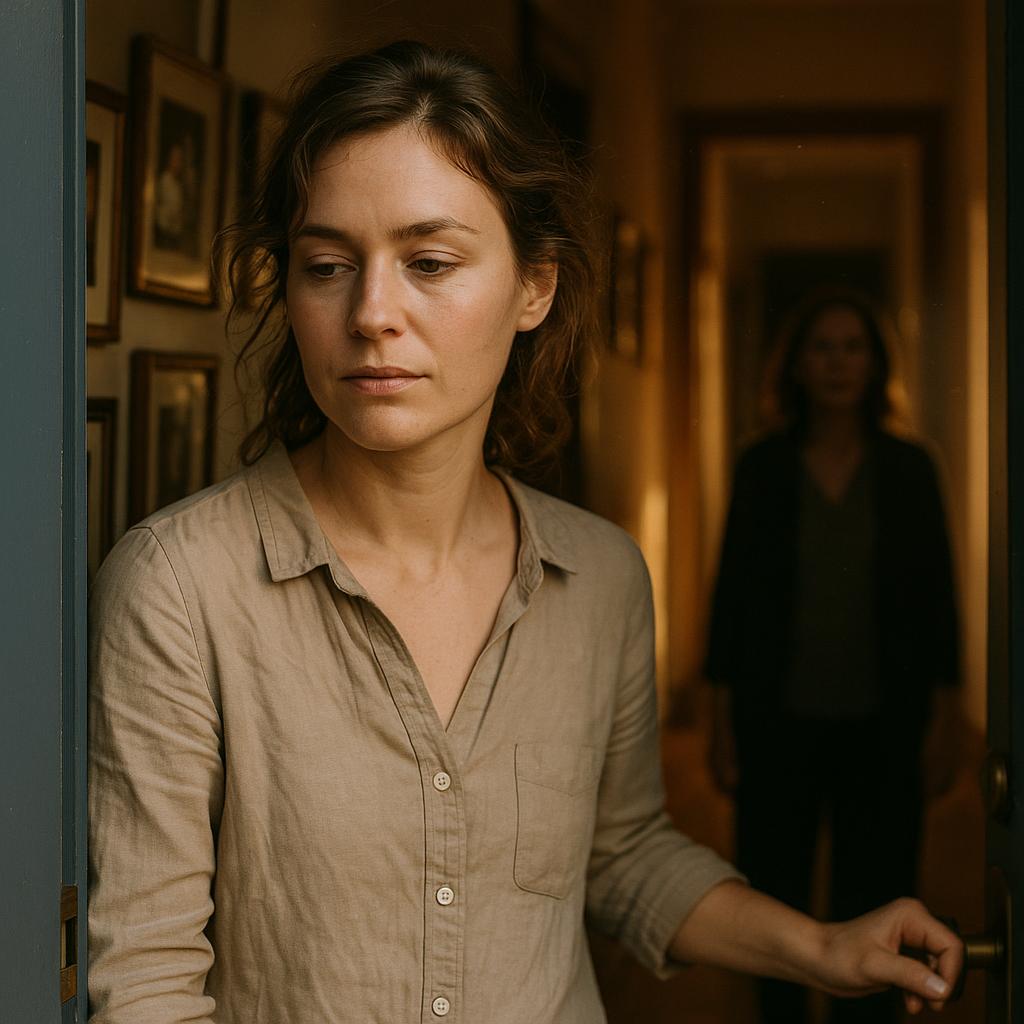 Image by RM AI
Image by RM AI
The Night Air
The night air hits my face like a welcome slap of reality as I step outside. I take a deep breath, filling my lungs with the cool evening breeze, feeling lighter with each step down the street where I grew up. There's the oak tree I used to climb whenever Mom and Dad were fighting about Tara's latest achievement. I'd sit in those branches for hours, invisible but seeing everything. I pause at the corner where I waited for countless school buses, sometimes watching them come and go while I stood there, hoping my parents would remember it was their turn for drop-off. They rarely did. I hear footsteps behind me and know it's David without turning around. He doesn't say anything—just takes my hand in his, his thumb tracing circles on my palm like he did under the dinner table. We walk without destination, two shadows merging under streetlights. His silence says everything: I choose you. I will always choose you. The realization washes over me that while I spent years trying to be chosen by people who couldn't see me, I'd somehow found someone who never looked away. "You know what's funny?" I finally say, my voice steady in the darkness. "I've been running after their approval my whole life, and now that I've stopped, I can finally breathe." What I didn't know then was that my phone was already lighting up with messages that would change everything.
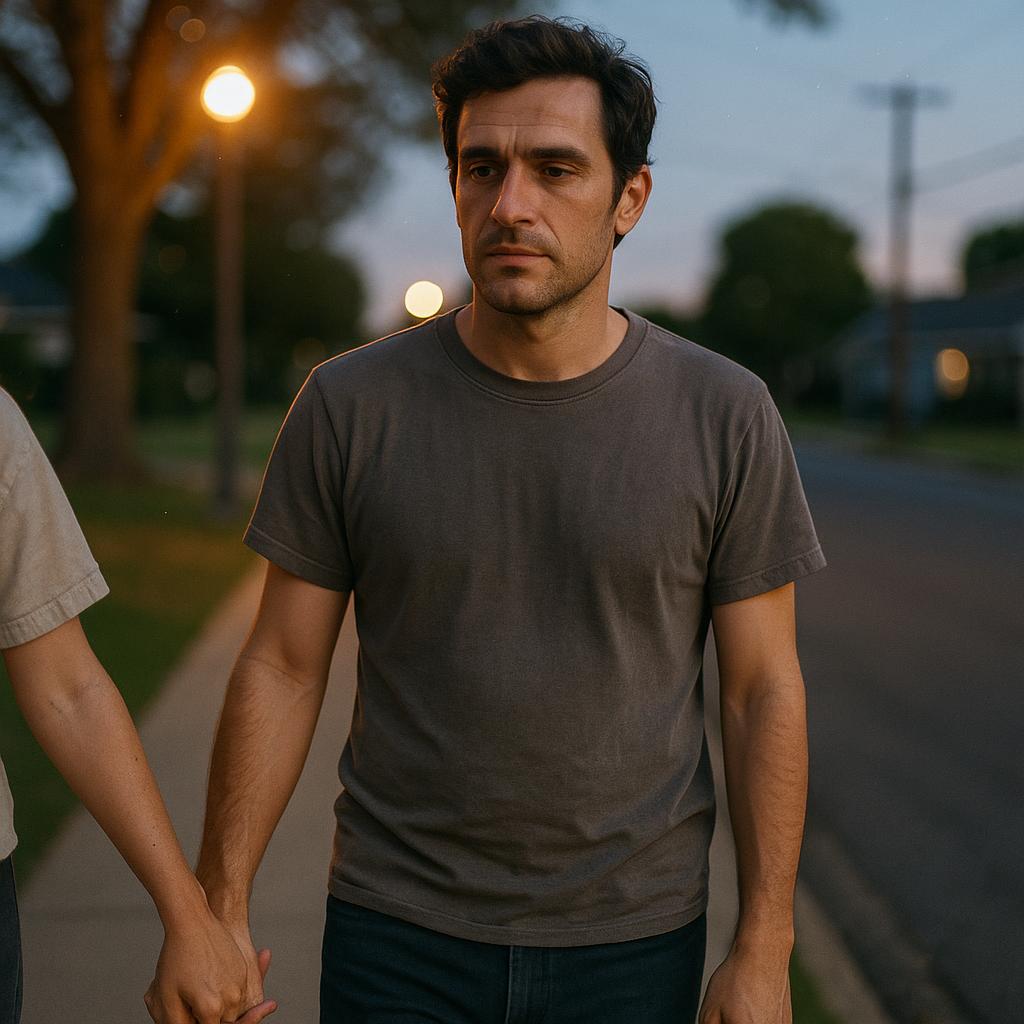 Image by RM AI
Image by RM AI
The Aftermath
Back at our apartment, my phone lit up like a Christmas tree. Tara's texts rolled in one after another, each more dramatic than the last. 'Way to ruin dinner for attention,' she wrote, followed by, 'Mom is crying because of YOU.' I silenced the notifications without reading my mother's voicemails. What could she possibly say now that would matter? David moved quietly around the kitchen, making chamomile tea—my comfort drink since college. He placed a steaming mug in my hands and sat beside me on our tiny balcony, his shoulder pressed against mine. The tears came then, streaming down my face not from sadness but from something that felt strangely like freedom. 'I feel like I've been holding my breath for twenty-eight years,' I whispered, watching the steam rise from my cup. David wrapped an arm around me, pulling me closer. 'Then breathe, Suzan. Just breathe.' And I did. For the first time in my life, I wasn't calculating how to make myself smaller, more agreeable, less in the way. I had finally spoken my truth, and the world hadn't ended. As the night deepened around us, my phone buzzed again—but this time, the name that flashed across the screen made my heart stop.
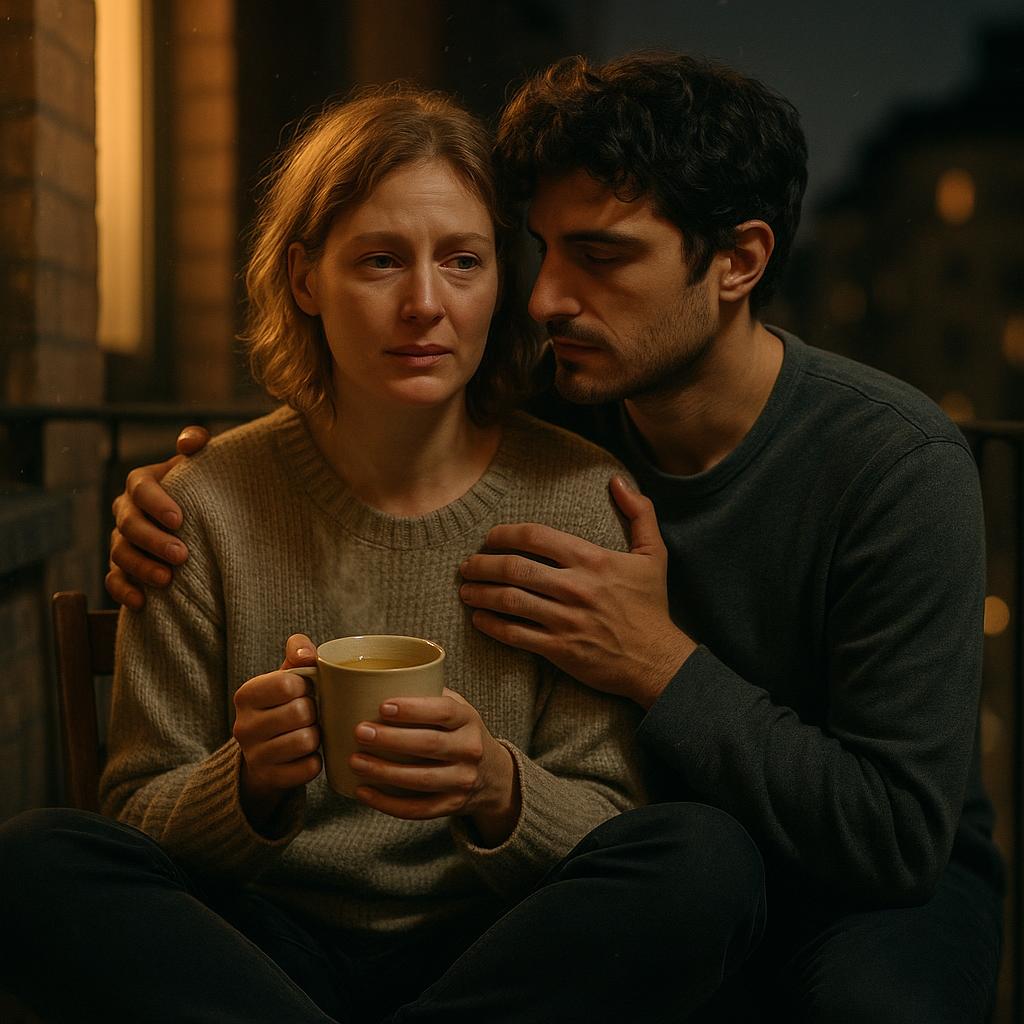 Image by RM AI
Image by RM AI
The Shift
In the days following my dinner table declaration, something inside me shifted. I stopped checking my phone every five minutes for messages from my parents. I deleted the drafts of texts explaining why I deserved their love—texts I'd been composing in my head since childhood. Instead, David and I focused on unpacking wedding gifts, laughing at the three identical toaster ovens we somehow received. I wrote thank-you notes to friends who actually showed up, my pen flowing easily with genuine gratitude rather than the forced politeness I'd perfected over years of being overlooked. When David suggested we finalize our Portugal honeymoon plans, I dove into travel blogs and booking sites with a lightness I hadn't felt since I was seven—before I understood I was the family afterthought. "You seem different," David observed one evening as we compared Lisbon hotels. I looked up from my laptop and realized he was right. The constant weight of seeking approval had lifted, leaving room for something unfamiliar but wonderful: peace. What I didn't expect was how this newfound freedom would be tested when an unexpected visitor knocked on our door exactly one week after the dinner.
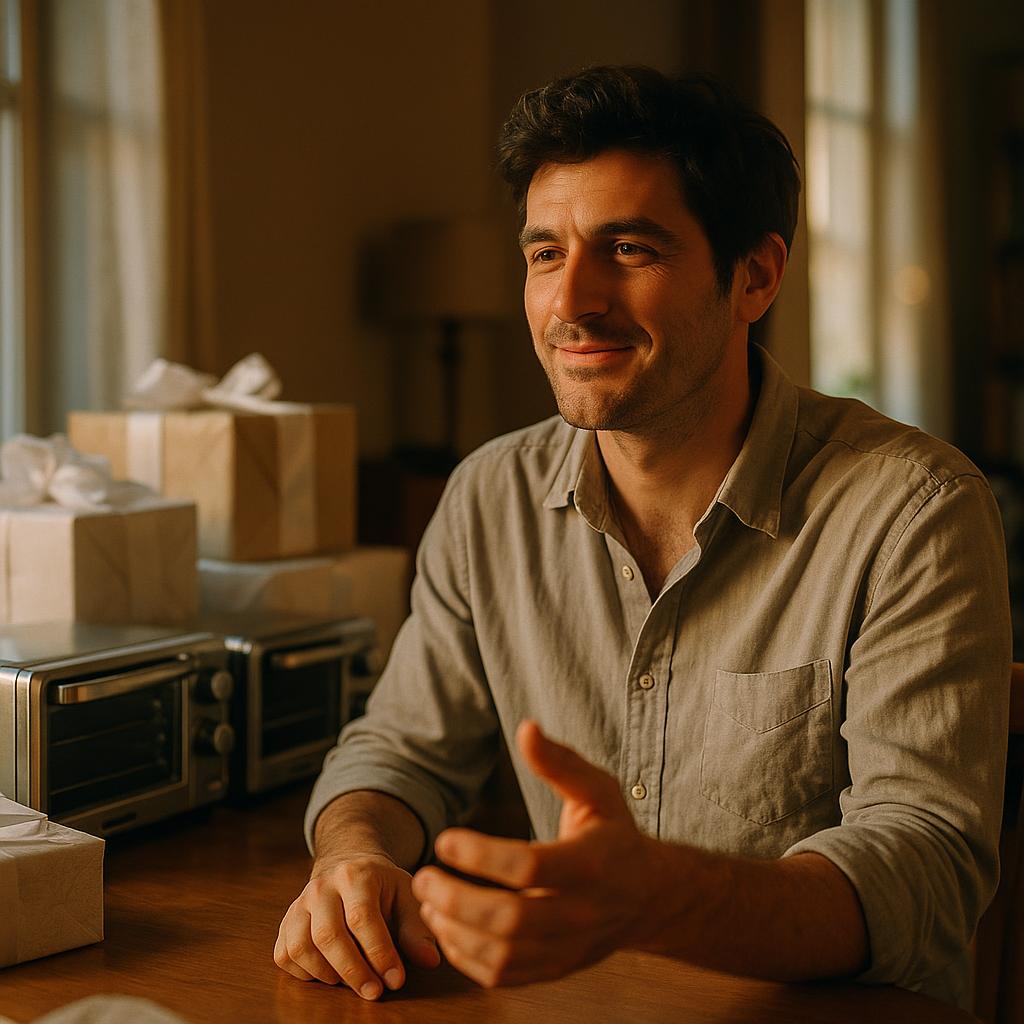 Image by RM AI
Image by RM AI
The Unexpected Visit
The knock came on a Tuesday evening, just as David and I were debating whether to order Thai or Indian for dinner. When I opened the door, I almost didn't recognize my father standing there—he looked somehow smaller, the confident posture I'd grown up with replaced by slumped shoulders and uncertain eyes. He clutched a carefully wrapped package in hands that seemed to tremble slightly. "Suzan, I..." he started, then cleared his throat. "I was wondering if we could talk." My first instinct was to close the door, to protect the fragile peace I'd found this past week. But something in his expression—vulnerability I'd never seen before—made me hesitate. David appeared behind me, his hand finding the small of my back in silent support. I felt my defenses wavering. This wasn't my father as I knew him—the man who'd always looked past me to find Tara in any room. This was someone I didn't recognize, someone without my mother's influence or Tara's gravitational pull. Against my better judgment, I stepped aside. "Come in," I said, my voice steadier than I felt. As he crossed our threshold, I couldn't help wondering what could possibly be important enough to bring him here alone—and what was inside that package that made his hands shake.
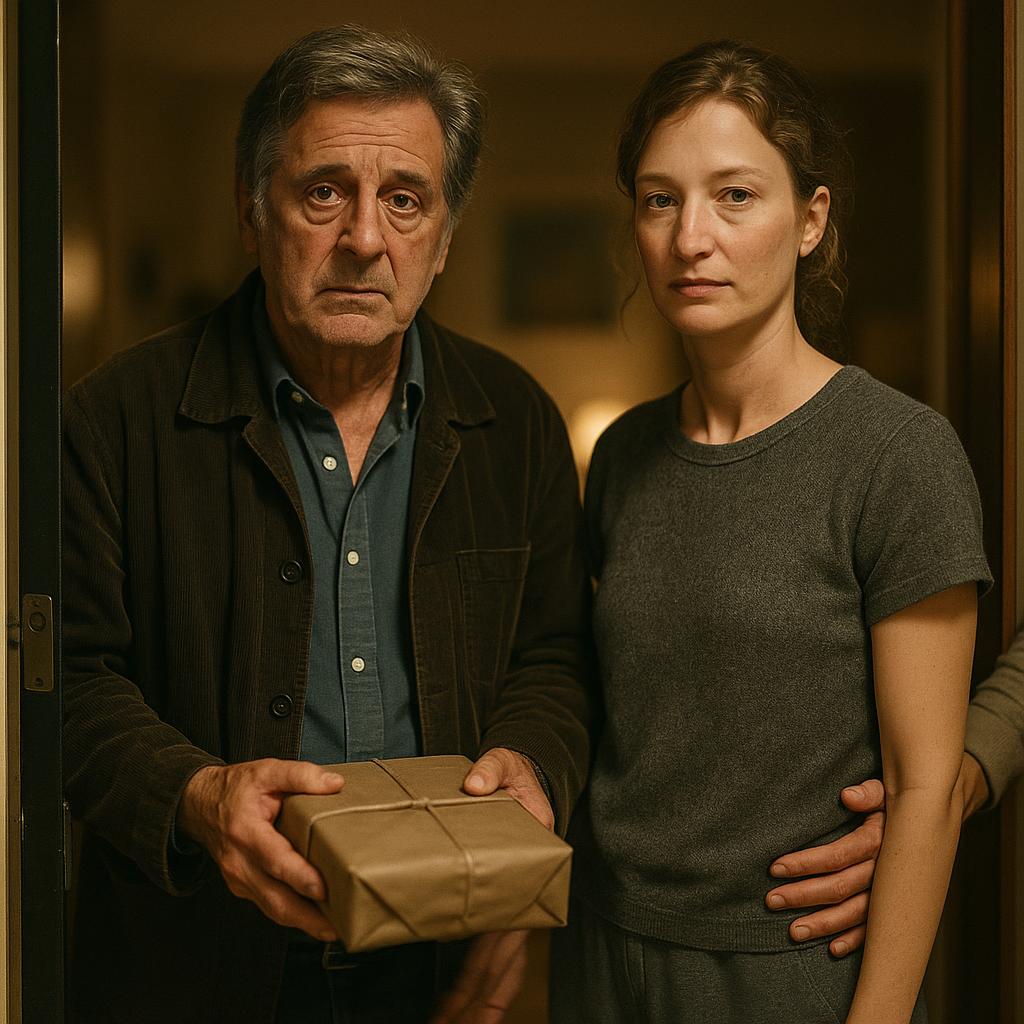 Image by RM AI
Image by RM AI
Father's Confession
My father sits on our IKEA couch like he's at a job interview, perched on the edge with his back ramrod straight. The wrapped package—rectangular and meticulously taped—sits between us like a peace offering. For five excruciating minutes, he opens and closes his mouth, false-starting sentences that die before they're born. I've never seen him struggle for words before. 'Suzan,' he finally manages, his voice cracking slightly, 'what you said at dinner... you were right.' He runs a hand through his thinning hair, a gesture so human it catches me off guard. 'I always understood Tara. She was... loud. Clear. You were this quiet little girl with deep thoughts I couldn't access.' His eyes, so similar to mine, finally meet my gaze. 'I took the easy route. I failed you.' The admission hangs in the air between us, decades late but undeniably genuine. I feel my carefully constructed wall of anger developing hairline fractures. 'I'm not asking for forgiveness,' he continues, a tear tracking down his weathered cheek. 'I just needed you to know that I see you now.' His hand trembles as it reaches for the package, and I realize with startling clarity that I'm not the only one who's been invisible in our family.
 Image by RM AI
Image by RM AI
The Wedding Album
My father slides the package across the coffee table, his fingers lingering on the edge as if reluctant to let go. 'I collected these from your friends,' he explains, his voice uncharacteristically soft. 'I thought you should have them.' I unwrap it carefully to find a professionally bound wedding album, its cover embossed with our names in silver script. As we flip through the pages together, I see my special day through new eyes—David spinning me on the dance floor, our friends forming a laughing circle around us, the cake smeared across both our noses. But it's my father's reactions that captivate me. His breath catches when we reach the photo of me walking down the aisle alone, my smile brave but my eyes betraying the emptiness I felt. 'You looked so beautiful,' he whispers, a tear sliding down his cheek. 'And so alone.' His finger traces the outline of my dress, and I realize with startling clarity that this might be the first time he's truly seeing me—not as Tara's sister or as the quiet, helpful daughter, but as Suzan. The woman who walked herself down the aisle because her parents couldn't be bothered to show up. What he says next, though, makes me question everything I thought I knew about that day.
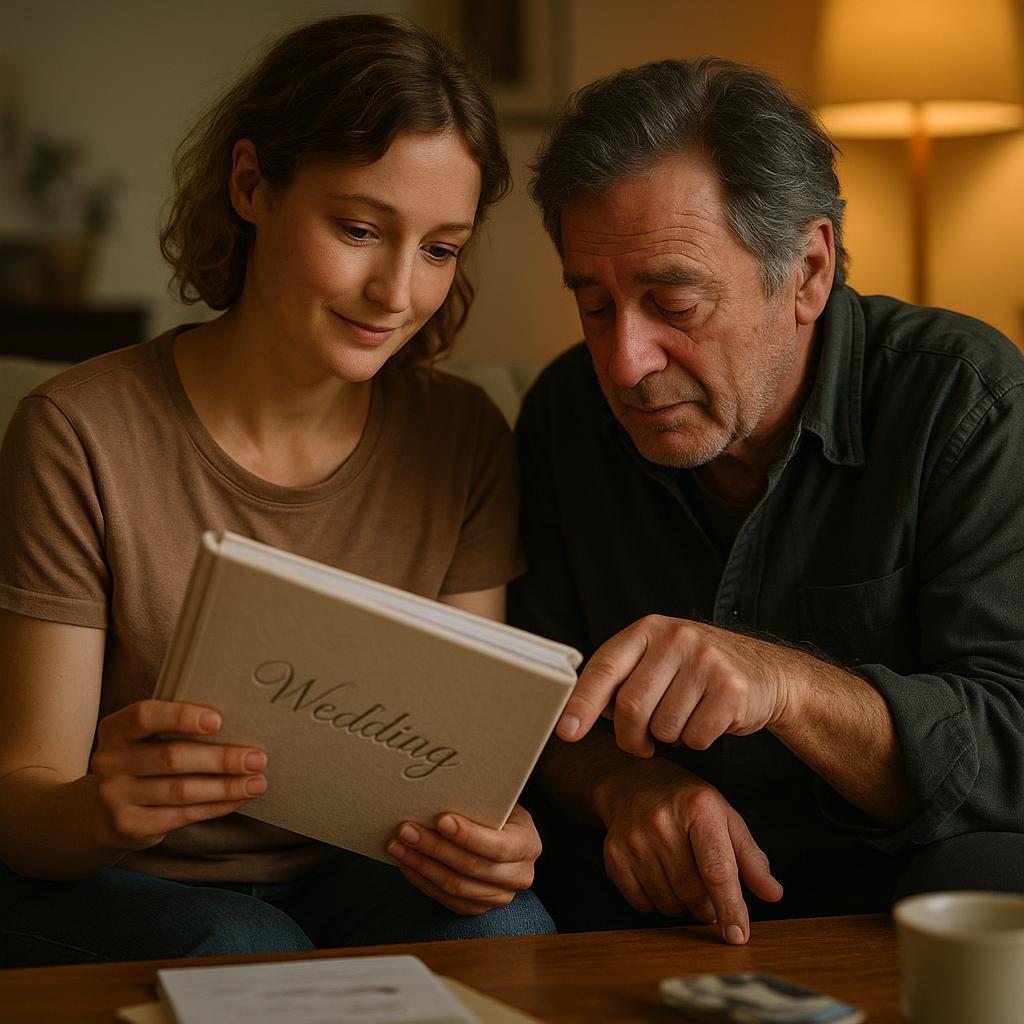 Image by RM AI
Image by RM AI
Mother's Resistance
The front door clicks open, and David steps in, his eyes widening at the sight of my father still sitting on our couch. The air instantly thickens with tension. Dad clears his throat and looks down at his hands. 'Your mother...' he starts, then sighs heavily. 'She refuses to acknowledge any of it, Suzan. Says you're being dramatic as usual.' I feel that familiar sting, but it's duller now, like an old wound that's finally starting to heal. 'We've been arguing about it all week,' he continues. 'Tara's taken her side, of course. They've convinced themselves you ruined a perfectly nice family dinner for attention.' He looks up, his eyes tired. 'Your sister's been sending your mother articles about narcissistic personality disorder. They think you fit the profile.' I laugh bitterly at the irony. Part of me wants to throw him out, to slam the door on this familiar dynamic where I'm always the problem. But another part recognizes what it must have cost him to come here alone, to break ranks with the women who've controlled our family narrative for decades. David sits beside me, his presence steady as always. 'So why are you here?' I ask my father, surprised by the gentleness in my voice. His answer would reveal a truth about my parents' marriage I never saw coming.
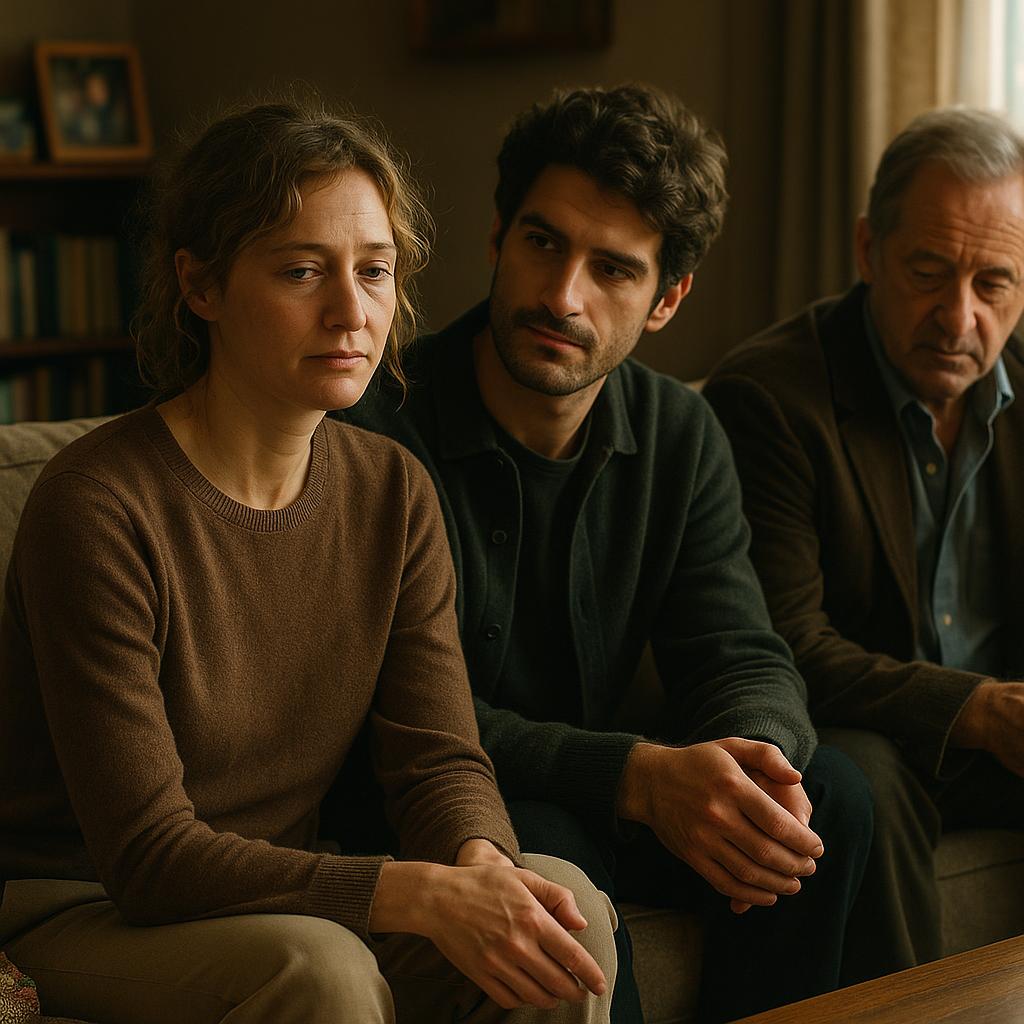 Image by RM AI
Image by RM AI
Small Steps
As my father stands to leave, he hesitates at our door, his hand gripping the knob like it's keeping him upright. 'Suzan,' he says, my name sounding different in his mouth now, 'would you consider having coffee sometime? Just us.' The request hangs between us—so simple yet unprecedented in our relationship. I study his face, searching for the dismissive father I've known, but finding instead a man who looks both older and somehow smaller than the towering figure of my childhood. 'I'd like that,' I reply carefully, 'but I need you to understand something.' I take a deep breath. 'This doesn't mean I'm ready to pretend everything's fine. And I'm definitely not ready to see Mom or Tara yet.' He nods, a gesture so full of understanding it momentarily steals my breath. 'One step at a time,' he says softly. As David closes the door behind him, I lean against the wall, processing what just happened. For the first time in twenty-eight years, my father and I might actually have a conversation where I'm not just background noise. It feels like the first tentative brick in a bridge across a lifetime of distance—fragile, but real. What I didn't know then was that our coffee date would reveal secrets about my family that would change everything I thought I knew about my childhood.
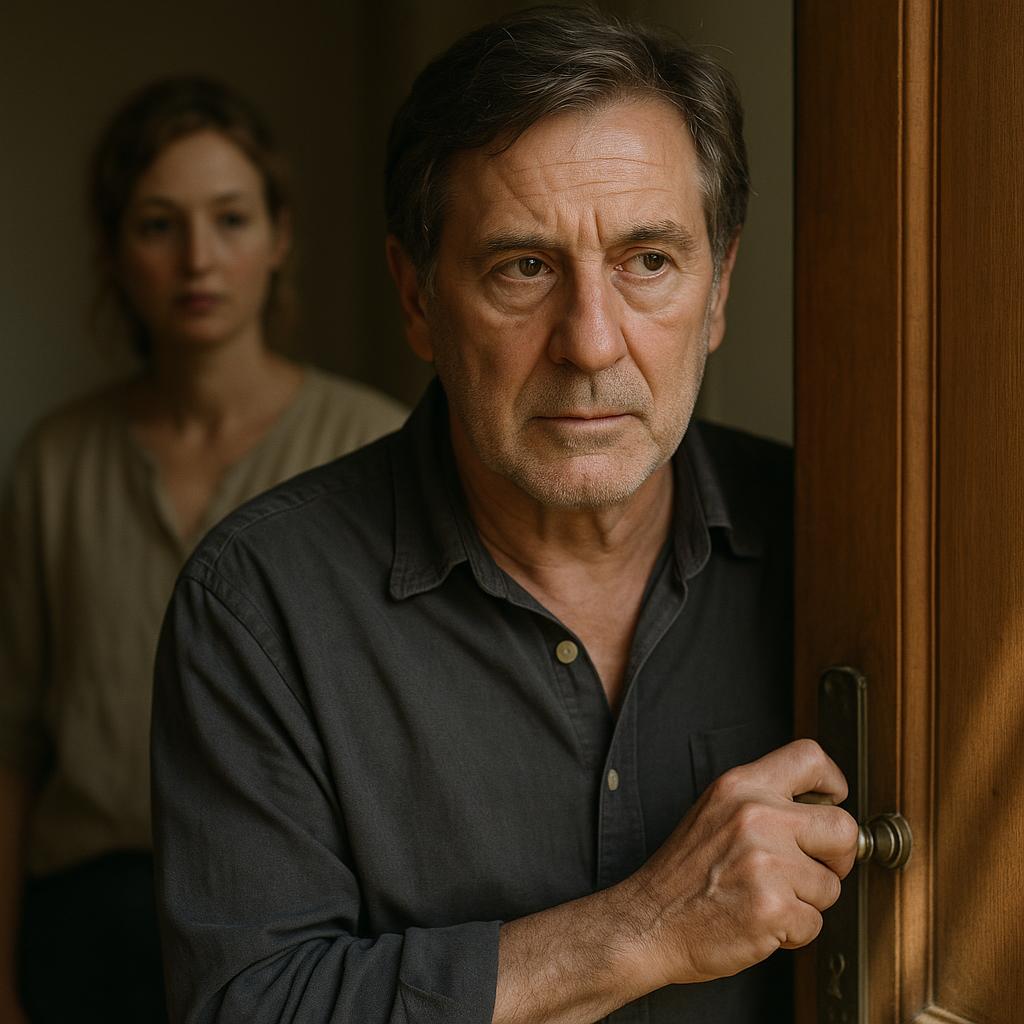 Image by RM AI
Image by RM AI
Honeymoon Preparations
Two weeks after my father's unexpected visit, I found myself folding sundresses into my suitcase, the fabric soft between my fingers as I smoothed out wrinkles. Our delayed honeymoon to Portugal was finally happening, and the thought of exploring Lisbon's cobblestone streets with David felt like the perfect escape from the family drama that had consumed my life. "Did you pack the travel adapter?" David called from the bathroom, his voice mixing with the playlist of Portuguese fado music we'd been listening to as homework for our trip. Just as I was about to answer, my phone lit up with Tara's name. I picked it up reluctantly, reading her message: "You can't just leave the country without fixing things with Mom. She's devastated and you're being selfish. AGAIN." My thumb hovered over the keyboard for a moment before I did something I'd never done before—I silenced notifications from my sister without responding. The old Suzan would have apologized, would have called Mom immediately to smooth things over. But as I placed another carefully folded dress in my suitcase, I realized that for the first time in my life, I was choosing my happiness over their approval. What I didn't know was that 4,000 miles from home, I would discover something about myself that no amount of family validation could ever provide.
Portuguese Escape
Lisbon welcomed us with open arms, wrapping us in sunshine and the intoxicating scent of salt air. Our tiny apartment in Alfama, with its views of terracotta rooftops cascading down to the glittering sea, felt like a sanctuary. For the first time in forever, I could breathe without the weight of family expectations crushing my chest. "You look different here," David whispered one morning as we sipped espresso on our balcony. "Lighter." He was right. Away from the shadow of Tara's perfection and my parents' indifference, I was discovering parts of myself I never knew existed. We got gloriously lost in narrow cobblestone streets, ate our weight in pastéis de nata, and danced to haunting fado music in dimly lit bars where nobody knew our story—where nobody expected me to be anything but myself. One evening, as we watched the sunset paint the city gold, David took my hand. "This is the real you, Suzan," he said softly. "The one your family never deserved to know." I nodded, tears pricking my eyes, not realizing that 4,000 miles from home, I was about to receive a message that would force me to confront the very past I was trying to escape.
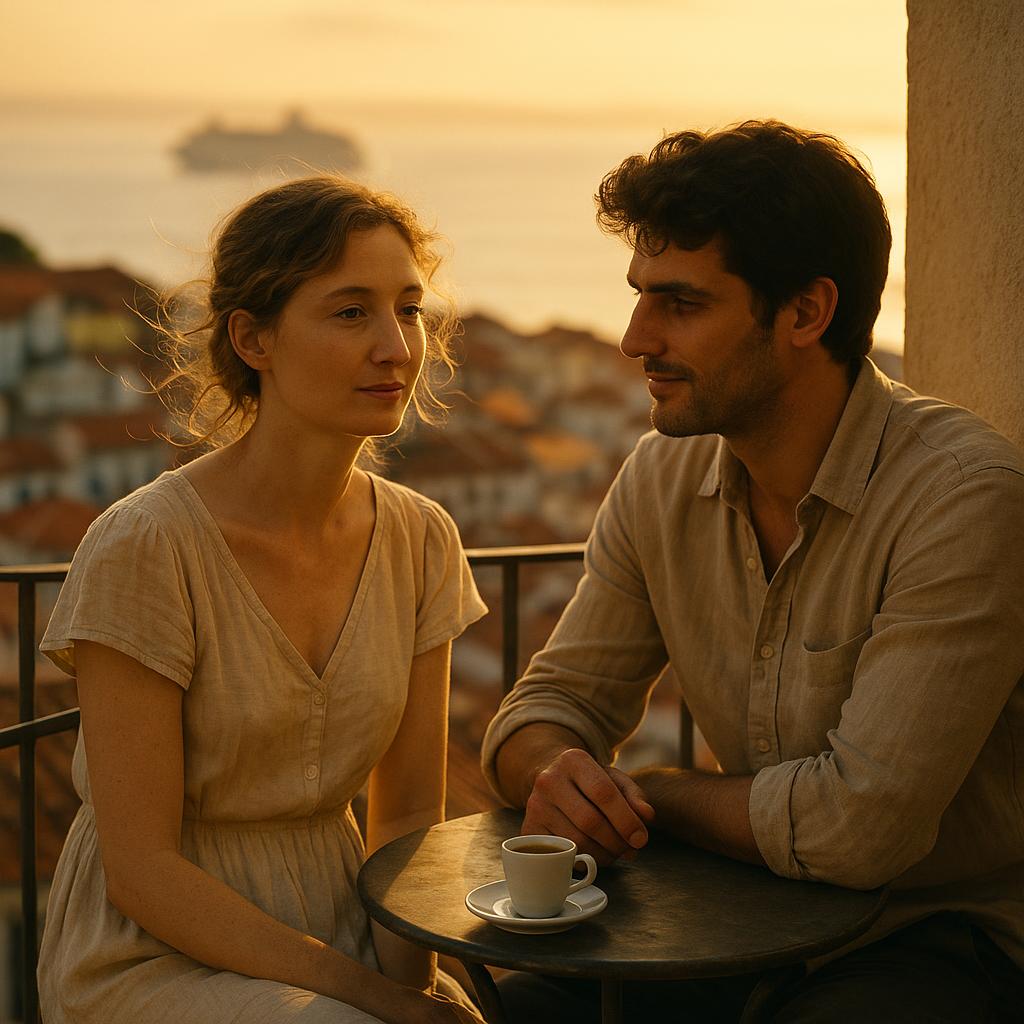 Image by RM AI
Image by RM AI
The Postcard
On our third day in Lisbon, I found myself standing in front of a postcard rack, fingers tracing the edges of a vibrant image showing the city's colorful buildings cascading down to the Tagus River. "This one," I said to David, who nodded with that quiet understanding I'd grown to love. Back at our tiny café table, I stared at the blank space, pen hovering. What do you write to a father you're just beginning to know at twenty-eight? Not the formal "Wish you were here" that strangers exchange, but not the intimate details I wasn't ready to share either. "Just write what feels right," David suggested, sipping his espresso. So I did—a few lines about the pastries we'd discovered, the hidden viewpoint where we watched the sunset, the feeling of freedom in getting lost among cobblestone streets. As I dropped it into the mailbox, I realized something profound: for the first time, I was reaching out to my father not from obligation or desperate need for approval, but because I genuinely wanted to share this slice of joy with someone who was finally trying to see me. The postcard wasn't an olive branch extended from guilt—it was a tiny window into the person I was becoming, thousands of miles from the shadow I'd lived in. What I didn't expect was how quickly that simple postcard would change everything.
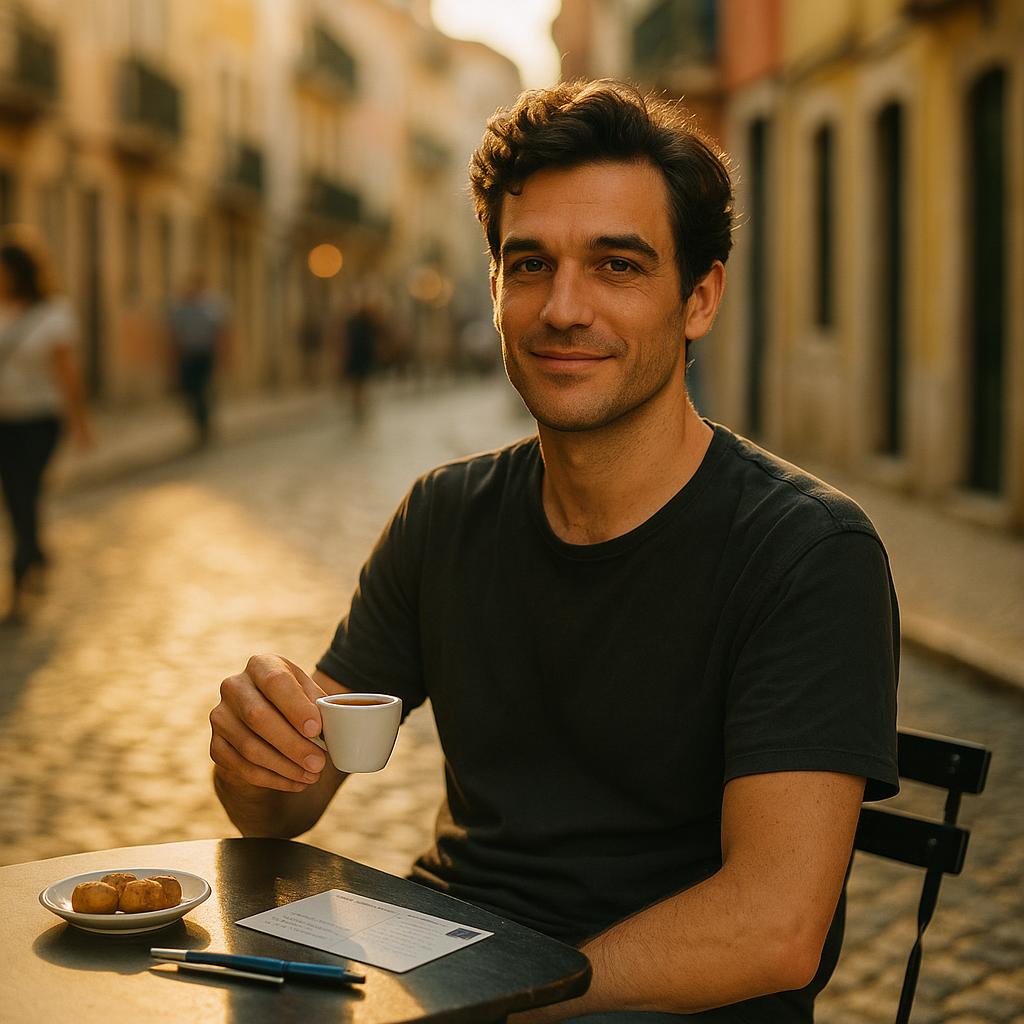 Image by RM AI
Image by RM AI
The Unexpected Call
I was leaning against the wrought iron railing of our Lisbon balcony, watching the sunset paint the ancient city in gold, when my phone buzzed. My mother's name flashed across the screen like a warning sign. For a moment, I considered letting it go to voicemail—wasn't that the whole point of being 4,000 miles away? But something made me answer. 'Hello?' My voice sounded stronger than I felt. 'Suzan? Oh, you picked up.' Her voice was oddly small, missing its usual authoritative edge. 'How's... Portugal?' The question hung awkwardly between us, as if we were distant acquaintances making small talk. I described the weather, the food, the cobblestone streets—anything but what we should have been discussing. She responded with polite interest, asking about flight times and hotel amenities while carefully dancing around the dinner confrontation, my wedding absence, the decades of being overlooked. It was maddening how she could pretend nothing had happened, like my standing up for myself was just a minor disagreement already forgotten. Behind me, I heard the shower turn off, David humming some Portuguese song he'd picked up. I needed to end this call before he came out, before he saw the tears of frustration forming in my eyes. But then my mother said something that made my blood run cold: 'Your father showed me the postcard you sent him. I think we need to talk about what he's been telling you.'
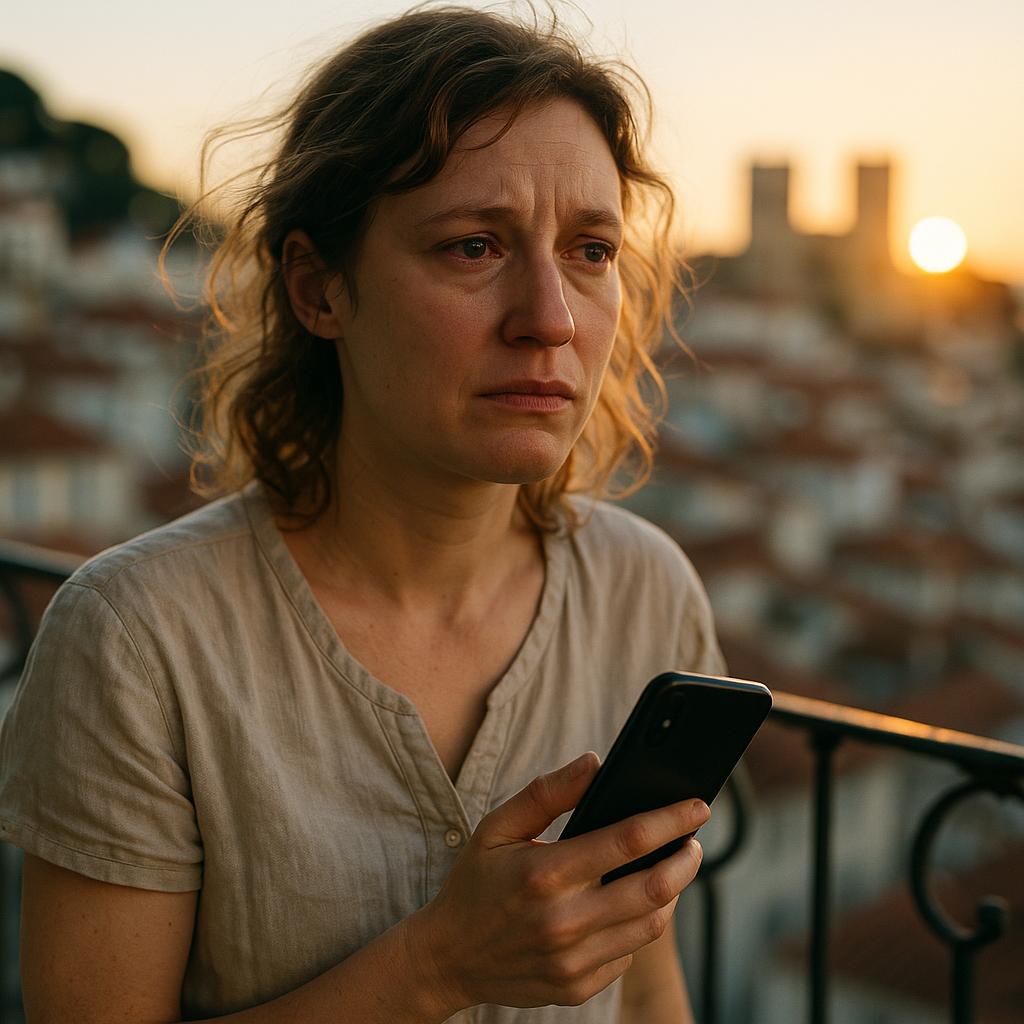 Image by RM AI
Image by RM AI
Mother's Way
My mother's voice drones on through the phone, filling our Lisbon balcony with tales of Mrs. Peterson's scandalous fence paint choice and Tara's promotion at work. I watch a seagull circle lazily overhead as Mom describes, in excruciating detail, how my sister charmed the entire garden club with her homemade lavender scones. Not once does she ask about my honeymoon or how I'm feeling. When I finally manage to wedge a question into her monologue—"Mom, why are you really calling?"—the line goes quiet. "Your father thought we should talk," she admits, her voice suddenly smaller. "He's been... different since your dinner." I wait for an apology about my wedding day, about the empty chairs where parents should have sat, about twenty-eight years of being the family afterthought. It doesn't come. But something in her tone shifts—a tremor I've never heard before. It's subtle, but unmistakable: my mother is afraid. Not of me, exactly, but of what's happening to her perfectly controlled family narrative now that I've stopped playing my assigned role. As she fumbles through an awkward invitation to brunch when we return, I realize with startling clarity that for the first time in our relationship, my mother doesn't know what to do with me—and that gives me a power I never knew I could possess.
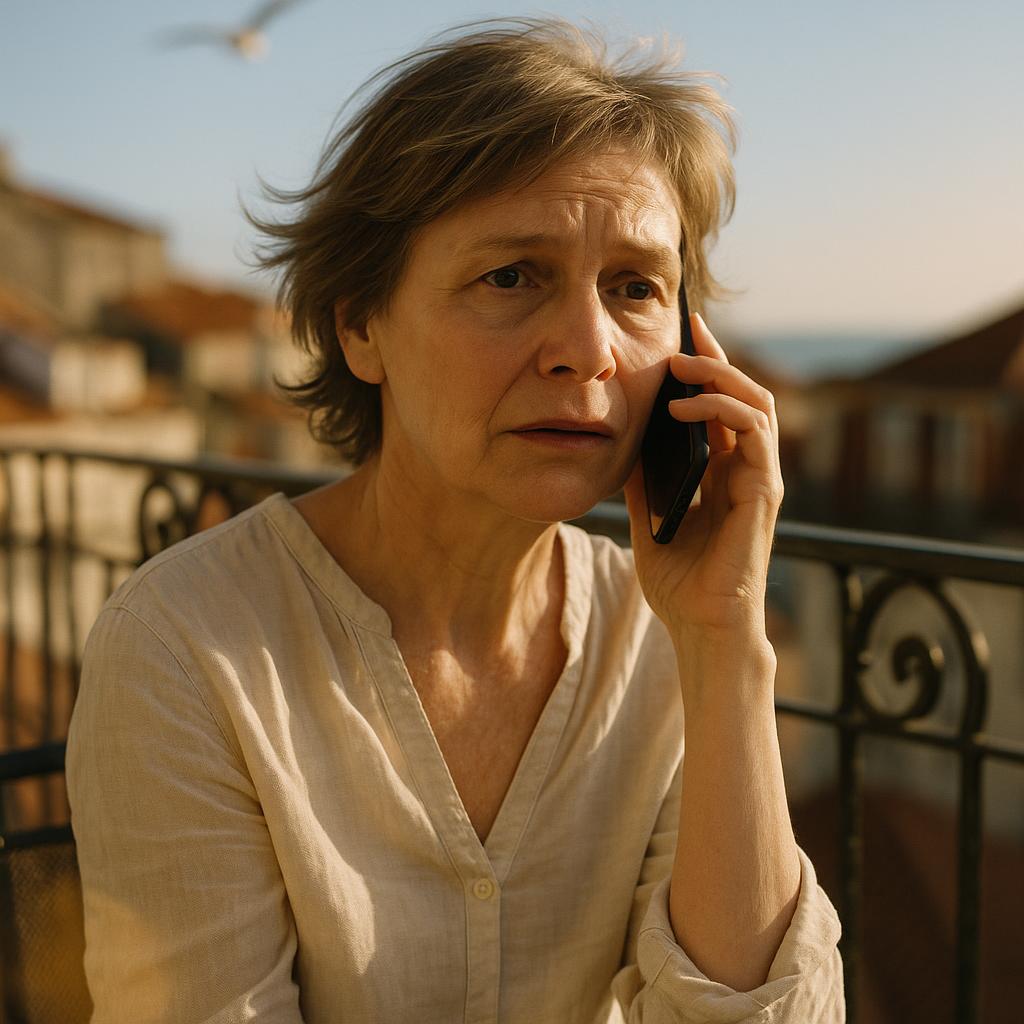 Image by RM AI
Image by RM AI
Setting Boundaries
I took a deep breath, watching the Lisbon sunset as I gathered my courage. 'Mom, I'm willing to work on our relationship, but things need to change,' I said firmly. 'We can't just pretend nothing happened. I need you to acknowledge how I've been treated all these years.' The line went so quiet I thought we'd been disconnected. Then came her familiar deflection: 'Oh, Suzan, you've always been so sensitive. Did I tell you about Tara's new promotion?' My heart sank. I gripped the phone tighter, watching a couple stroll hand-in-hand below our balcony, completely unaware of my silent breakdown. 'This is exactly what I'm talking about,' I said, my voice steadier than I felt. 'You can't even have one conversation that centers me instead of Tara.' She sighed that martyred sigh I knew too well. 'I don't understand why you're making everything so complicated,' she said. As I hung up, David appeared with two glasses of port wine, his eyes questioning. I leaned into his embrace, finally accepting a truth I'd been running from my entire life: my mother might never be capable of giving me what I needed. And for the first time, that realization didn't destroy me—it freed me to build boundaries that would protect the person I was becoming.
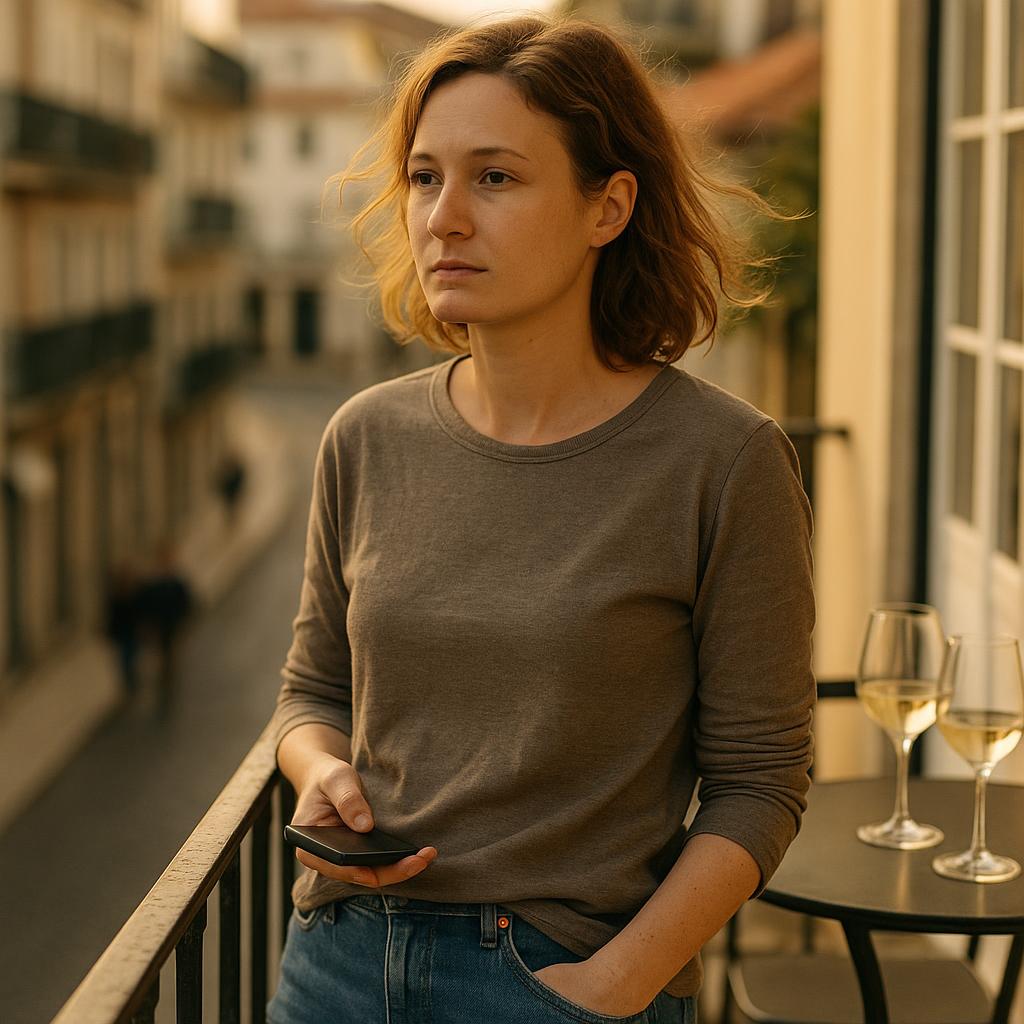 Image by RM AI
Image by RM AI
Seaside Reflection
The waves crashed against the jagged cliffs with thunderous applause, as if the Atlantic itself was celebrating my newfound freedom. David and I sat on the warm sand of this secluded Portuguese beach, our last day of honeymoon stretching before us like the endless horizon. 'I think I'm finally done,' I said, leaning into his steady shoulder. 'Done chasing after people who never wanted to see me in the first place.' I told him about my mother's call—how her inability to acknowledge my feelings had, ironically, given me clarity instead of pain. 'It's like I've been running this exhausting marathon my whole life, trying to reach a finish line that kept moving,' I explained, digging my toes into the sand. 'And I just... stopped running.' David squeezed my hand, his eyes reflecting the golden light of the setting sun. 'You know what the best part is?' I whispered. 'For the first time, I don't need them to validate my worth.' As the sun melted into the ocean, painting everything in amber and rose, I felt something settle inside me—a peace so profound it brought tears to my eyes. I was Suzan, whole and complete, with or without my family's approval. What I didn't realize then was that this moment of acceptance would be tested sooner than I thought, with a text message waiting on my phone that would change everything.
 Image by RM AI
Image by RM AI
Return to Reality
The moment our key turned in the lock, I felt it—a shift in the atmosphere of our apartment. What was once a space filled with wedding stress and family drama now felt like our own little kingdom. David dropped our bags by the door and wrapped his arms around me from behind. 'Welcome home, Mrs. Chen,' he whispered, his breath warm against my ear. I smiled, leaning into him as I surveyed our living room—wedding gifts still stacked neatly in one corner, Portuguese ceramics and cork souvenirs scattered across the coffee table. The stack of mail on the counter caught my eye, and I reluctantly pulled away from David's embrace to sort through it. Bills, advertisements, a wedding card that arrived too late... and then two envelopes that made my stomach tighten. One, in my father's careful handwriting, thanking me for the postcard and suggesting dates for our coffee meeting. The other, cream-colored and expensive-looking, bore Tara's perfect calligraphy. I set hers aside, not yet ready to let my sister's words—whatever they might be—pierce the peaceful bubble Portugal had given me. For the first time, our apartment felt like a sanctuary rather than a reminder of family disappointments. What I didn't realize was that the letter from Tara contained information that would force me to question everything I thought I knew about our childhood.
 Image by RM AI
Image by RM AI
Coffee with Father
I spot my father through the café window, already seated at a corner table with two steaming mugs in front of him. He's fifteen minutes early—so unlike the man who was perpetually "running late" for my school events. The café is bustling with the Wednesday morning crowd, laptops open and conversations humming—perfect neutral territory with no family ghosts lurking in the corners. As I push through the door, Dad stands awkwardly, his hands fidgeting with a napkin. "I got you a latte," he says, gesturing to the untouched mug. "I remembered you liked them." The fact that he remembers my coffee preference but missed my wedding is an irony I swallow down with my first sip. We exchange pleasantries about the weather, about Portugal, about anything but what we're really here to discuss. Then, surprisingly, he pulls out his phone. "I wanted to show you something," he says, scrolling through photos of intricately carved wooden boxes and small furniture pieces. "I've taken up woodworking since retiring." His eyes light up as he explains each project, and I realize with a pang how little I know about this man—my own father—and how much of each other's lives we've sacrificed at the altar of our family's dysfunction. What he says next, though, makes me nearly drop my coffee cup.
 Image by RM AI
Image by RM AI
Father's Regrets
Dad stares into his coffee cup, turning it slowly between his weathered hands. 'I failed you, Suzan,' he says, his voice barely audible above the café chatter. 'Every time your mother pushed you aside for Tara, I saw the hurt in your eyes. I just... took the path of least resistance.' The confession hangs between us, unexpected and raw. He tells me how he'd notice me shrinking at family gatherings, how he'd rehearse things to say but never found the courage. 'Your wedding day,' he continues, his voice cracking, 'that was my breaking point. I should have been there walking you down the aisle, not at some ridiculous lunch.' I watch him struggle with emotions I've never seen him express. 'I missed watching you become this strong, incredible woman sitting across from me.' His words aren't perfect—they come decades too late and wrapped in clumsy phrasing—but they're honest in a way our family has never been. When he asks if we can try again, not pretending the past didn't happen but building something new, I find myself cautiously nodding. What I don't tell him is that I've already read Tara's letter, and I know the family secret that might make forgiveness impossible.
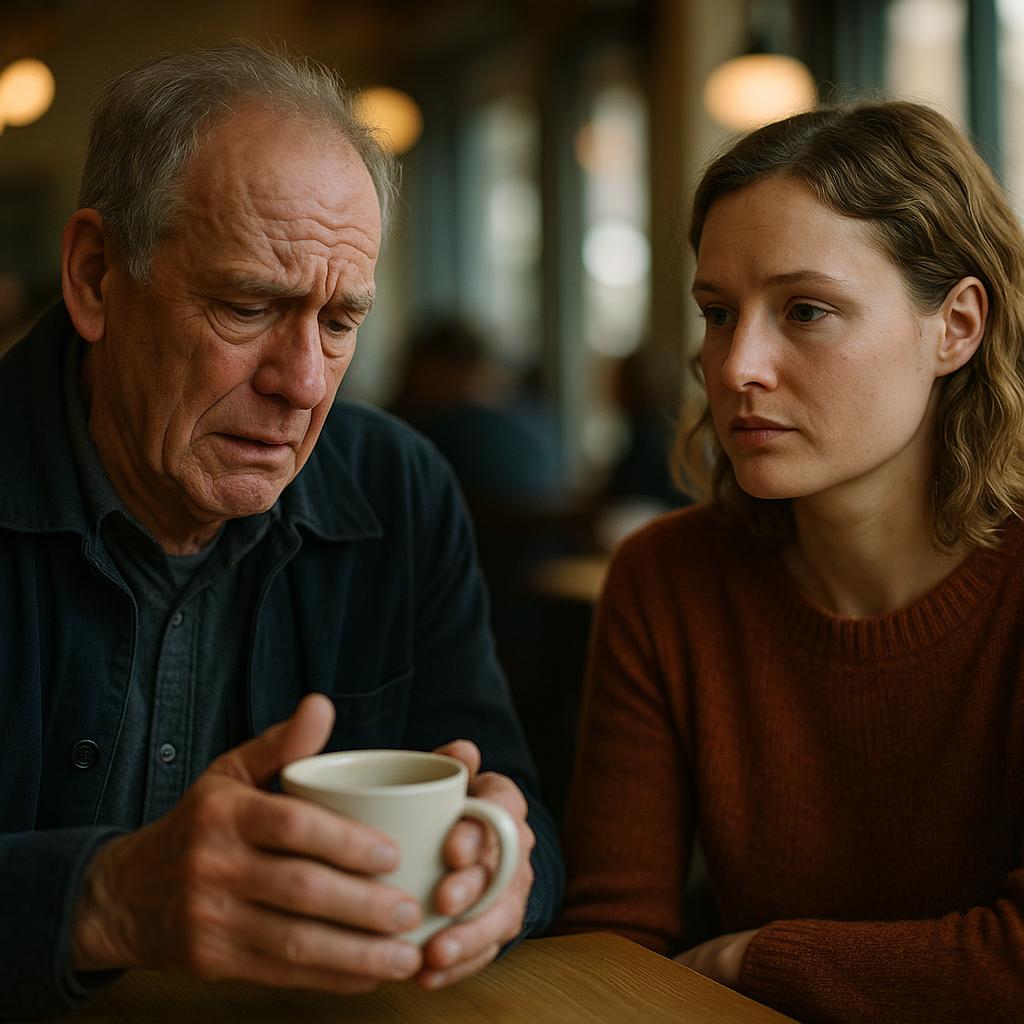 Image by RM AI
Image by RM AI
Tara's Letter
I sat cross-legged on our living room floor, staring at Tara's letter like it might bite me. The cream-colored envelope with its perfect calligraphy screamed 'expensive' and 'important'—just like everything about my sister. After a week of avoiding it, I finally tore it open. Inside was an invitation to her art gallery opening next month, with a handwritten note at the bottom: 'Family should support each other.' I actually laughed out loud, a bitter sound that echoed in our quiet apartment. The audacity of her to write those words after missing my wedding! David found me still staring at it, torn between maintaining the boundaries I'd worked so hard to establish in Portugal and a nagging curiosity about this rare moment where Tara actually wanted my presence. 'You don't have to decide right now,' he said, settling beside me on the floor. 'But if you go, you go on your terms.' He was right. Maybe it was time to show up—not as the adoring little sister she expected, the one who would fade into the background of her big night, but as an equal who refused to be diminished. I placed the invitation on our fridge with a magnet, a daily reminder that I was no longer the Suzan who desperately sought approval. What I didn't realize was that this gallery opening would reveal a side of Tara I never knew existed.
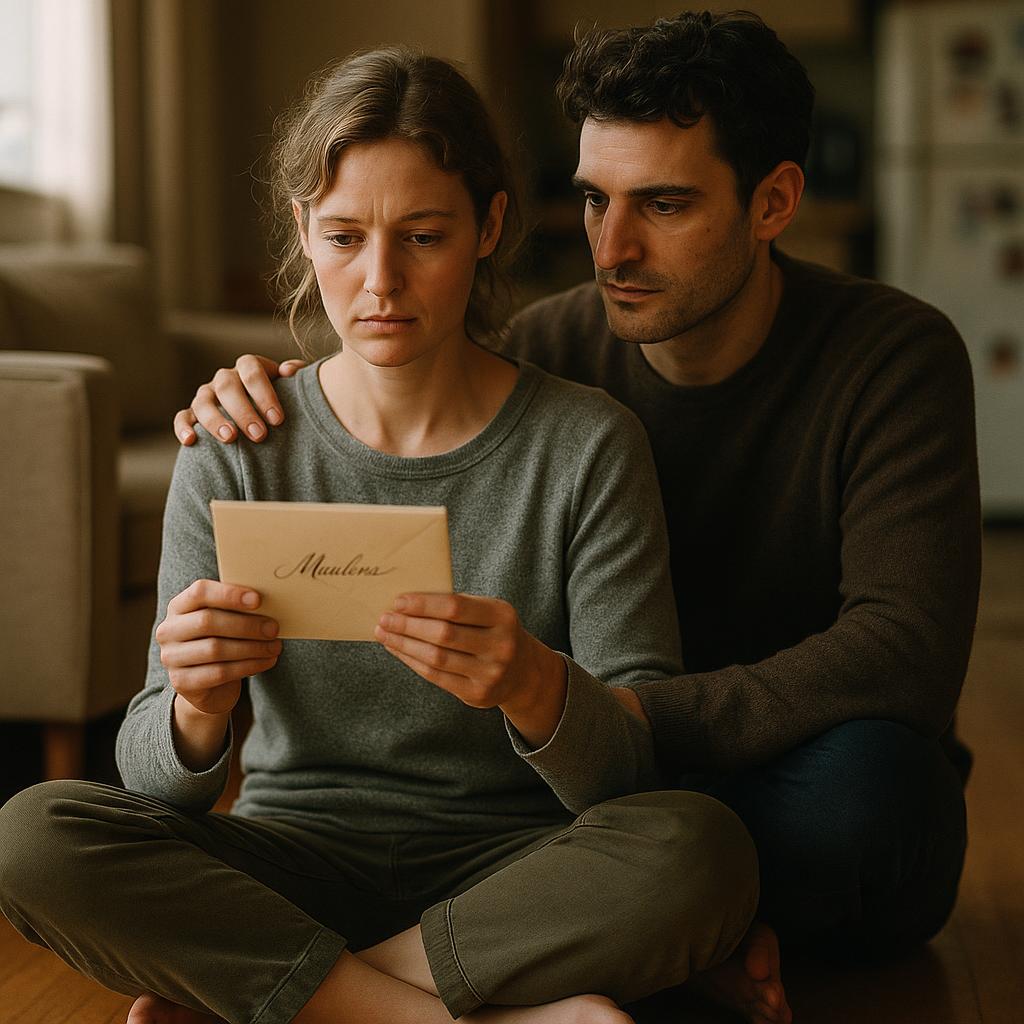 Image by RM AI
Image by RM AI
The Gallery Opening
The gallery was smaller than I expected, but packed with people sipping champagne and nodding thoughtfully at Tara's black-and-white photographs. David squeezed my hand as we entered, his silent support worth more than words. I spotted my parents immediately—funny how they could make it to this event when my wedding wasn't worth their time. Tara stood in the center of an admiring circle, her laugh carrying across the room. When she saw me, her perfect smile faltered for just a second. She clearly hadn't expected me to actually show up. "Suzan! You came!" she exclaimed, air-kissing both my cheeks. "Everyone, this is my sister, the accountant." The way she said 'accountant'—like it was a slightly embarrassing condition—made my skin prickle. But instead of shrinking as I would have before Portugal, I smiled genuinely. "Who just returned from photographing Portugal on her honeymoon," I added, pulling out my phone. I scrolled to the sunset shot I'd taken at that secluded beach, the one where the light caught the cliffs just perfectly. The small crowd around us fell silent as they leaned in to look. "Wow, Suzan, these are... actually really good," said one of Tara's art friends, sounding genuinely surprised. For a brief moment, I caught something flicker across Tara's face—something I'd never seen directed at me before: jealousy.
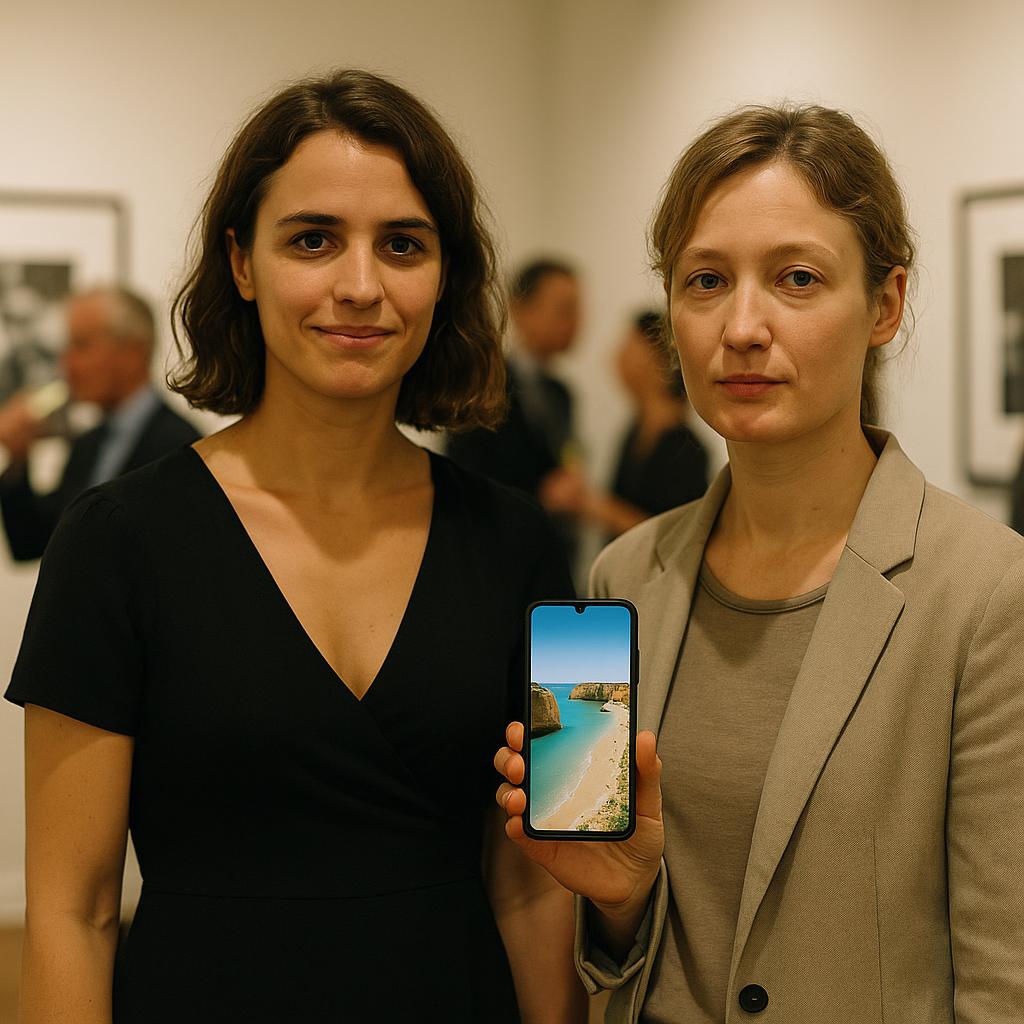 Image by RM AI
Image by RM AI
Mother's Approach
While David chatted with my father near Tara's landscape series, my mother cornered me by a stark black-and-white image of an empty playground. 'That's a lovely dress, Suzan,' she said, her voice honey-sweet but her posture rigid as marble. Before I could thank her, she pivoted. 'Though I must say, your dramatic exit at our family dinner was quite unnecessary. You've always had a flair for theatrics.' I took a slow sip of champagne, letting the bubbles settle before responding. 'It wasn't drama, Mom. It was honesty—something our family could use more of.' Her perfectly lined lips twitched. 'Well, I just think—' 'I know what you think,' I interrupted gently. 'And I'm not apologizing for speaking my truth.' Something shifted in her expression then—confidence giving way to uncertainty. For the first time, I saw it clearly: how much of her identity was wrapped up in Tara's success and my compliance. My newfound strength wasn't just inconvenient; it was threatening the family dynamic she'd carefully maintained for decades. As we stood there in silence, I realized my mother wasn't just disappointed in me—she was afraid of who I was becoming. What I didn't know then was that fear would drive her to reveal a family secret she'd kept hidden for twenty-eight years.
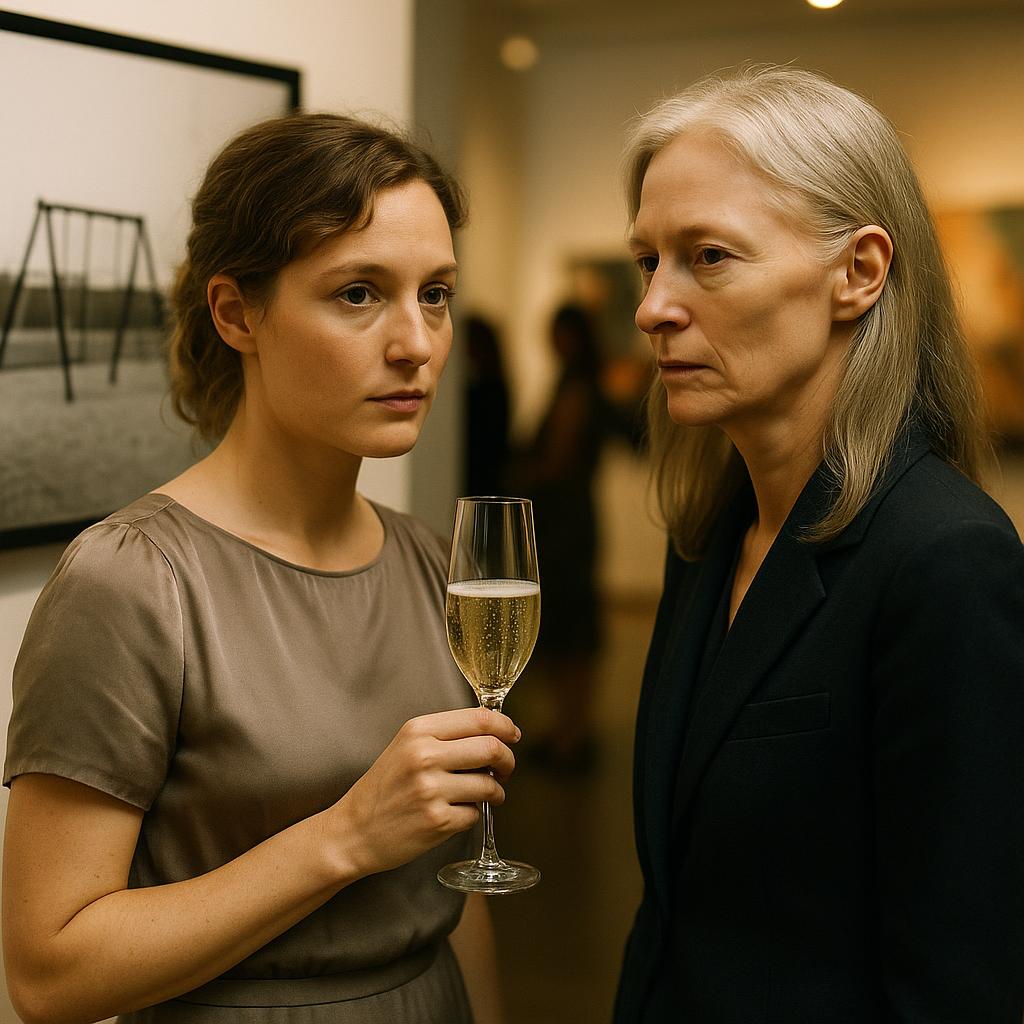 Image by RM AI
Image by RM AI
The Photograph
I was making my way through the gallery, champagne in hand, when I froze mid-step. There, hanging on the stark white wall, was a photograph that punched me in the gut. Our old backyard, captured in haunting black and white—Tara's birthday streamers and balloons dancing in the foreground while a small, solitary figure sat on our tire swing in the distance. Me. Eight-year-old me, watching the celebration from afar, not even invited into the frame properly. The placard beside it read 'Solitude' with an $800 price tag underneath. My childhood loneliness, my pain, my exclusion—all neatly packaged and commodified for strangers to purchase and hang in their dining rooms. I felt David's hand on my shoulder, but I couldn't tear my eyes away. The photograph was beautiful, technically perfect—Tara had always been talented—but it was a violation so intimate I could barely breathe. She had been documenting my isolation all along, turning my pain into her art without my knowledge or consent. The fragile healing that had begun in Portugal cracked open like thin ice beneath my feet. I turned to find Tara watching me from across the room, her expression unreadable. What kind of sister profits from another's suffering?
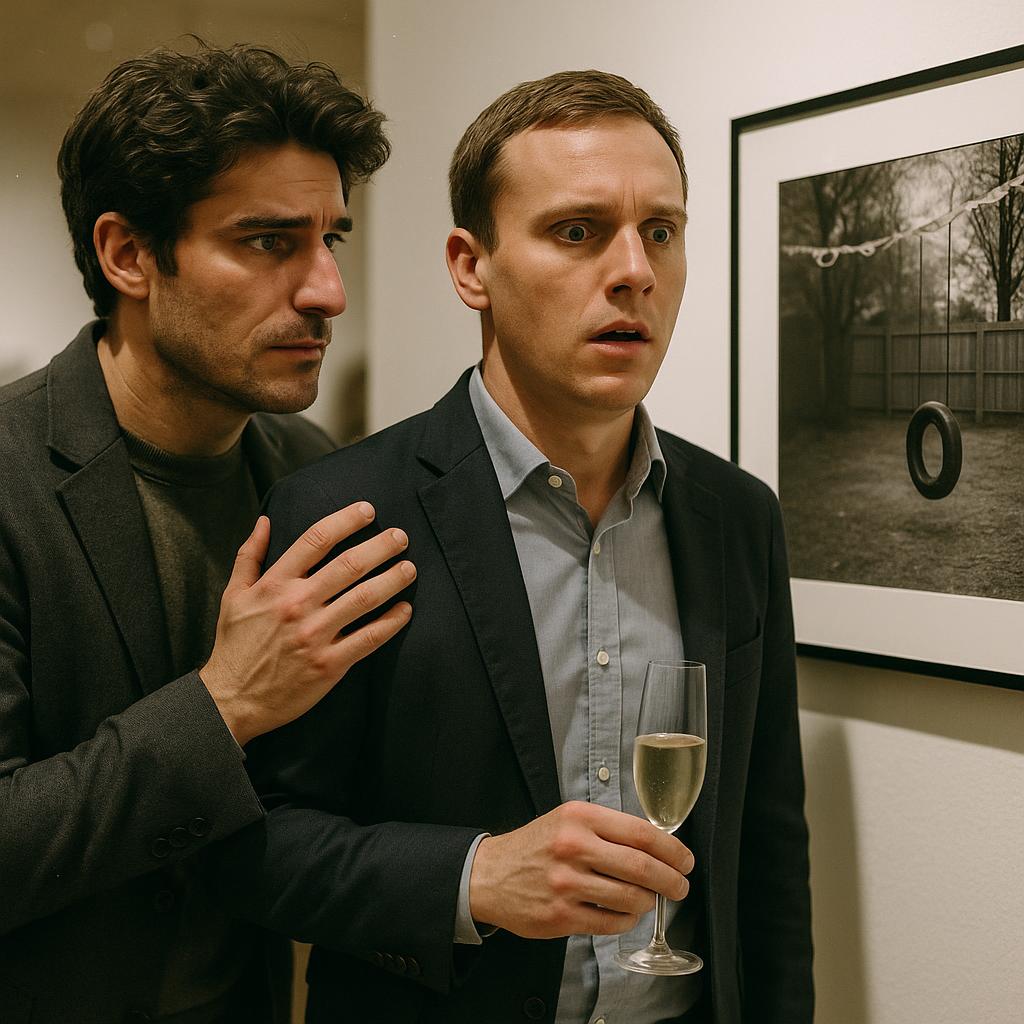 Image by RM AI
Image by RM AI
Confronting Tara
I weave through the gallery crowd with purpose, my heart pounding against my ribs. Tara stands in her element, champagne flute in hand, basking in admiration from her artistic entourage. Her perfect smile falters when she spots me approaching—she knows exactly why I'm coming. 'Can we talk?' I ask, my voice deliberately quiet, forcing her to lean in. 'That photograph of me on the tire swing—you captured my exclusion from your birthday party and put it up for sale.' Her eyes dart around, checking if anyone's listening. 'It's just art, Suzan, don't be so sensitive,' she dismisses with a practiced laugh. 'Just art?' I repeat, keeping my voice steady despite the tremor in my hands. 'That's my childhood pain hanging on your wall with an $800 price tag.' She sighs dramatically, as if I'm the unreasonable one. 'This is why I never tell you anything—you always make everything about you.' In that moment, the realization hits me like a physical blow: despite everything—the wedding, the dinner, Portugal, my growth—she still doesn't see me as a person with feelings worth considering. I'm just a subject, a prop in her narrative. What happens next surprises even me, as words I've held back for twenty-eight years finally find their voice.
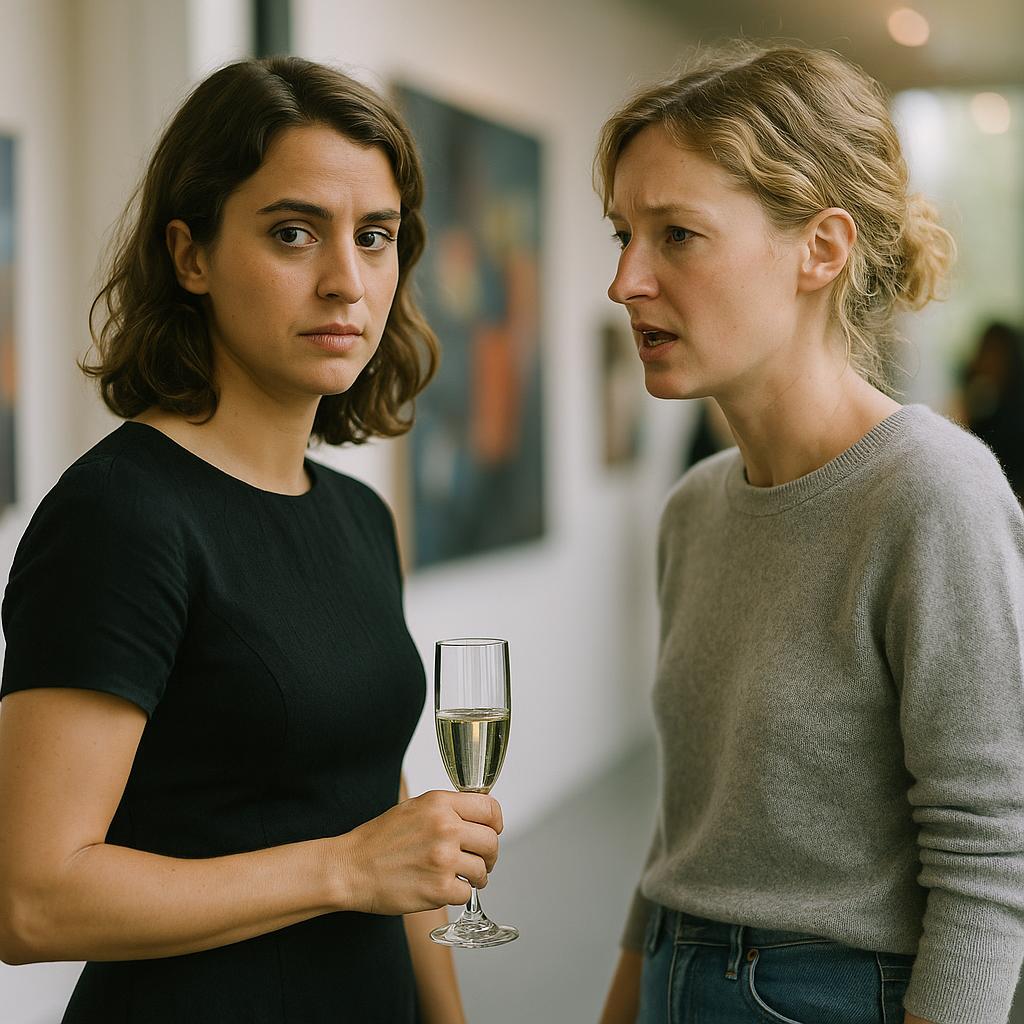 Image by RM AI
Image by RM AI
David's Intervention
Just as the words I'd suppressed for decades were about to explode from my lips, I felt a familiar presence at my side. David appeared like a guardian angel, his hand warm and steady against my back. 'Hi there, I'm David, Suzan's husband,' he introduced himself to Tara's artsy friends with a charm that somehow created a buffer zone around me. I took a deep breath, grateful for the moment to collect myself. As Tara attempted to reclaim her spotlight with some dramatic tale about her 'difficult' childhood—the same childhood where she had everything handed to her—David casually mentioned my recent promotion to senior financial analyst. 'She's revolutionizing how the firm handles their international accounts,' he said proudly. The look on Tara's face was priceless—a mixture of surprise and something else I couldn't quite place. She blinked rapidly, clearly thrown off by information about my life she'd never bothered to ask about. In that moment, I realized David wasn't just supporting me; he was showing Tara and everyone else that I wasn't the invisible little sister anymore. I had a life, achievements, and someone who actually saw me. As we excused ourselves to look at the rest of the exhibition, David whispered in my ear, 'We can leave whenever you want.' But something told me leaving now would be a mistake—especially when I noticed my mother watching us with an expression I'd never seen before.
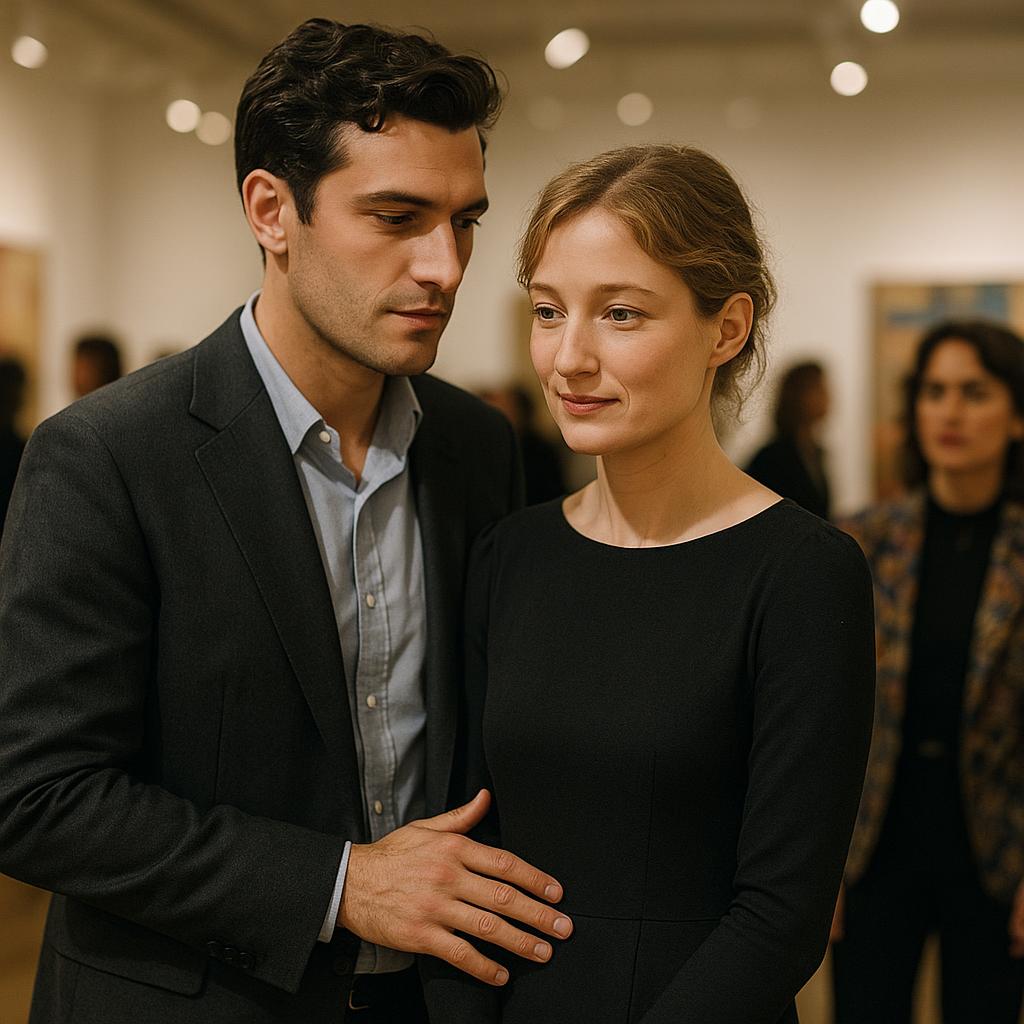 Image by RM AI
Image by RM AI
The Purchase
I stood there, staring at the photograph of my childhood self, a decision crystallizing in my mind with surprising clarity. Without a word to anyone, I marched straight to the gallery owner, a thin man with wire-rimmed glasses who was chatting with potential buyers. 'I'd like to purchase this piece,' I said firmly, pointing to 'Solitude.' His eyebrows shot up in recognition—he knew I was the artist's sister. 'This one?' he confirmed, glancing nervously toward Tara, who was now watching us with her champagne glass frozen halfway to her lips. 'Yes, this one,' I replied, already pulling out my checkbook. As I wrote the check for $800, I felt David's supportive presence behind me, and something powerful surged through my veins. The gallery owner seemed confused as he processed the transaction, looking between me and Tara's increasingly alarmed expression. 'It's my image, my memory, my pain,' I explained, my voice steady and clear enough for nearby guests to hear. 'I'm reclaiming it.' When he handed me the receipt, I felt a weight lift from my shoulders—I wasn't just buying a photograph; I was taking ownership of my narrative. No one—not Tara, not my parents—would control my story anymore. What I didn't expect was my mother's reaction as she watched me carefully remove the frame from the wall, or the words she would whisper to me that would change everything I thought I knew about our family.
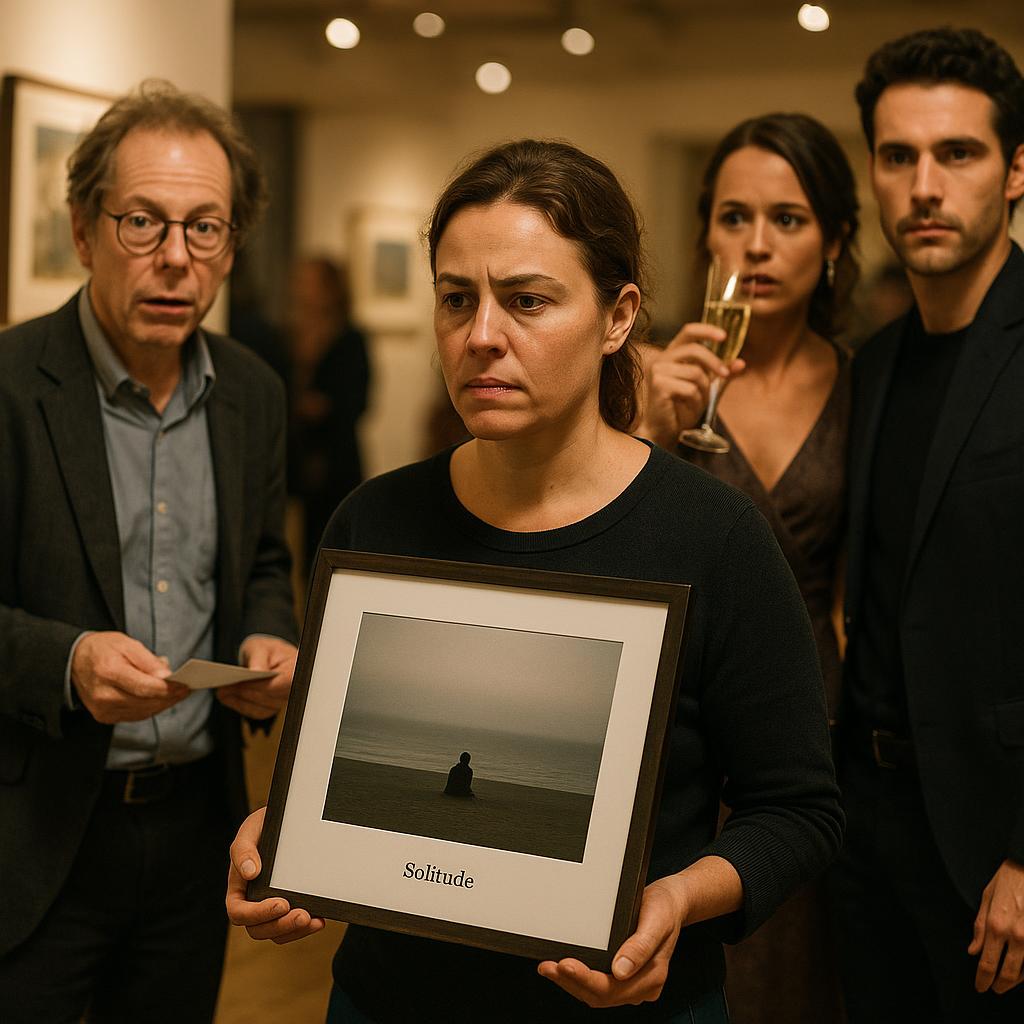 Image by RM AI
Image by RM AI
Leaving Early
I clutched the wrapped photograph against my chest as David and I stepped out of the gallery into the cool evening air. The weight of it felt significant—not just physically, but emotionally. This wasn't just a piece of art; it was a piece of my soul I'd finally reclaimed. 'Ready to go?' David asked, his hand warm against the small of my back. I nodded, feeling neither the high of victory nor the sting of defeat—just a strange, peaceful certainty that I'd done what I needed to do. Behind us, the gallery door opened, and my father appeared, his face etched with something I rarely saw there—understanding. He touched my shoulder briefly, a gesture so small yet so profound it nearly brought tears to my eyes. 'I'll see you soon,' he whispered before turning back to rejoin the event where he was expected to play his part. As David raised his arm to hail a taxi, I realized something fundamental had shifted. For the first time, I wasn't leaving because I felt invisible or unwanted. I was leaving on my terms, with my dignity intact and my story firmly in my own hands. What I didn't know then was that my mother was already texting me, her message containing three words that would turn everything I thought I knew about our family upside down.
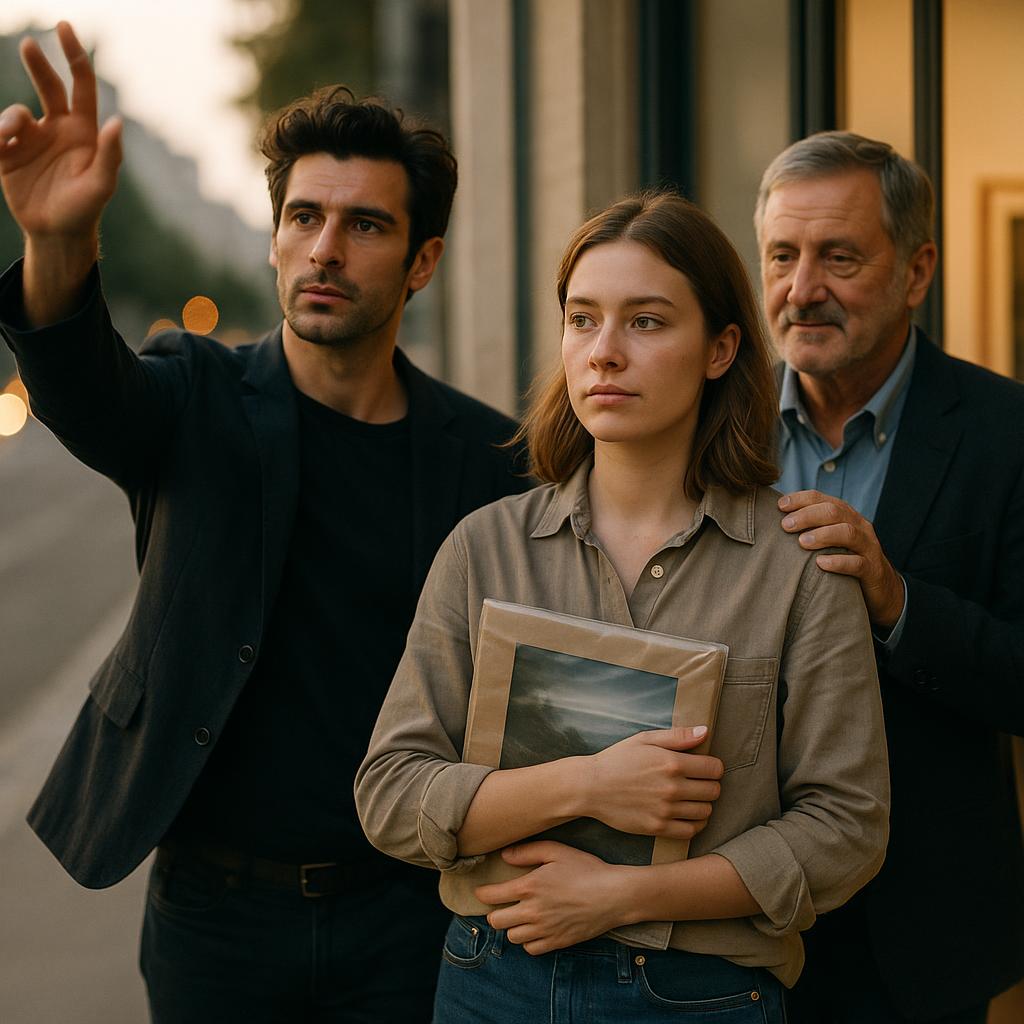 Image by RM AI
Image by RM AI
The Framed Memory
Back home, I carefully removed Tara's photograph from its pretentious gallery frame—all sleek black angles and overpriced minimalism. My hands trembled slightly as I slid the image into the simple silver frame David's parents had given us as a wedding gift. The irony wasn't lost on me: the family who couldn't attend my wedding had their gift repurposed to house my reclaimed childhood pain. Instead of hiding it away in a drawer like a shameful secret, I placed it prominently on our bookshelf between my favorite novels and David's travel guides. "Are you sure you want to see that every day?" David asked, concern etching his features as he wrapped his arms around my waist from behind. "Won't it just remind you of everything that happened?" I leaned back against his chest, studying the black-and-white image of my younger self, alone on that tire swing. "That's exactly why I want it here," I explained. "It's not about the pain anymore. It's about how I finally stopped being that little girl waiting for an invitation to join her own family." The photograph wasn't just art now—it was evidence of my journey, a before-and-after snapshot with the 'after' being the woman I'd become. What I didn't realize was how quickly I'd need this reminder of my strength when my mother's mysterious text finally revealed the family secret she'd been hiding for nearly three decades.
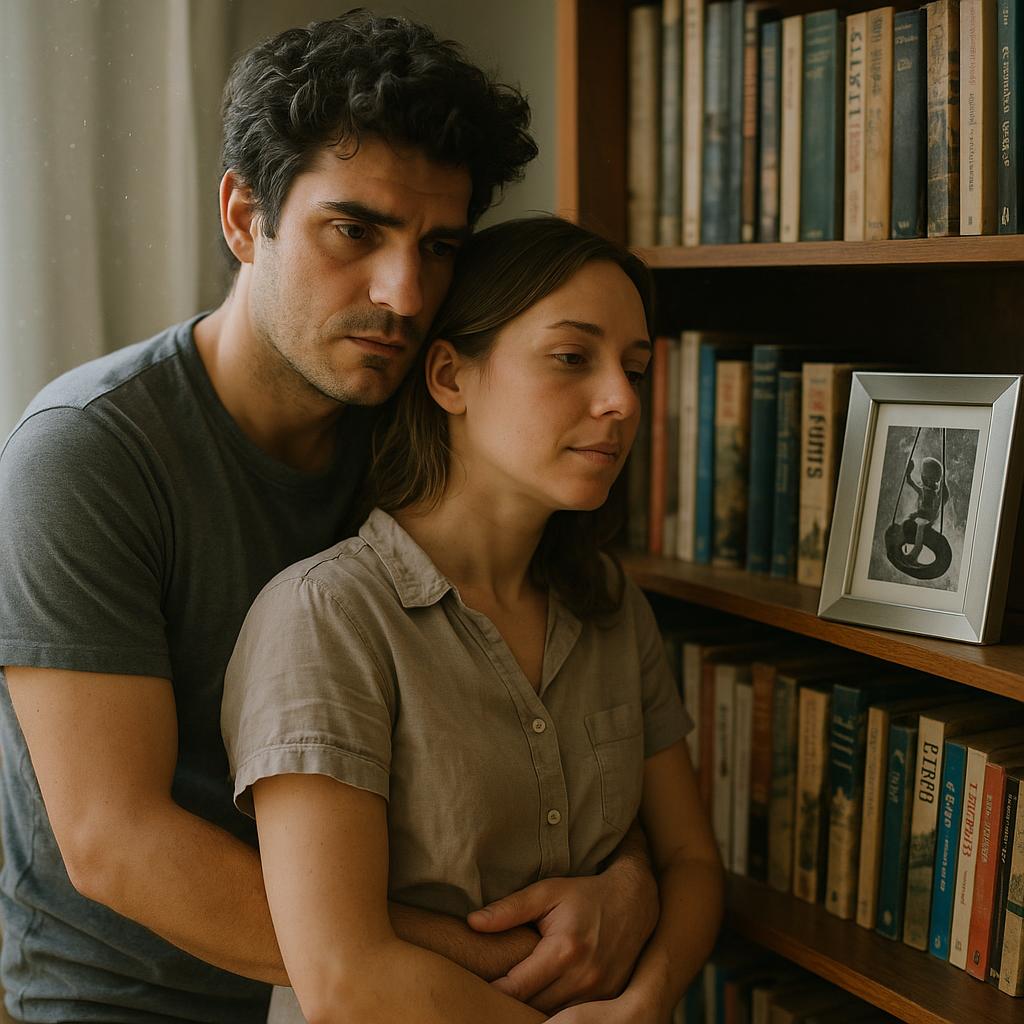 Image by RM AI
Image by RM AI
Tara's Message
My phone buzzed incessantly the next morning, lighting up with Tara's name over and over. I finally picked it up to find a barrage of angry texts. 'How DARE you humiliate me like that?' she wrote. 'You've always been jealous of my success!' Each message grew more accusatory—I'd sabotaged her show, embarrassed her in front of gallery owners, ruined potential sales. The old Suzan would have immediately typed out a lengthy apology, accepting blame I didn't deserve just to keep the peace. That Suzan would have spent hours crafting the perfect response to soothe Tara's ego. Instead, I sipped my coffee, watching the notifications pile up with a strange sense of detachment. When she finally ran out of steam, I typed a simple reply: 'I purchased art that spoke to me. Congratulations on your show.' Then I silenced notifications, set my phone face-down on the counter, and turned to my laptop to prepare for my Monday meetings. As I organized my work files, I felt lighter somehow, as if each of Tara's attempts to drag me back into our dysfunctional dance simply bounced off my newly fortified boundaries. What I didn't expect was the text that came hours later—not from Tara, but from my mother.
 Image by RM AI
Image by RM AI
Linsey's Insight
I met Linsey at our favorite café the next day, the photograph tucked safely in my tote bag. As we settled into our corner booth, I pulled it out, watching her eyes widen as she took in the stark black-and-white image. 'So this is what you bought from your own sister's gallery?' she asked, studying my eight-year-old self on that lonely tire swing. I nodded, recounting the whole confrontation while she listened, her brow furrowing deeper with each detail. When I finished, Linsey reached across the table and squeezed my hand. 'You know, I've watched this dynamic for years,' she said softly. 'The way they orbit around Tara like she's the sun, while expecting you to just... exist in the shadows.' Her validation felt like oxygen after decades of suffocation. 'What you did wasn't just brave, Suzan—it was necessary.' She smiled, stirring her latte thoughtfully. 'Some relationships can heal with time and effort, but others...' she paused, choosing her words carefully, 'others might need permanent boundaries to protect your peace.' As we finished our lunch, I felt lighter somehow, like Linsey's outsider perspective had confirmed what my heart already knew: I wasn't crazy, I wasn't overreacting, and I wasn't wrong to finally stand up for myself. What I didn't realize was how soon I'd need to draw on this newfound strength when I finally opened my mother's mysterious text.
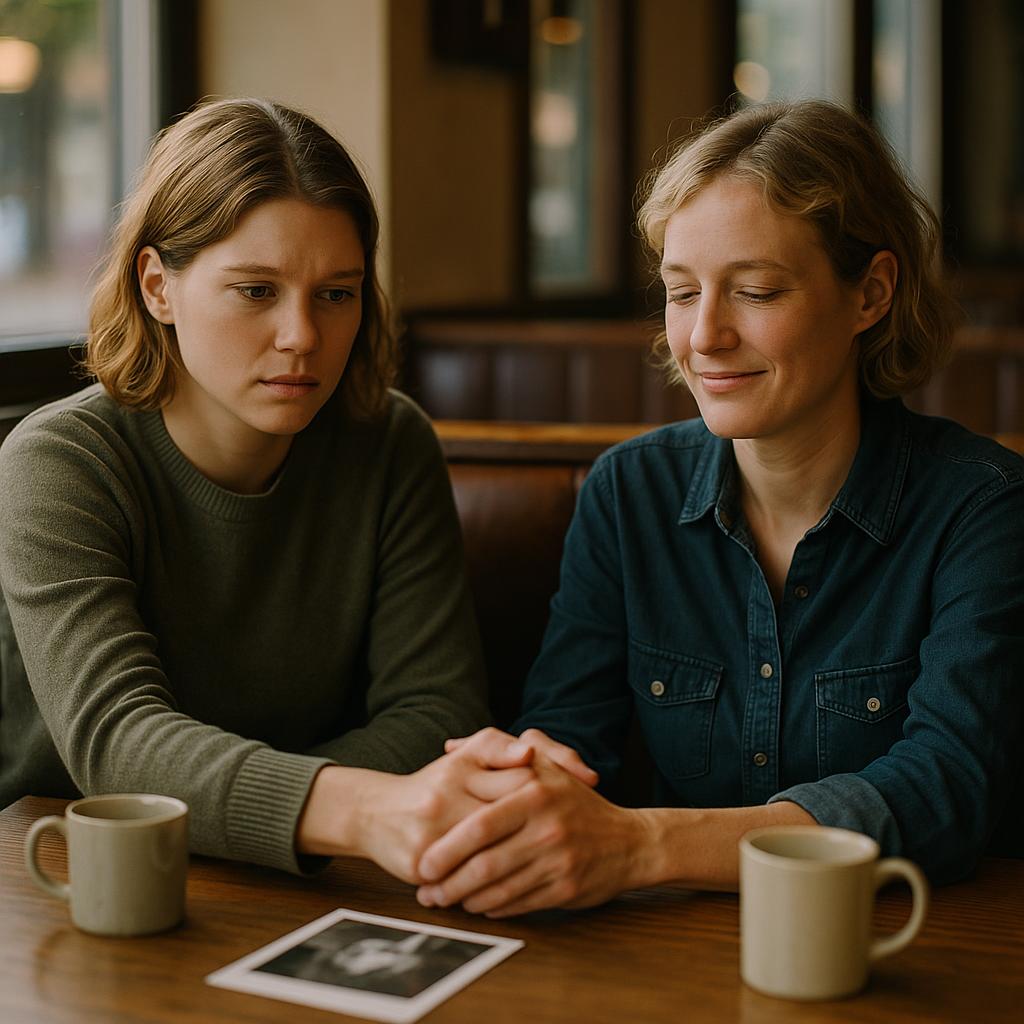 Image by RM AI
Image by RM AI
The Promotion
Monday morning, I walked into the office with a new energy that surprised even me. The Westbrook account proposal was due in two weeks, and instead of my usual anxiety, I felt strangely calm as I organized the international team meeting. 'Suzan, you're taking point on this one,' my boss announced, and I didn't even flinch. Three months ago, I would have panicked at the thought of leading such a high-profile project. But something had shifted. Each late night perfecting spreadsheets, each confident presentation to skeptical executives, each solution I proposed to complex financial problems—they all felt like extensions of the woman who had finally stood up to her family. I found myself speaking up in meetings where I once would have remained silent, challenging ideas that didn't make sense, and owning my expertise without apology. My colleague Marcus noticed it too. 'Whatever happened on your honeymoon changed you,' he commented as we reviewed quarterly projections. 'You're not hiding anymore.' He was right. The promotion to senior management that once seemed impossibly out of reach now felt inevitable—just another step in my emergence from the shadows. What I didn't realize was how quickly news of my professional transformation would travel through family channels, or how Tara would react when she discovered I was no longer playing small.
 Image by RM AI
Image by RM AI
Father's Workshop
Two days after the gallery incident, my father called and asked if I'd come by the house when Mom was at her book club. 'I want to show you something,' he said, his voice unusually hesitant. When I arrived, he led me to the converted garage I'd rarely been allowed to enter growing up. The door swung open to reveal his sanctuary—a woodworking shop filled with the comforting scent of sawdust and the familiar crackle of classic rock radio. 'Led Zeppelin,' I smiled, recognizing the song. Dad's eyes lit up. 'You remember.' He guided me through his world, showing me bookshelves with intricate inlays, cutting boards with geometric patterns, and a half-finished rocking chair. His hands, usually so still and formal at family gatherings, came alive as he demonstrated how he shaped the wood. 'This grain here,' he said, tracing a finger along the chair's arm, 'reminds me of you—strong but flexible.' I watched him work, mesmerized by the patience and attention to detail—qualities I'd always thought came from nowhere. 'I never knew we were so similar,' I admitted. He paused, sandpaper in hand. 'There's a lot you don't know, Suzan,' he said quietly. 'About me. About your mother. About why things are the way they are.' He reached for a small wooden box on his workbench. 'This is for you,' he said, opening it to reveal what looked like old letters. 'It's time you knew the truth.'
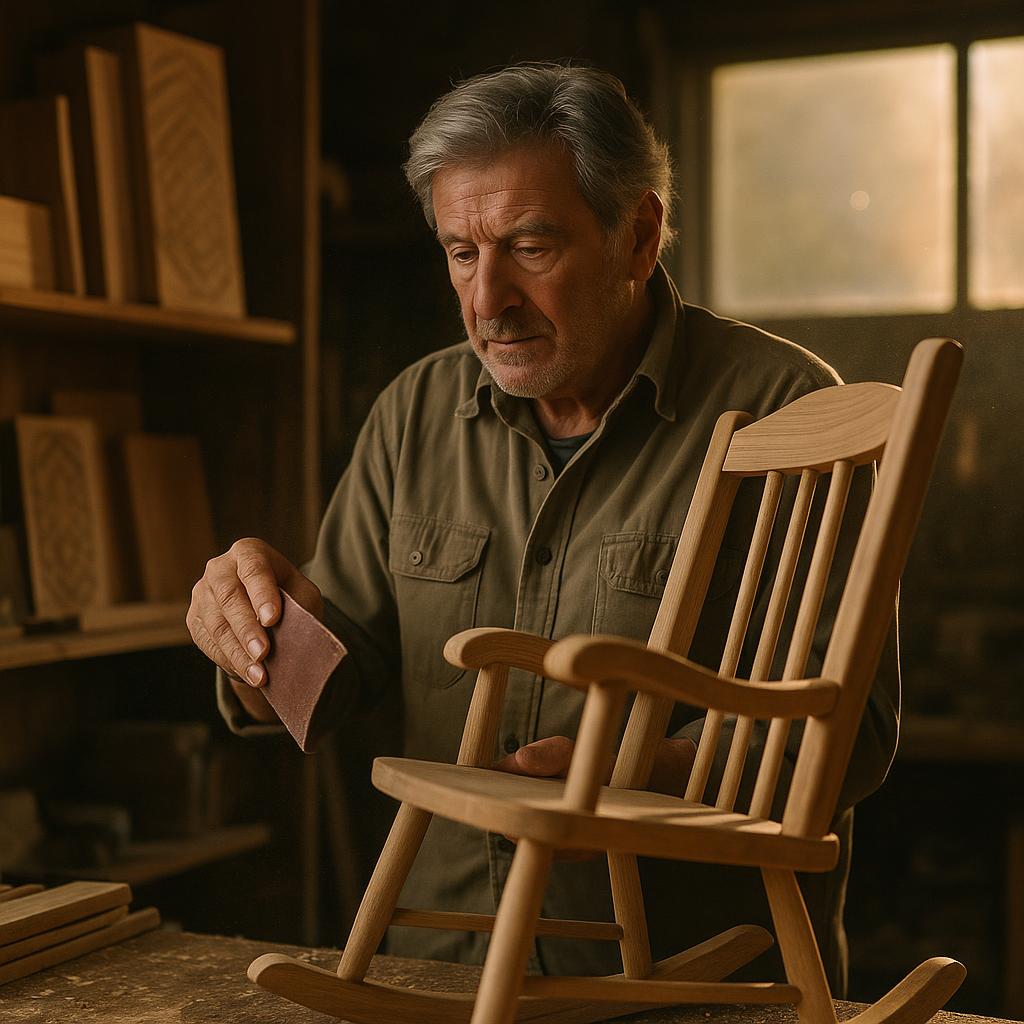 Image by RM AI
Image by RM AI
The Wooden Box
As I turned to leave the workshop, Dad cleared his throat awkwardly. 'Wait, Suzan. I have something else.' He reached beneath his workbench and pulled out a small wooden box that took my breath away. The lid featured intricate inlay work forming my initials—S.M.—in a delicate script I'd never seen him create before. 'Open it,' he urged, his voice uncharacteristically soft. Inside, the box was lined with deep blue velvet, perfectly sized to cradle my grandmother's pearls—the ones I'd worn at my wedding when I walked down the aisle alone. 'How did you know they'd fit?' I asked, running my finger along the smooth interior. Dad shrugged, suddenly finding the floor fascinating. 'I measured them when you weren't looking. Before the wedding.' The implication hit me: he'd planned this gift long before he chose to skip my ceremony. 'I'm making one for Tara too,' he added hastily, 'but I wanted you to have yours first.' In that moment, I saw him clearly—a man trying, in his own clumsy way, to balance scales that had been tipped my entire life. As I clutched the box to my chest, I realized the letters inside might explain why those scales had been so uneven for so long.
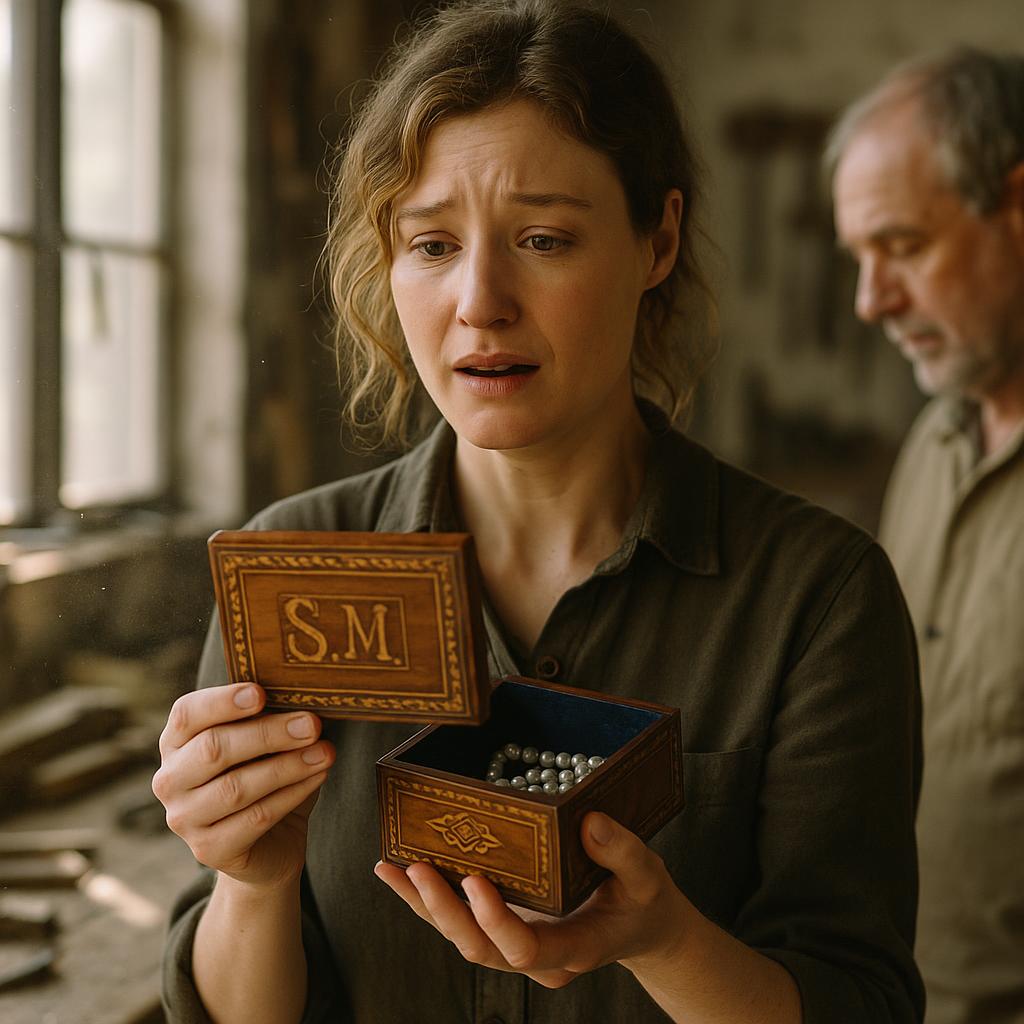 Image by RM AI
Image by RM AI
Mother's Illness
The call came at 8:17 PM on a Tuesday. Dad's voice sounded strange—strained in a way I'd never heard before. 'Your mother has breast cancer,' he said without preamble. The world tilted sideways as he explained it was early-stage, treatments already scheduled, her prognosis 'good.' I sat down hard on my kitchen stool, the wooden box with my initials still sitting on the counter where I'd left it. 'She didn't want to tell you yet,' Dad continued, 'but I thought you should know.' Of course she didn't. My first thought—which I immediately hated myself for—was wondering if Tara already knew. My second thought was even worse: how this illness would reshape our family dynamics yet again. Would I be expected to drop my boundaries, to pretend the wedding never happened, to play the dutiful daughter while Tara performed her 'devoted caretaker' role to perfection? I pressed my fingers against my closed eyes. 'I'll call her tomorrow,' I promised, my voice steadier than I felt. After hanging up, I stared at the photograph of my younger self on the bookshelf. The little girl on the tire swing seemed to ask: How much support can you give without losing yourself again? I didn't have an answer yet, but I knew one thing for certain—this time, whatever I decided to do would be on my terms, not theirs. What I couldn't have anticipated was the text I'd receive from Tara just minutes later, or how it would force me to confront everything at once.
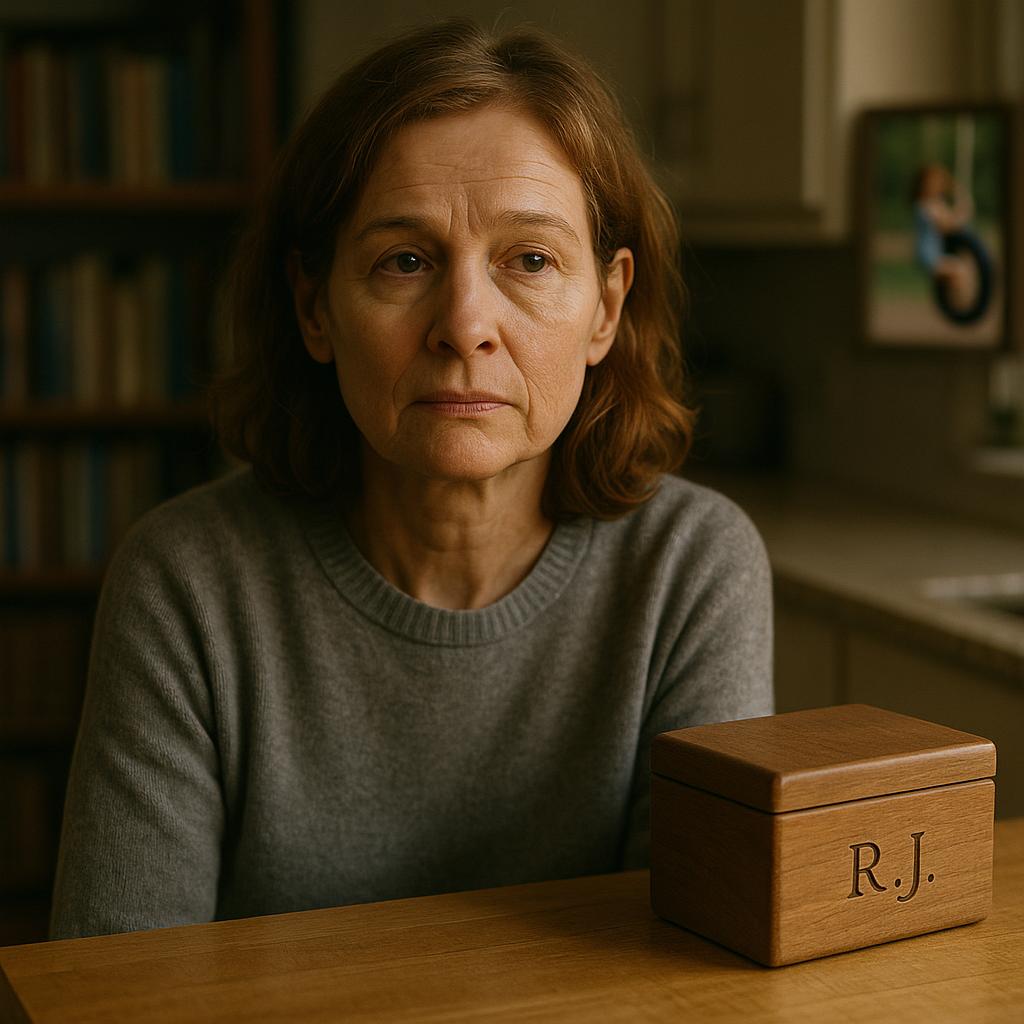 Image by RM AI
Image by RM AI
The Hospital Visit
I clutched the bouquet of yellow daisies—Mom's favorites—as I pushed open the door to room 312. The antiseptic hospital smell hit me immediately, but it wasn't as jarring as the sight of Tara already there, fluffing pillows and chatting with the nurse like she was auditioning for 'Daughter of the Year.' She barely acknowledged me with a tight smile that didn't reach her eyes. Mom looked smaller somehow, propped against the stark white pillows, her skin almost matching the sheets. 'Suzan,' she said, genuine surprise in her voice, 'I didn't expect you to come.' Those words landed like tiny daggers, but I swallowed my hurt and placed the flowers on her bedside table. 'Of course I came,' I replied, keeping my voice steady. For the next hour, I sat in the uncomfortable visitor's chair, making conversation about the weather, her doctors, and the hospital food—anything to avoid the elephant in the room. Tara hovered constantly, adjusting Mom's blankets and checking her water, shooting me territorial glances whenever I offered to help. Even here, in this sterile room with mortality hanging in the air, the family hierarchy remained firmly intact. When Mom dozed off mid-sentence, Tara leaned toward me and whispered something that made me realize this illness might be the very thing that finally forced us all to confront the truth.
 Image by RM AI
Image by RM AI
The Waiting Room
The waiting room was a purgatory of uncomfortable chairs and outdated magazines. Dad appeared with two cups of coffee so bad they could probably strip paint, setting one in front of me without a word. His shoulders slumped forward as he sank into the chair beside me, the weight of Mom's illness etched into the new lines on his face. We sat in silence for what felt like forever, the institutional clock on the wall ticking away seconds that stretched into minutes. 'Your mother is...' he started, then sighed deeply, 'being difficult with everyone.' He described how she'd snapped at the oncologist yesterday, refused the nurse's help with basic tasks, and insisted on reviewing work emails during her chemo. I nodded, recognizing the pattern immediately. Mom had always been allergic to vulnerability, maintaining our family's perfect image like it was her full-time job. Growing up, I'd watched her apply makeup before answering the door to delivery people, host dinner parties the day after migraines that had her vomiting for hours, and smile through parent-teacher conferences while battling pneumonia. 'She can't stand not being in control,' I said softly. Dad's eyes met mine with a flash of surprise—and something else. Recognition. For the first time, I wondered if he'd been as trapped in her carefully constructed reality as I had been.
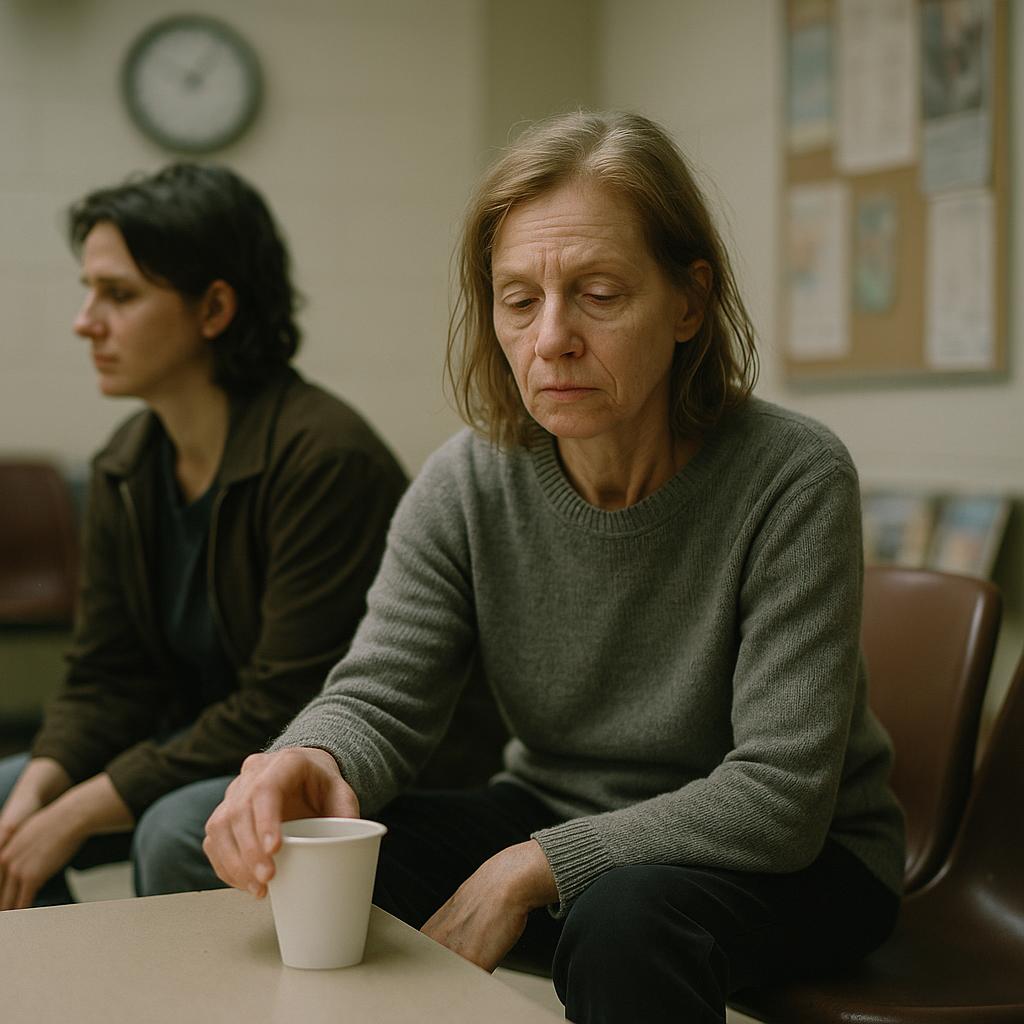 Image by RM AI
Image by RM AI
Tara's Accusation
I was halfway to my car when I heard Tara's heels clicking rapidly behind me on the hospital parking lot pavement. 'So that's it? You show up for what, an hour? Just long enough to be seen?' Her voice cut through the evening air, sharp as a scalpel. I turned to face her, keys dangling from my fingers. Her perfect makeup couldn't hide the dark circles under her eyes, but her accusatory glare was as familiar as my own reflection. 'Some of us are actually handling the real caregiving, Suzan,' she continued, crossing her arms. I took a deep breath, feeling strangely calm. 'I'm helping in ways that respect Mom's boundaries and my own,' I explained. 'The meal train, the insurance paperwork, coordinating with her work.' Tara scoffed, rolling her eyes dramatically. 'God, you're still playing the victim, aren't you? Always on the outside looking in.' Something about her desperation to maintain her golden child status struck me as almost sad. This role that had defined her—defined us both—for decades must feel as much like a prison as a privilege. Instead of firing back, I simply got into my car. As I drove away, I glanced in my rearview mirror to see her still standing there, looking smaller somehow. What I didn't realize then was that Mom had witnessed our entire exchange from her hospital window.
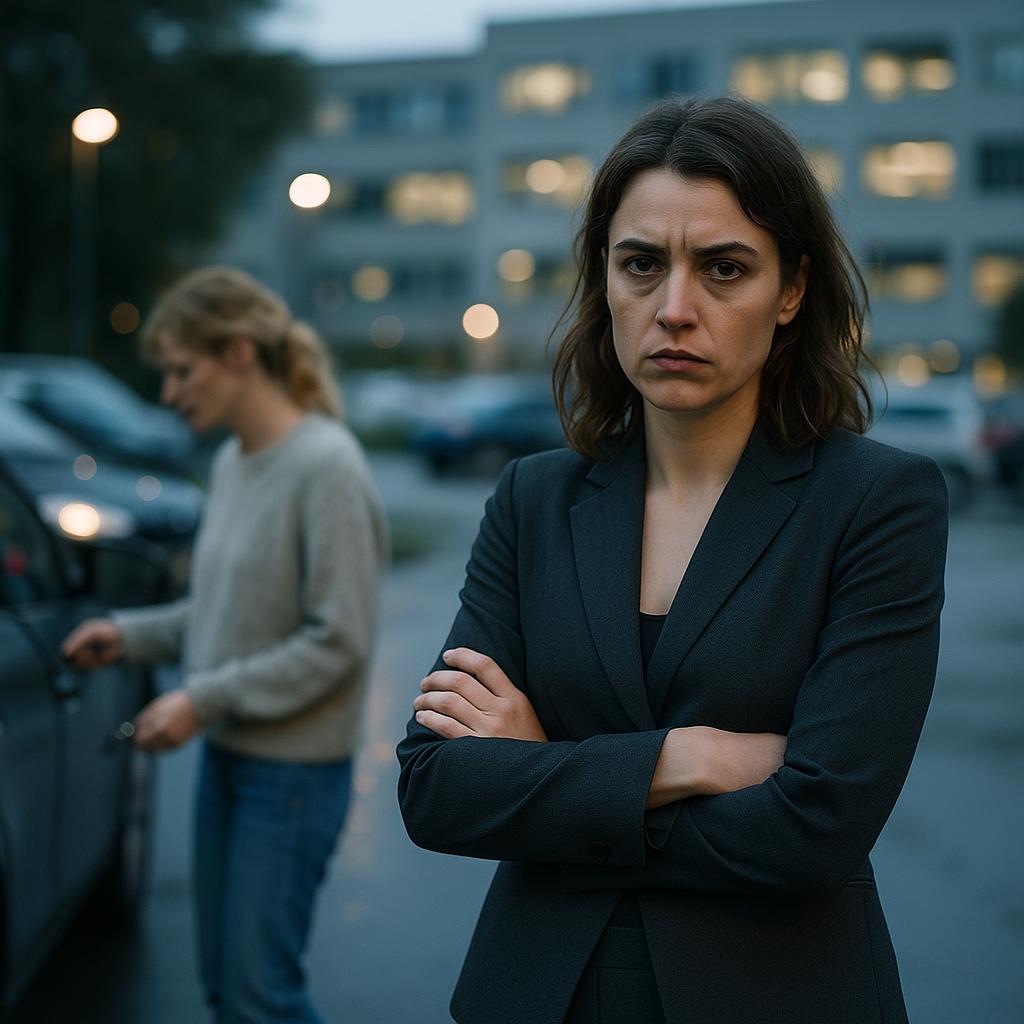 Image by RM AI
Image by RM AI
The Promotion News
The email arrived while I was sitting in the hospital cafeteria, picking at a sad-looking salad between visits to Mom's room. 'Congratulations on your promotion to Senior Management,' it read. I stared at my phone, a surreal bubble of joy expanding in my chest despite the antiseptic surroundings. That night, David transformed our dining room with candles and my favorite takeout from Marcello's. 'To the newest boss lady,' Linsey declared, raising her wine glass as Robert whooped loudly. Their genuine excitement wrapped around me like a warm blanket. The contrast became painfully clear the next day when I mentioned it during a family call. Dad offered an awkward but sincere 'That's wonderful, kiddo,' while Mom barely looked up from her hospital bed, murmuring 'That's nice, dear' before asking if I'd brought her crossword book. Tara, predictably, let me finish my sentence before launching into a fifteen-minute monologue about being approached for a prestigious art installation. As I listened to her dominate the conversation yet again, I realized something profound—my worth wasn't determined by their validation anymore. What I couldn't have anticipated was how this promotion would soon force me to make a decision that would permanently alter my relationship with my family.
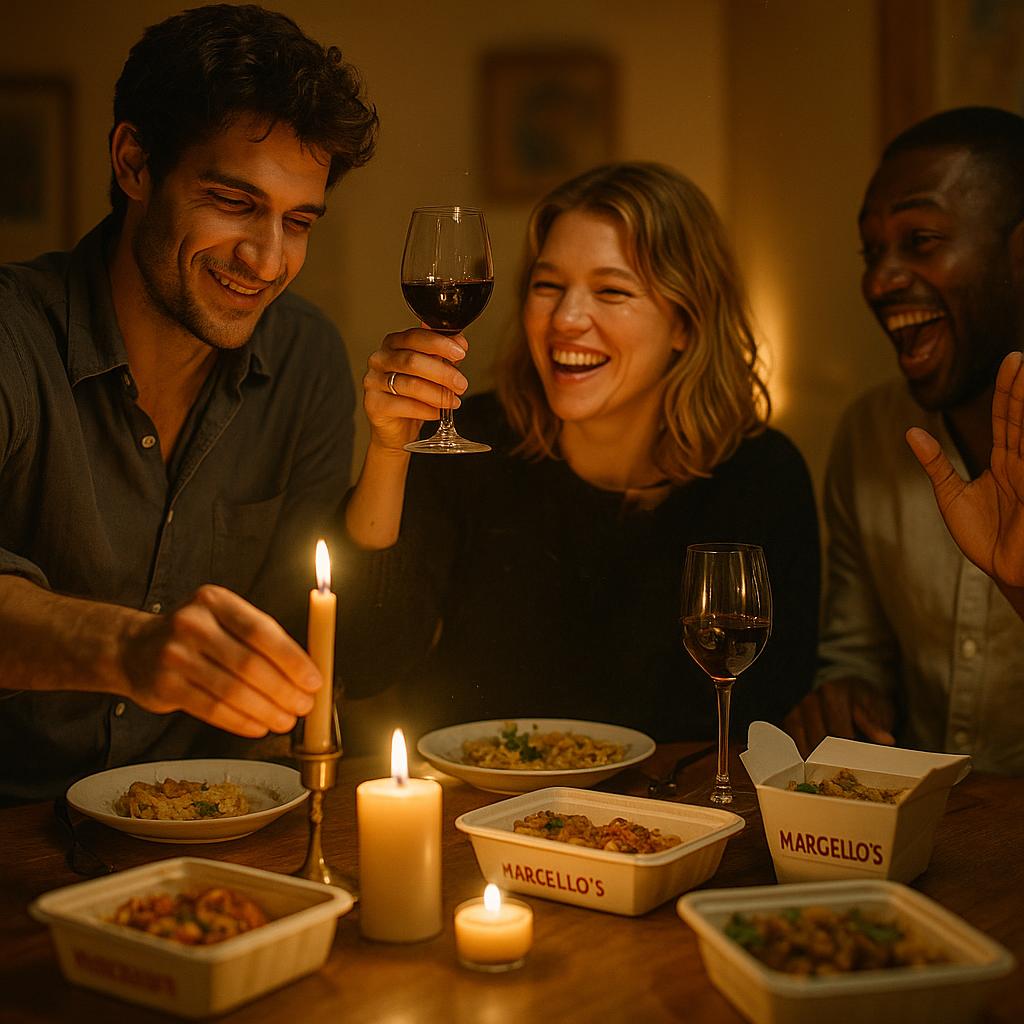 Image by RM AI
Image by RM AI
Mother's Request
Mom's room was brighter today, sunlight streaming through half-drawn blinds as her color slowly returned. 'Suzan, could you help me with something?' she asked, gesturing toward a cardboard box the nurse had brought in. 'I want to sort through these old photos for a project.' I nodded, pulling my chair closer as she opened the box. For the next hour, we sat shoulder to shoulder, flipping through decades of frozen moments. I couldn't help but notice a pattern—me standing at the edge of Christmas gatherings while Tara opened presents center-frame, my half-face peeking from behind Dad at Tara's dance recitals, my eighth birthday where the camera focused on Tara blowing out my candles. Mom's fingers lingered on one particularly telling image—my high school graduation, where I stood alone while the rest of the family clustered around Tara in her new prom dress. Something shifted in Mom's expression, a flicker of recognition I'd never seen before. She didn't say anything, but her hand trembled slightly as she set the photo aside in a separate pile. 'I never realized...' she whispered, then stopped herself. The silence between us felt different somehow—less like a wall and more like a bridge under construction. What I couldn't have anticipated was the yellowed envelope she would pull from the bottom of the box next, or how its contents would explain everything.
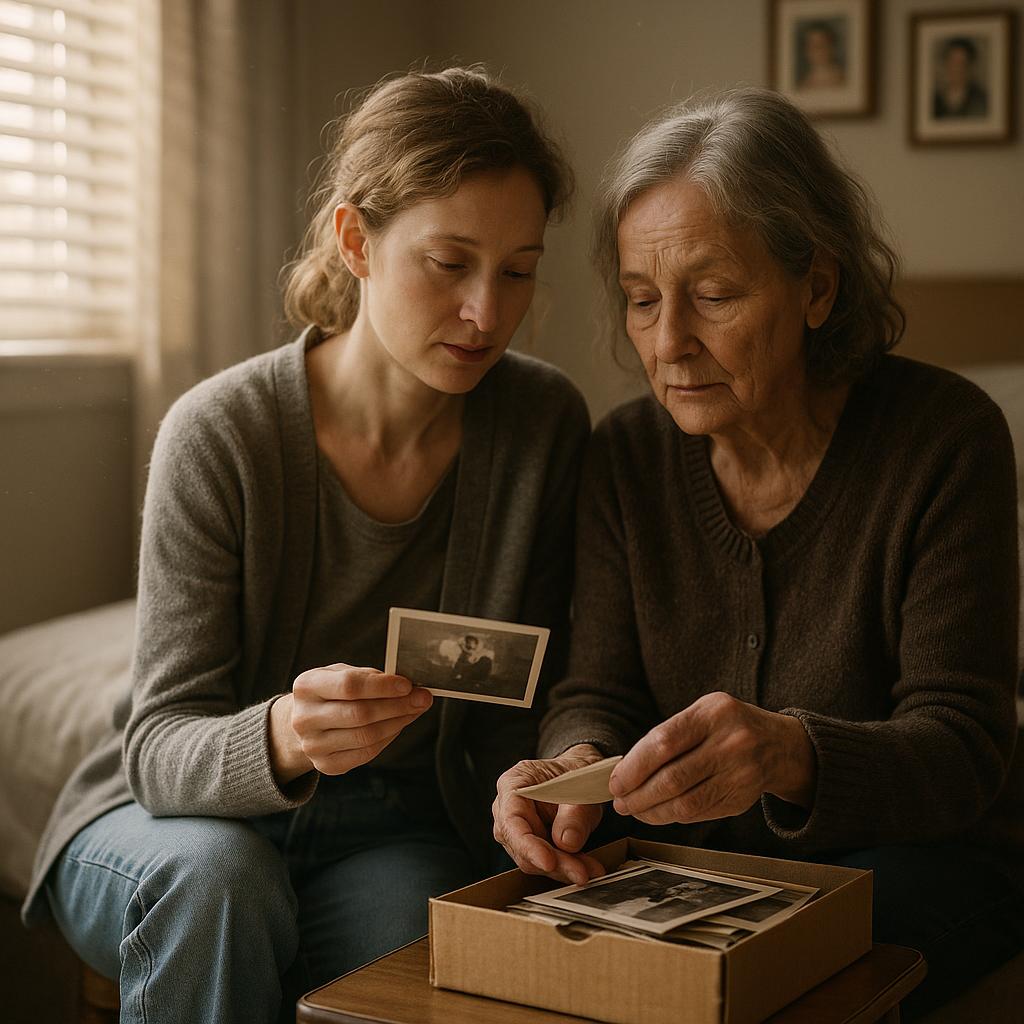 Image by RM AI
Image by RM AI
The Missing Album
As Mom and I continued sorting through the photos, I noticed a leather-bound album tucked at the bottom of the box. 'What's this?' I asked, pulling it out. Mom's face flushed as I opened it, revealing page after page of just... me. There I was playing violin at my fifth-grade recital—a performance I thought no one had attended. Another showed me painting in the backyard, sunlight catching my concentrated expression. Each photo was meticulously labeled in Mom's neat handwriting: 'Suzan's science fair project, 1998,' 'Suzan reading under the oak tree, summer 2000.' My throat tightened. 'I don't understand,' I whispered. 'You were there?' Mom's fingers trembled as she traced the edge of a photo. 'I was always there, Suzan. Just... not always when you could see me.' She explained in halting words how she'd kept this album hidden because 'Tara would have destroyed it out of jealousy.' The revelation hit me like a physical blow—my mother had documented my life in secret while publicly celebrating Tara's. I didn't know whether to feel comforted that she'd noticed me or devastated that her love had to be hidden away like some shameful secret. What kind of twisted family dynamic had we been living in all these years?
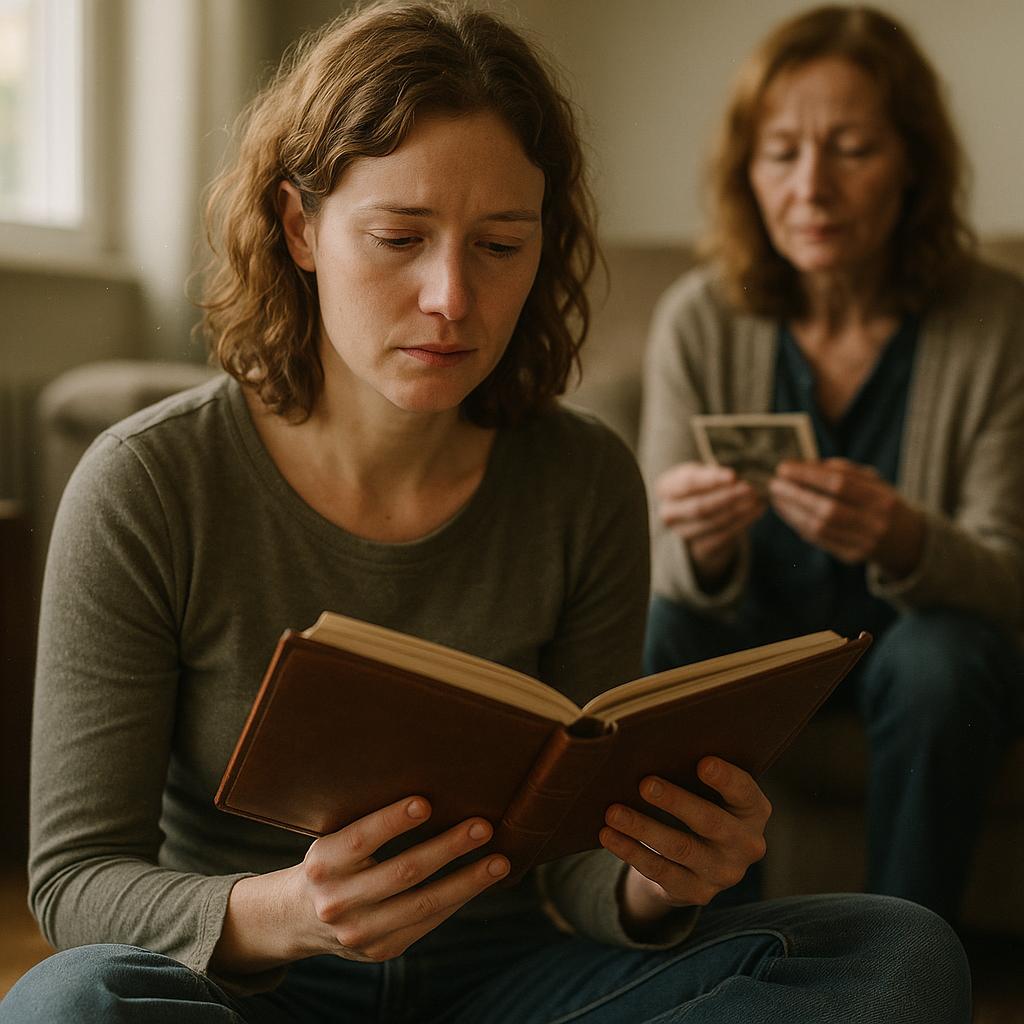 Image by RM AI
Image by RM AI
Almost an Apology
Mom invited me for tea in her garden last Tuesday. It was the first time we'd been alone together since her health started improving. I found her sitting primly on her favorite wrought-iron chair, surrounded by her meticulously tended roses—a setting that had always felt more like a stage than a place of comfort. 'The hydrangeas are lovely this year,' I commented, filling the awkward silence. She nodded, pouring tea with hands that no longer trembled. 'Suzan,' she began, her voice softer than usual, 'I've been thinking about those photos we found.' She set her cup down carefully. 'Perhaps I didn't always... see you clearly.' Her eyes met mine briefly before darting away. 'You remind me so much of myself before I married your father. Independent. Ambitious.' She smoothed her napkin. 'I admired those qualities in you, but they also... frightened me.' It wasn't the full apology I'd spent decades waiting for, but coming from a woman who'd built her entire identity around never showing weakness, it felt monumental. As butterflies danced between her prized dahlias, I realized this garden confession was probably the most vulnerability my mother was capable of showing. What I couldn't have known then was how this almost-apology would be tested when the international promotion landed in my inbox the very next morning.
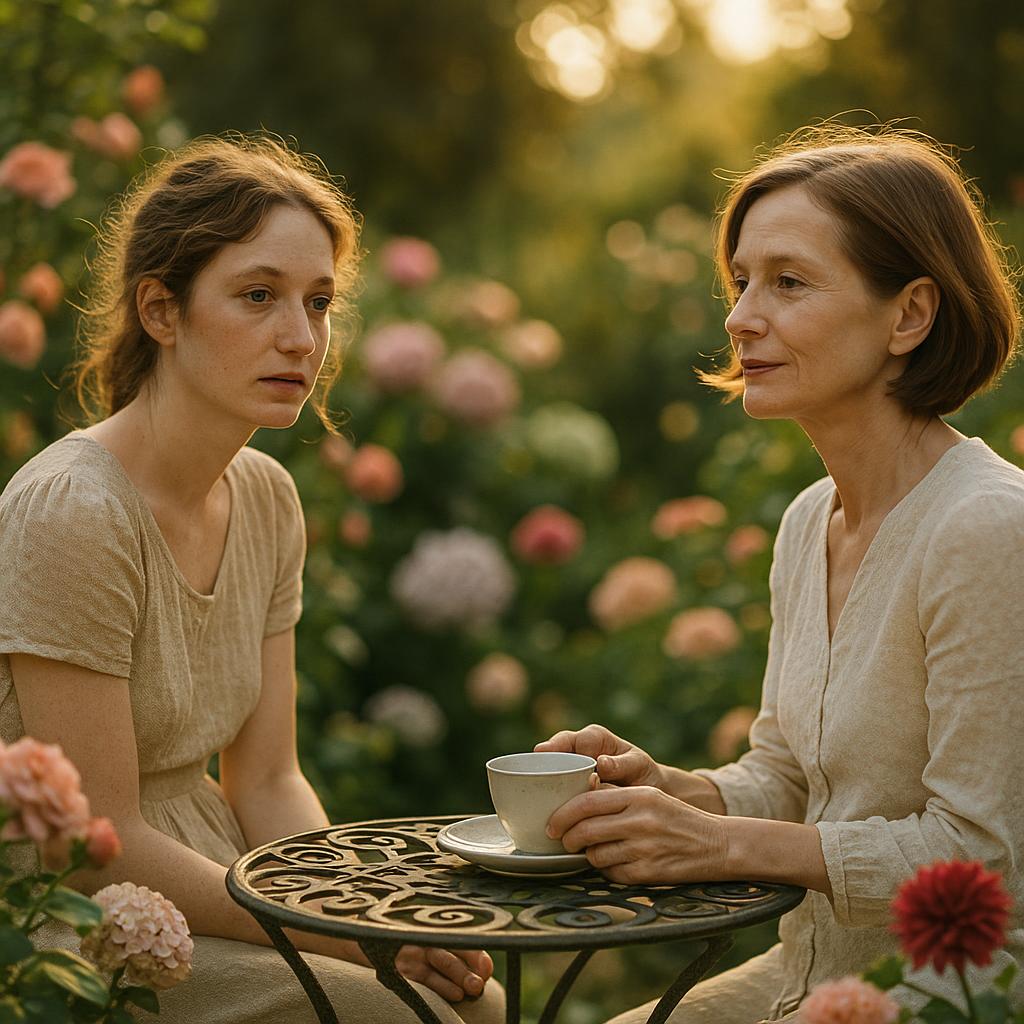 Image by RM AI
Image by RM AI
Tara's Crisis
The doorbell rang at 11:47 PM. I opened it to find Tara—perfect, golden Tara—standing there with mascara streaking down her cheeks and her designer purse clutched like a life preserver. "Everything's falling apart," she choked out before collapsing into my arms. David, bless him, quietly made tea and disappeared into our bedroom while I guided my sister to the couch. Between sobs, the truth spilled out: her gallery showing had flopped spectacularly, her boyfriend had left her for a yoga instructor, and for the first time in her life, our parents' endless praise couldn't fix anything. "I don't know who I am without everyone telling me I'm amazing," she whispered, looking smaller than I'd ever seen her. As I handed her tissues and listened, something shifted inside me. The pedestal our parents had built beneath her hadn't been a gift—it had been a cage, one that left her terrified of failure and incapable of handling it when it inevitably came. "You're still Tara," I said softly, "with or without the spotlight." Years of hurt didn't magically vanish in that moment, but as I chose compassion over resentment, I realized I wasn't just helping her—I was finally freeing myself. What neither of us could have predicted was how this midnight confession would completely transform our relationship when Mom's condition suddenly worsened the very next day.
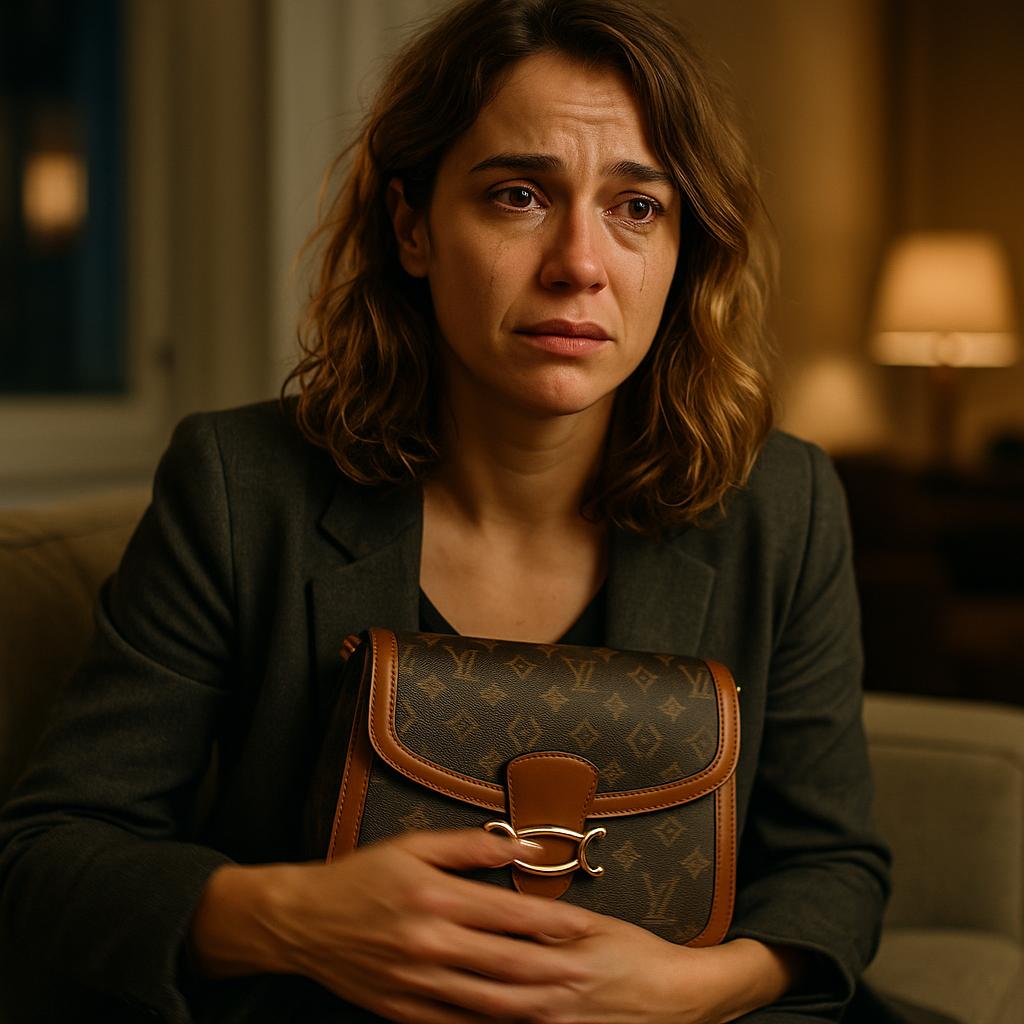 Image by RM AI
Image by RM AI
Sister Conversation
The sunrise painted my balcony in soft pinks and golds as Tara and I sat in silence, nursing our coffees after her emotional breakdown. 'Remember that trip to Lake Michigan?' she asked suddenly. 'Dad bought me that ridiculous inflatable swan.' I nodded, the memory sharp in my mind—not because of her swan, but because I'd spent that vacation taking photos of everyone else having fun while nursing a sunburn no one noticed. 'You know what's weird?' Tara continued, her voice smaller than I'd ever heard it. 'I always thought you had it easier. You didn't have to be perfect all the time.' I nearly choked on my coffee. 'Are you serious? You were the golden child!' For the first time ever, we actually listened to each other—her describing the crushing pressure of being the family star, me explaining the invisibility of being the family afterthought. We didn't solve decades of hurt in one sunrise conversation, but something shifted between us. 'We were both just kids,' I said finally. 'Kids who needed different things.' Tara reached over and squeezed my hand, her eyes still puffy from last night's tears. What neither of us realized was that Mom had been watching us from the guest bedroom window, and the letter she would slip under my door later that day would change everything I thought I knew about our family.
 Image by RM AI
Image by RM AI
One Year Later
I stood in our dining room, watching the golden hour light spill across the table my father had crafted with his own hands. One year. It felt both impossibly long and surprisingly brief since I'd walked down that aisle alone. Now here we were—David squeezing my hand under the table, Linsey and Robert arguing playfully about the best 90s sitcom, my father pouring wine with careful precision. Mom, her hair finally growing back after chemo, actually asked about my recent project at work before Tara could mention her gallery. And Tara—the sister who once consumed all the oxygen in every room—sat beside her new boyfriend, occasionally catching my eye with a small smile that acknowledged our fragile new understanding. When she complimented my homemade bread without turning it into a story about herself, I nearly dropped my fork in shock. Don't get me wrong—the evening wasn't perfect. Mom still flinched when I mentioned my potential transfer overseas, and Dad still laughed a bit too loudly at Tara's jokes. But as I looked around at these imperfect people trying their imperfect best, I realized that healing doesn't erase scars—it just helps you carry them more comfortably. What surprised me most wasn't how much had changed in a year, but what I discovered later that night when I found the small envelope David had hidden beneath my pillow.
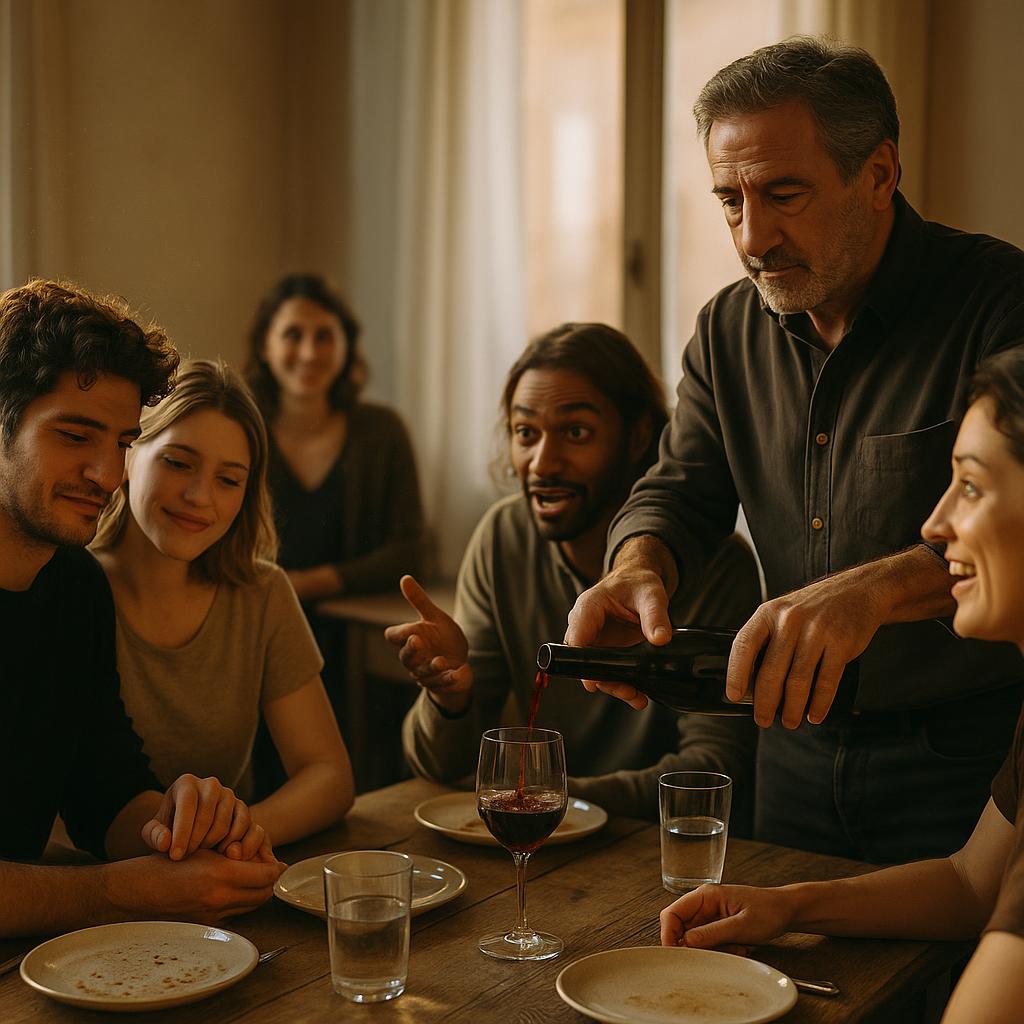 Image by RM AI
Image by RM AI
Stepping Into Light
The night air wrapped around me like a gentle hug as I stood on our back porch, counting stars and sipping the last of my wine. One year. It felt surreal to think about how far I'd come since walking down that aisle alone, my heart cracking with each step. David's footsteps approached from behind, two fresh glasses of merlot in hand. 'Penny for your thoughts?' he asked, his shoulder brushing mine as he leaned against the railing. I smiled, accepting the glass. 'Just thinking about how different everything feels now.' And it did. The constant need for my parents' approval had faded like an old photograph left too long in the sun. Even Tara's presence in my life had transformed from a shadow that swallowed me whole to something more like... a sister. 'Do you think we'll be good parents someday?' I asked suddenly, surprising myself with the question. David's eyes crinkled at the corners. 'You already know how to love someone without trying to fix or change them. That's more than most people ever learn.' His words settled over me like a warm blanket. Standing there under the vast night sky, I realized I wasn't afraid anymore—not of repeating my parents' mistakes, not of living in Tara's shadow, not even of the overseas transfer I'd finally accepted. For the first time in my life, I was fully, completely free. What I couldn't have known then was how the small velvet box David had been nervously fingering in his pocket would change everything all over again.
 Image by RM AI
Image by RM AI
KEEP ON READING

How Shakespeare Invented The World’s First “Your Mom” Joke
Who invented “yo mama” jokes? It’s not the kind of…
By Maria Cruz Nov 12, 2025
20 Longest Journeys Ever Undertaken on Foot
From Horizon to Horizon. There’s something almost mythic about walking…
By Cameron Dick Nov 12, 2025
20 Weird Origins Of Everyday Words
Switching The Meaning. You don’t always need to understand a…
By Breanna Schnurr Nov 12, 2025
20 Longest Championship Droughts in Sport History
Will the Guardians Ever Win a Championship?. Being a sports…
By Rob Shapiro Nov 12, 2025
Laughter Isn’t The Best Medicine. How Hysteria Took Over A…
OurWhisky Foundation on UnsplashOn January 30th, 1962, an all-girls boarding…
By Breanna Schnurr Nov 11, 2025
When Robert Gould Shaw Fell in Battle, No One Retrieved…
Whipple Studio, 1847 - 1873 on WikimediaColonel Robert Gould Shaw…
By Cameron Dick Nov 11, 2025
